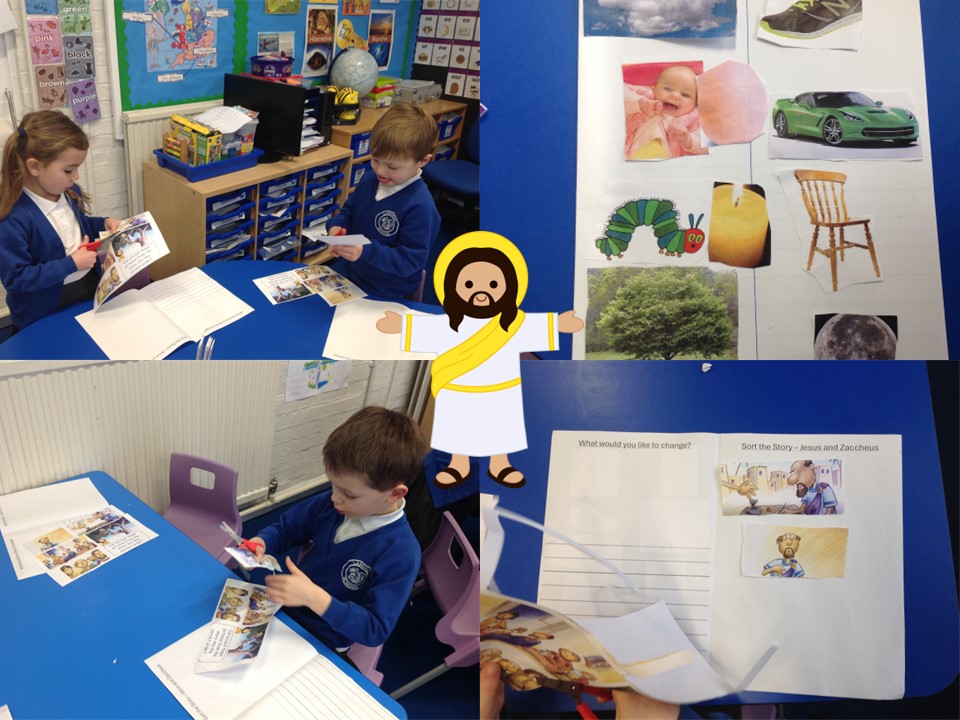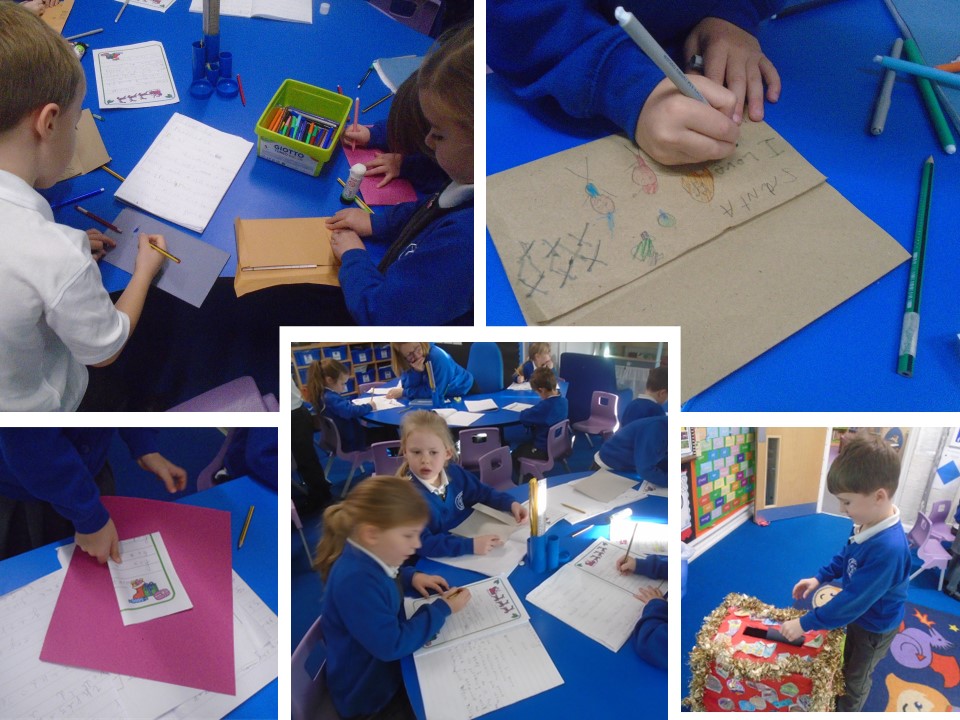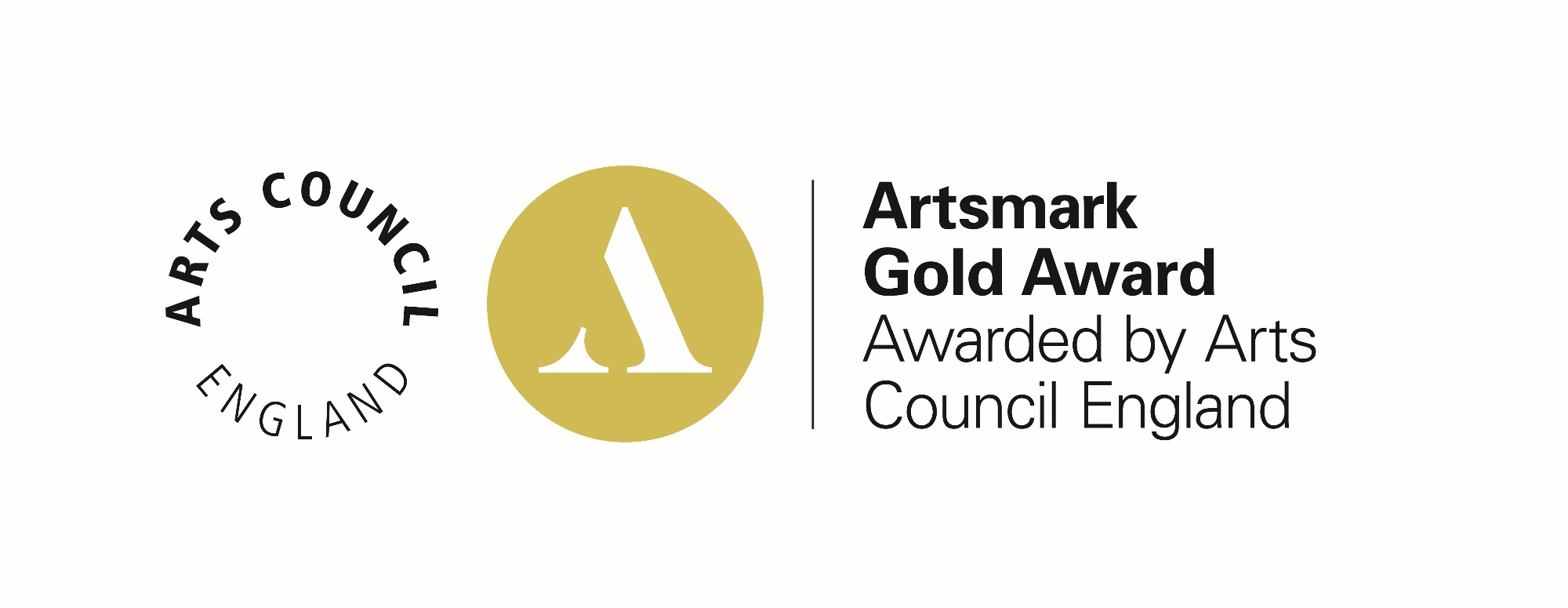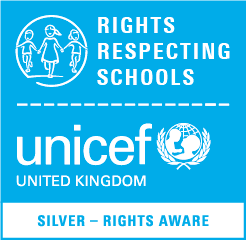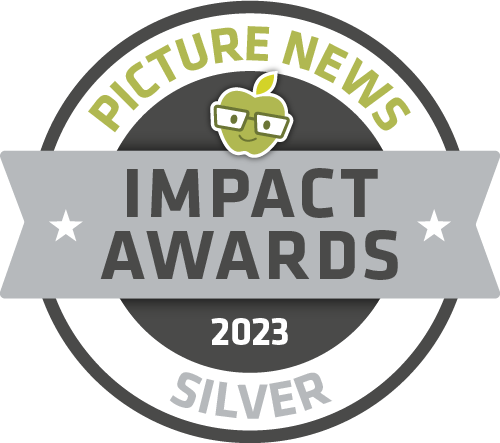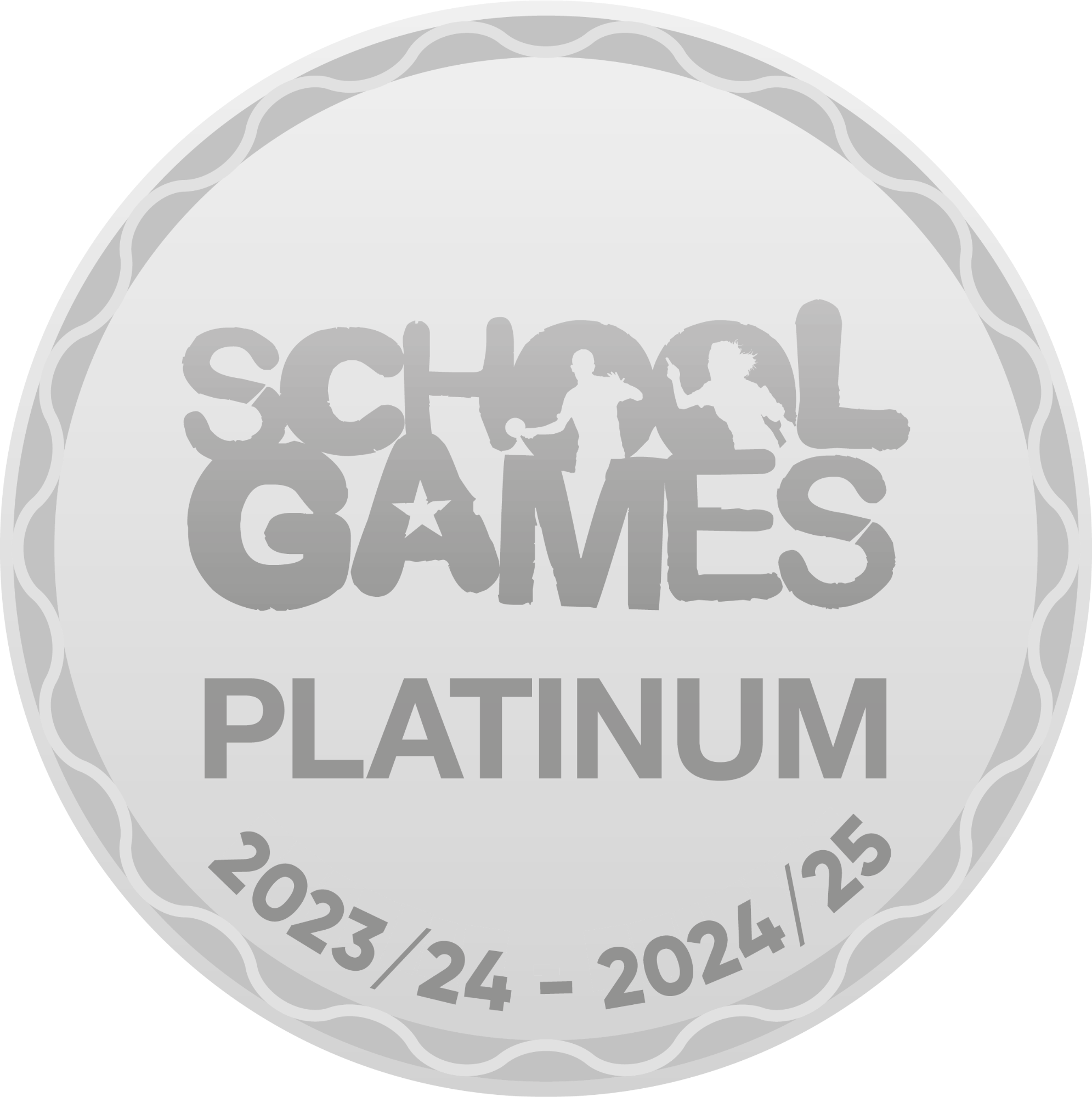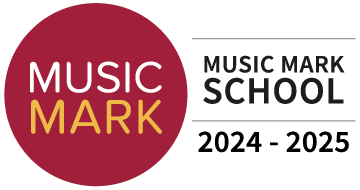Year 1 Butterflies
Year 1 - Butterfly Class - Mr Hancox and Mrs Slusarczyk
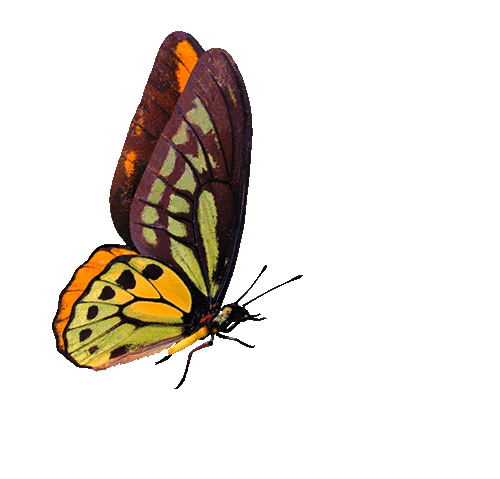
Friday 11th July 2025
P.E. Days:
P.E. days will still be Monday and Thursday this term; can children please come in wearing their P.E. kits on these days. Long hair must be tied up and any watches, earrings or other jewellery removed. Children should have shorts for P.E. sessions; for safety reasons, only children wearing shorts can be allowed to use the P.E. apparatus. Children should also wear a hoodie and jogging bottoms in case of cooler weather.
Home Learning
English: Make time to read with your child for approximately 5-10 minutes every day. Children are encouraged to change their reading books regularly, however you can find extra reading material on the Oxford Owl website. Our Library Day is every Tuesday, so children can also bring their library books back and exchange them for new ones then.
You don't need to record each daily reading session in your child's Reading Diary, but do make an entry at least two or three times a week; whenever they finish a book; or just to say that they enjoyed a particular story you've shared.
The Reading Diary also contains lists of our Phonics sounds, along with Learning Tools to compliment your child's reading, and get them thinking, talking and sharing their opinions about the books they've read.
At the front of the Reading Diary is a list of Non-Negotiables for Year 1 - these are learning targets we are hoping to achieve by the end of the year. From time to time, specific targets will be selected that you can focus on at home, so please check the Non-Negotiables list for any notes or annotations that will help to focus your home learning.
Phonics: Following the Smart Kids: The Code Phonics scheme, this week we've been looking at alternative pronunciations or (fork), including oor (door), oar (roar), a (water), our (four) and augh (caught). We also looked at when 'ere' makes an 'air' sound (there) and when 'sc' makes 's' (science). Look out for words containing these sounds in your daily reading and when you're out and about. The Phonics Play website has some excellent free resources and games for extra practise, and there are some "Alien" word flashcards attached to the bottom of this page. We also sing along to the Alphabet Song on the Super Movers website.
Handwriting: We're teaching the children cursive letter formation, using the Teach Handwriting scheme of work. The website, which includes animations featuring correct letter formation along with worksheets, can be accessed by clicking here.
Maths: (20-30 minutes per week) Following the White Rose Maths scheme, we've just finished looking at Money. Can your child recognise the coins and notes we use in the UK? Can they add coins together, or even work out what change they might get from a purchase? Why not try this interactive maths game for extra practise?
Number recognition is also important in Year 1, and the children frequently struggle to recognise the tricky teen numbers between 10 and 20. I've attached some number recognition flashcards to the bottom of this page if you'd like to practise at home. The 'Out and About' cards on our maths page also have some great ideas for exploring numbers in everyday situations.
Science: This term we've been learning all about plants. What plants and trees do you have near you? How many can your child name? Are they garden plants or wild plants? Do you have any fruits or vegetables growing in your garden? What do you do to look after the plants in your house and garden?
This Week's Story Time Selection
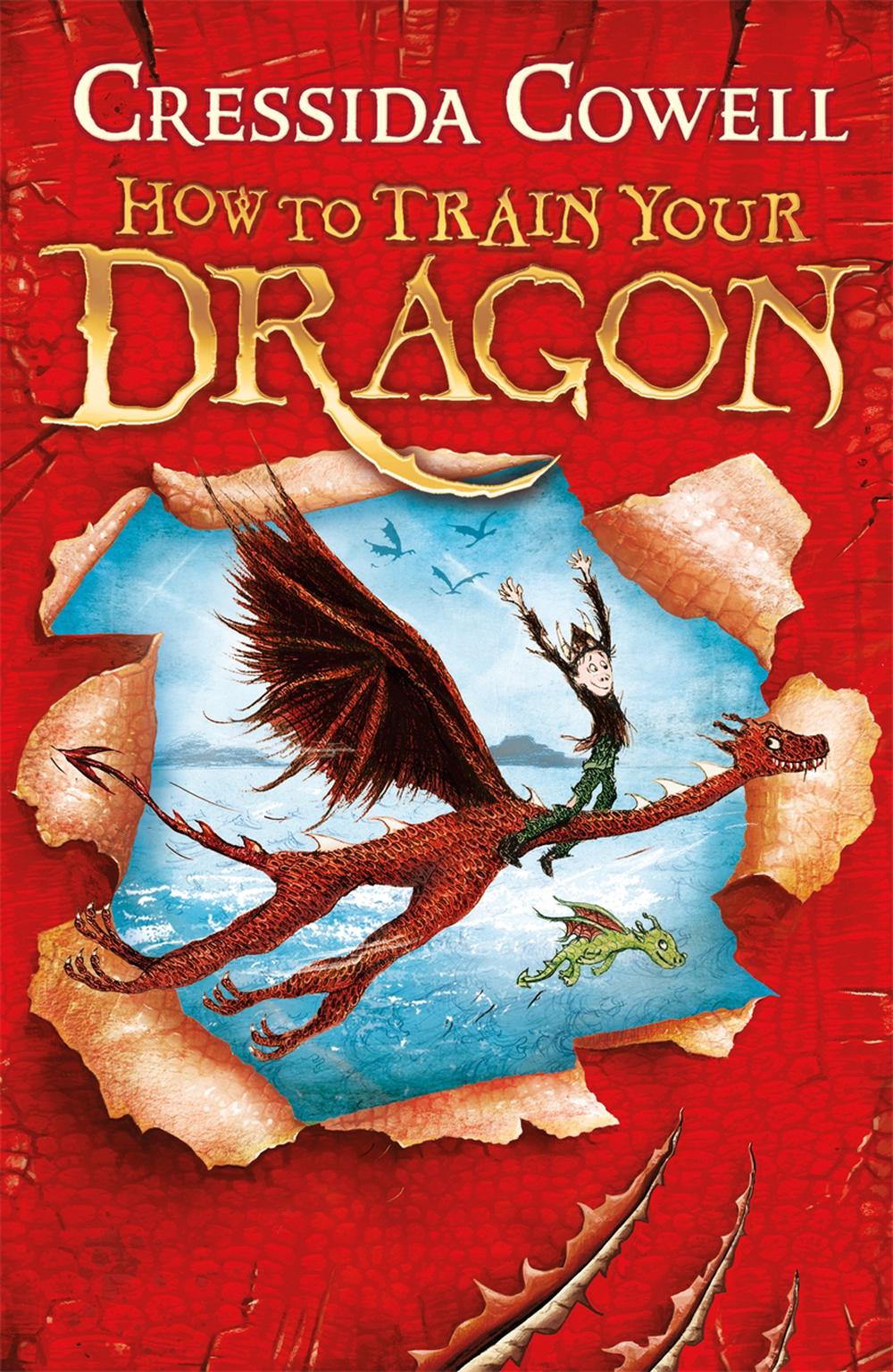 We read a range of books in our daily story time. This week, we started our first chapter book: 'How to Train Your Dragon' by Cressida Cowell.
We read a range of books in our daily story time. This week, we started our first chapter book: 'How to Train Your Dragon' by Cressida Cowell.
It tells the story of how Hiccup Horrendous Haddock the Third learns how to become a Viking hero "the hard way".
Ask your child about the story. What's happened so far and what do they think will happen next? The 'How to Train Your Dragon' manual within the story is not very useful; perhaps they could write their own version with some top tips on looking after their reptilian room-mates. What do they think would be the best thing about owning their own dragon?
This Week's Primary Picture News
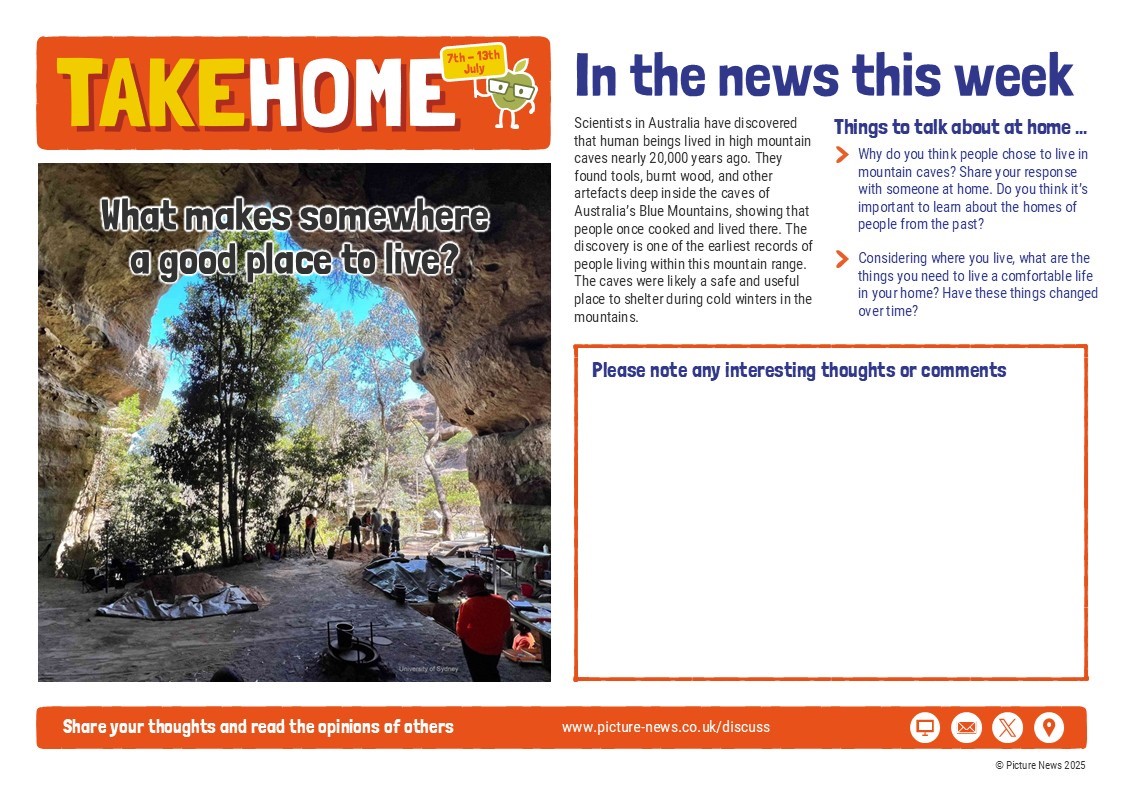
Primary Picture News is a child-friendly and age-appropriate look at fascinating events that are going on in the wider world. This week, the children heard all about historical cave dwellers in Australia. Ask your child about the story using some of the sentence starters above.
A Taste of Our Learning
Week 38 - Marvellous Mae, counting cash and the Summer Reading Challenge
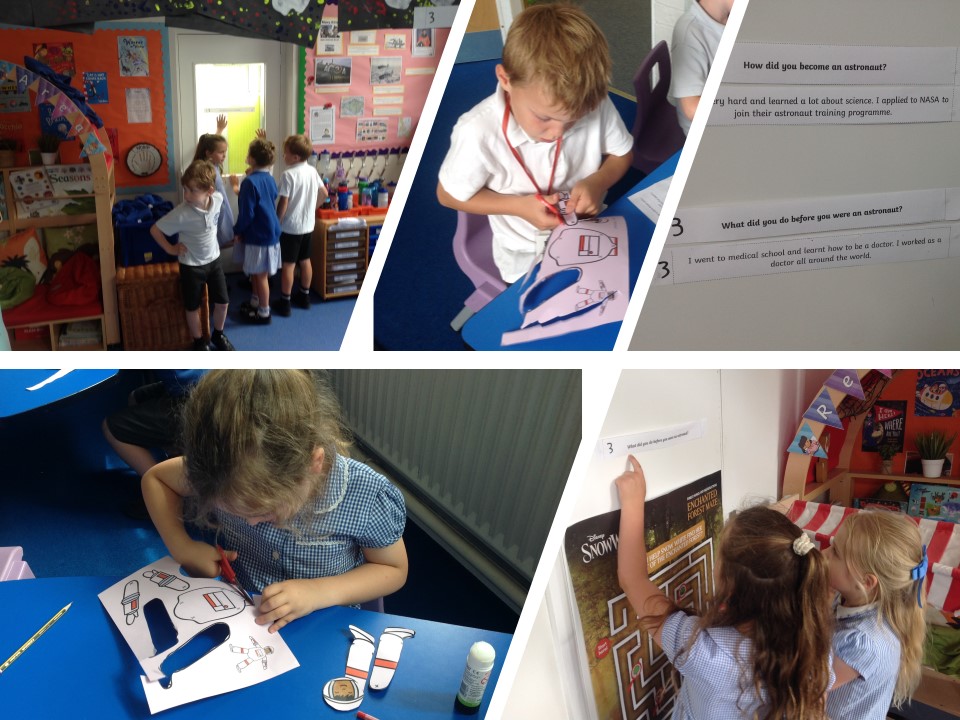
In History, we've been learning all about the American astronaut Mae Jemison.
The first black woman to go into space, this week we looked at how Mae was a trailblazer who fought against the opinions of the time to follow her dream of joining NASA and going into space. Having listened to her story and answered questions about her life and achievements, the children then watched a video of Mae herself answering questions about what it's like in space.
What can your child tell you about Mae Jemison? Do they remember the name of the NASA space shuttle Mae travelled into space on in 1992?
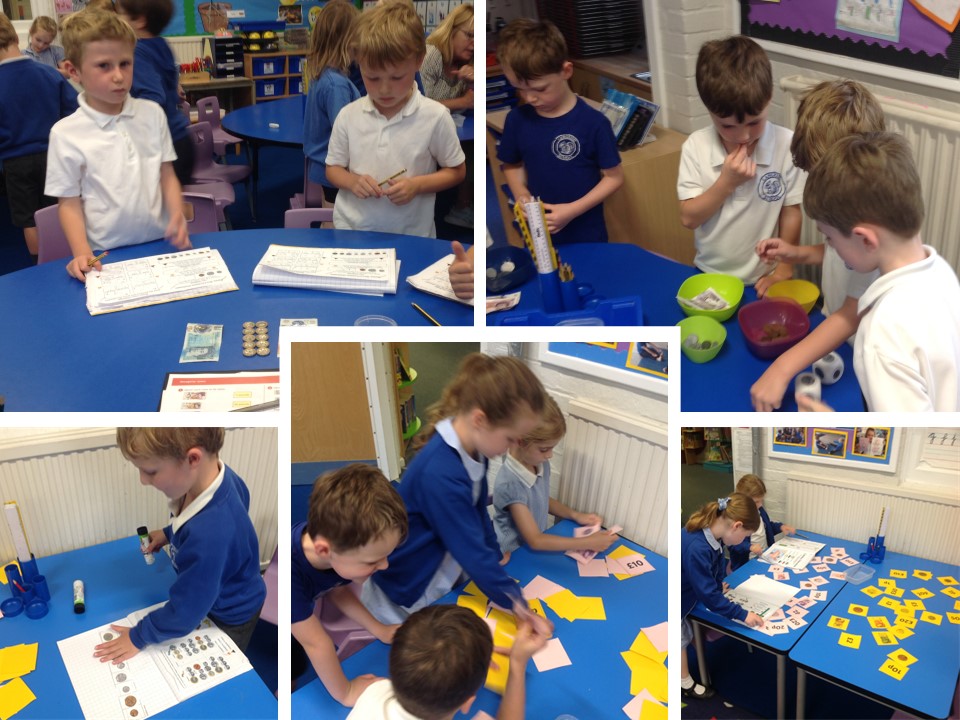 In Maths, we've been learning all about money. We began by looking at all the different coins and notes that we use in the UK, discussing what they look like and what they're all worth. We then had some practical challenges, including a bit of shopping, sorting coins and notes into value order, and working out how many ways there are to make 13 pence.
In Maths, we've been learning all about money. We began by looking at all the different coins and notes that we use in the UK, discussing what they look like and what they're all worth. We then had some practical challenges, including a bit of shopping, sorting coins and notes into value order, and working out how many ways there are to make 13 pence.
With cash becoming less and less prevalent in everyday life, it was nice for the children to get their hands on some real money and work out how they can make different amounts.
Can your child recognise the value of any coins or notes you have in the house?
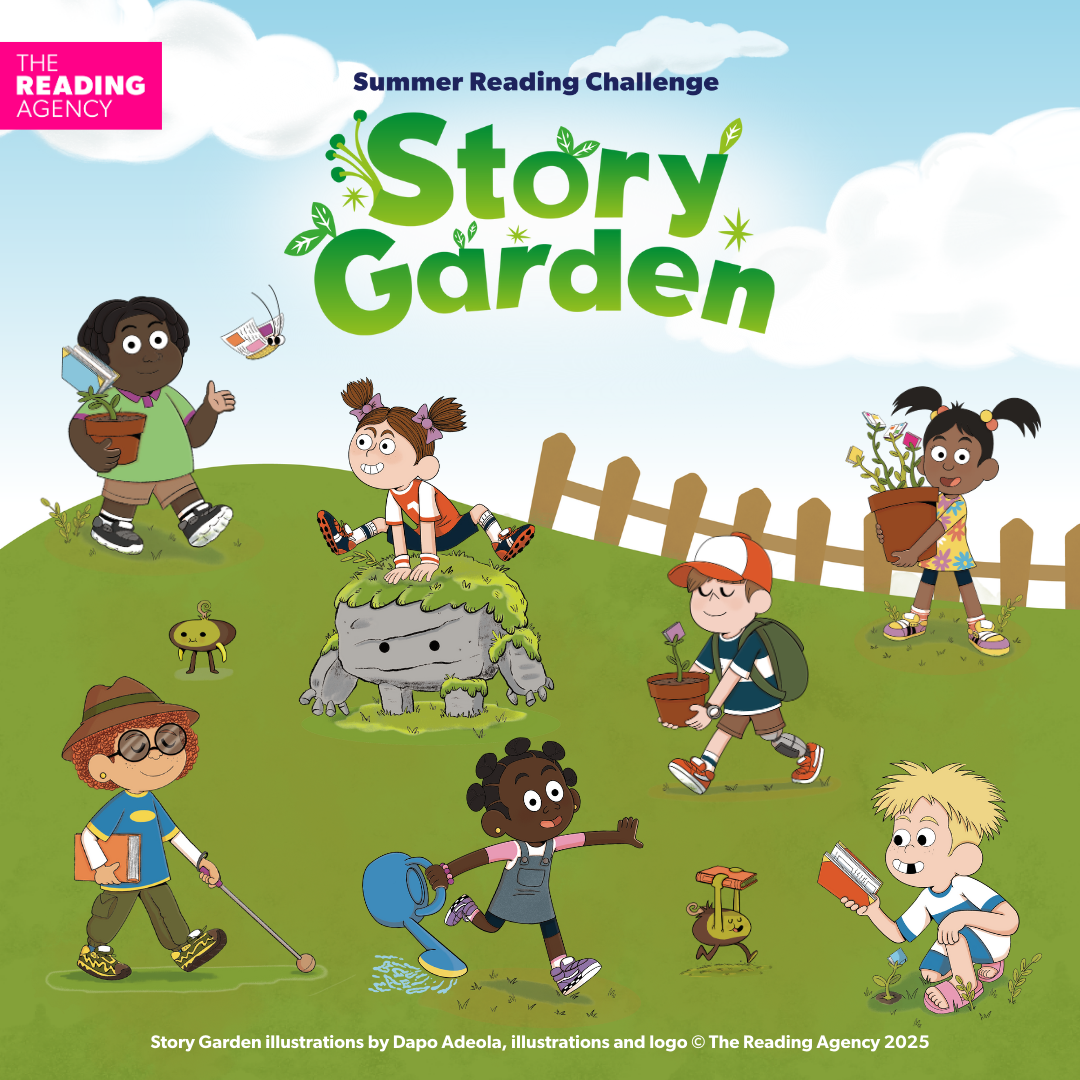 On Friday, the Librarians from the Petersfield Library came into school to launch this year's Summer Reading Challenge, which encourages children to read a range of books over the summer holiday.
On Friday, the Librarians from the Petersfield Library came into school to launch this year's Summer Reading Challenge, which encourages children to read a range of books over the summer holiday.
This year's challenge is called 'The Story Garden', and includes lots of books featuring adventures inspired by the natural world and getting out into the great outdoors.
As always, there are charts to fill in and rewards to collect for completing the challenge, as well as lots of ideas for other activities to get the children outdoors this summer.
Will your child be taking part in this year's Summer Reading Challenge? Click here to find out more, including how to sign up at your local library.
Week 37 - Amazing Grace, crazy about creation and sensing summertime
Our People Project this term was all about American computer programming pioneer Grace Hopper. Grace joined the US Navy in 1943, working on some of the earliest computers and helping to devise a language called COBOL which used words rather than numbers. She retired in 1966, but was recalled and remained on active duty for another 20 years due to her amazing knowledge and expertise. She even invented the phrase 'debugging'! Ask your child about Grace, or watch our Grace Hopper TED talk to learn more.
 Our World Faith and Philosophy unit this term was all about creation. The children began by making their own creations out of Play-Doh. They then went outside to explore the natural world and think about how things like trees, plants and insects had been created - how had our world come to be? They then heard creation stories from two different cultures: the Christian creation story and the Hindu creation story, considering the similarities and differences between the two, and how lots of different cultures, as well as the scientific community, have sought to answer the question of creation.
Our World Faith and Philosophy unit this term was all about creation. The children began by making their own creations out of Play-Doh. They then went outside to explore the natural world and think about how things like trees, plants and insects had been created - how had our world come to be? They then heard creation stories from two different cultures: the Christian creation story and the Hindu creation story, considering the similarities and differences between the two, and how lots of different cultures, as well as the scientific community, have sought to answer the question of creation.
What does your child remember about our exploration of creation stories?
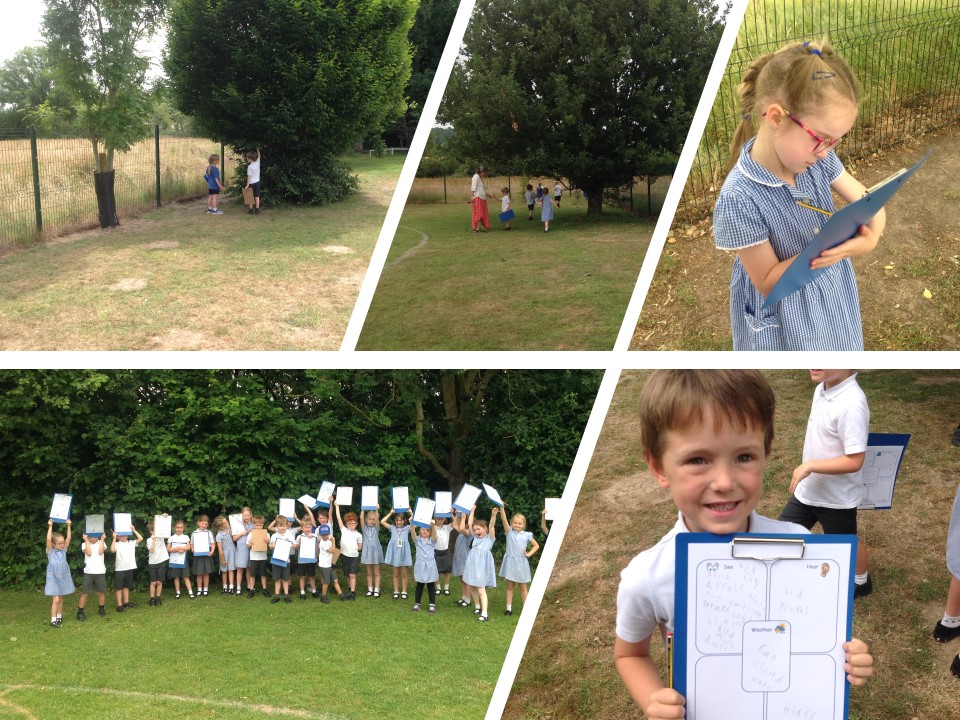
In Science, we continued our look at the changing seasons by heading outside into the sunshine. Now that the solstice has taken place and summer is officially here, the children took their clipboards outside to see how the new season was having an effect on our environment.
They thought about what they could see, hear, smell and feel now that summer had come. It could be the warm sun on their skin, the smell of the freshly cut field, the buzz of all the insects, or the sight of a bright sun in cloudless blue skies.
What changes did your child notice in the school environment now that summer is here?
Week 36 - Perfecting place value, amazing animation and a good Grylling
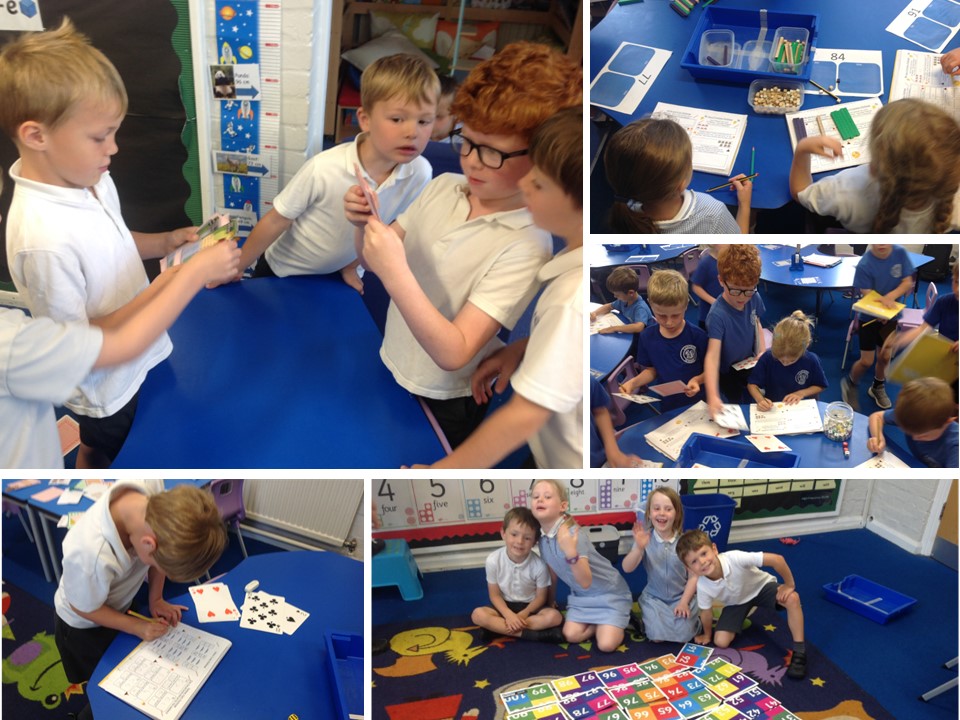
In Maths, we've been looking at number and place value up to 100. This has included recognising numbers, building numbers using lots of ten and lots of one, comparing numbers using the 'greater than', 'less than' and 'equal to' symbols, and recognising one more and one less than any given number. The children have undertaken a range of challenges to aid their learning, including building a giant 100-square jigsaw, making the greatest number they can using two playing cards, and using the splat square on the computer to help visualise numbers and number patterns.
Ask your child which Maths activities they've enjoyed this week.

In Computing, we've been using the '2Create a Story' app on Purple Mash to make our own e-books.
The children began by creating characters and writing simple sentences about them. They then added in animated movement, sound effects and backgrounds to make their stories even more exciting. Now they're used to animation, we'll be moving on to the '2Animate' app, which will allow them to experiment with frame-by-frame animation, just like the traditional Disney movies.
Maybe you could log on to Purple Mash and make an animated story together.
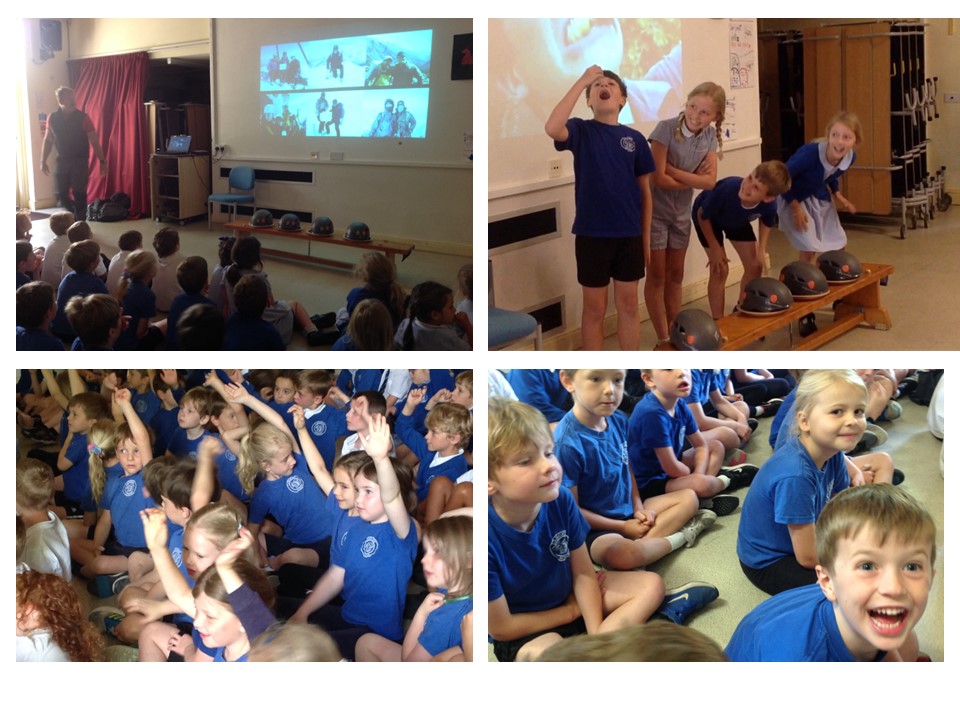
On Tuesday, we had an exciting whole-school assembly when ex-Royal Marine Scott visited the school. He now works with Bear Grylls on his TV projects, and talked about his adventures in the wilderness, jumping in and out of helicopters, and working with celebrities in the wild. He even shared some TV secrets, as well as a few survival tips, with some of the more intrepid older children getting to try a few "delicacies", including silk worm pupae, giant water beetle heads and chocolate-covered scorpions!
Ask your child if they'd have eaten any of the survival foods on offer.
Week 35 - A sizzling Sports Day, sampling salads and making magic
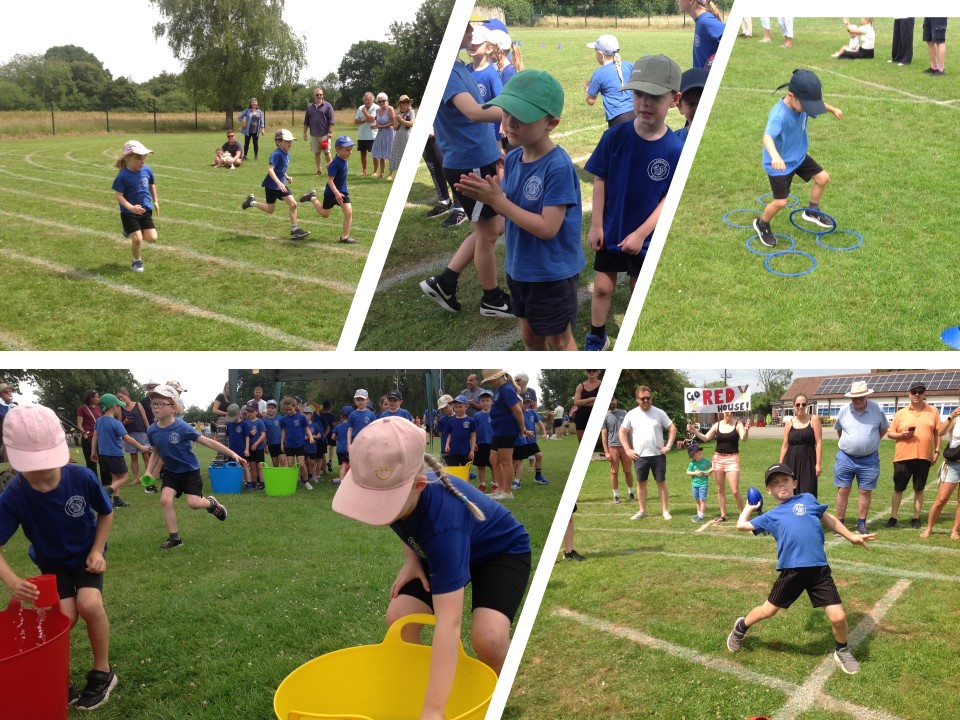 It was Sports Day on Friday, and the children finally got to show off the sporting skills they'd been practising in their P.E. lessons.
It was Sports Day on Friday, and the children finally got to show off the sporting skills they'd been practising in their P.E. lessons.
There was throwing, jumping, hurdles, an obstacle course, the water race, and tunnel ball, as well as some straight-forward sprint racing for those who wanted to take part. Afterwards, the children even got to cool themselves down with a well-earned ice pop!
It was also a lovely opportunity for families to spectate and to share a picnic lunch out on the field to celebrate everybody's achievements.
What was your child's favourite Sports Day event?
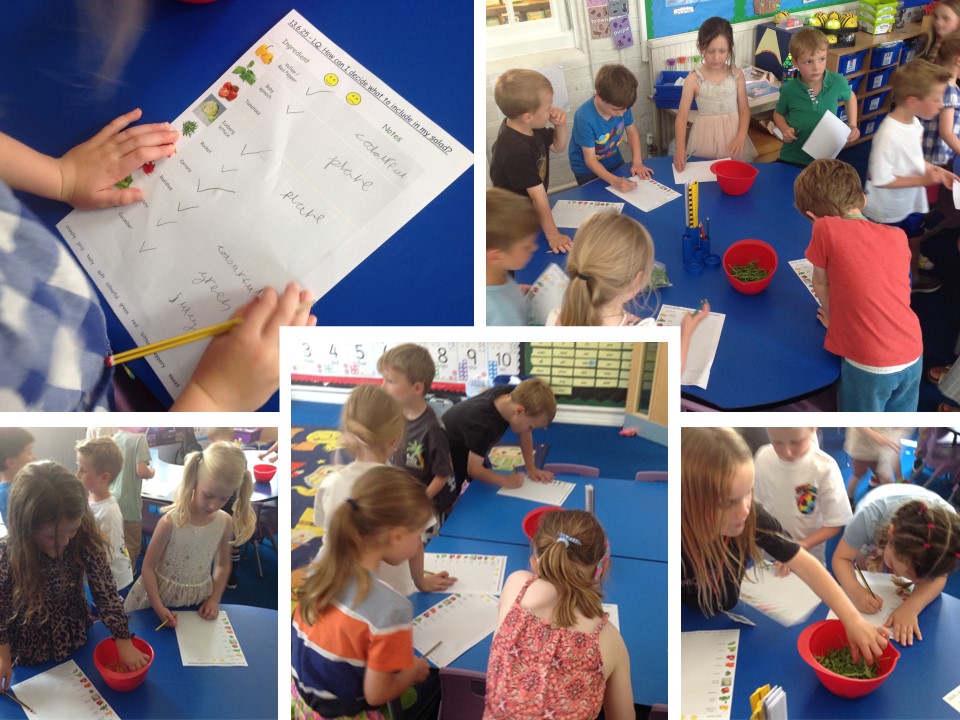
Our Design & Technology unit this term is all about seasonal salads.
In a few weeks' time, we'll be making salads in class, but our first job was to find out which vegetable ingredients were most popular amongst the members of Year 1 and which ones they might want to incorporate into their own salad recipes. We did this last Friday afternoon by performing a salad survey, with the children sampling lots of different ingredients to see which they loved (tomatoes) and which were a bit of an acquired taste (rocket and radishes!)
Ask your child about their survey results; were there any surprises?
 In English, we've turned our hand to writing some poetry this term. Inspired by 'The Magic Box' by Kit Wright, the children have been writing sentences using poetic language, including onomatopoeia, alliteration, poetic colours, opposites and firsts and lasts.
In English, we've turned our hand to writing some poetry this term. Inspired by 'The Magic Box' by Kit Wright, the children have been writing sentences using poetic language, including onomatopoeia, alliteration, poetic colours, opposites and firsts and lasts.
They also described some magical materials from which their boxes might be made. After writing their poems, the children then decorated their own 'Magic Boxes' and placed a copy of their poem inside for safe keeping.
Has your child read their Magic Box poem yet?
Week 34 - Awesome aviation, fabulous foliage and perfecting position
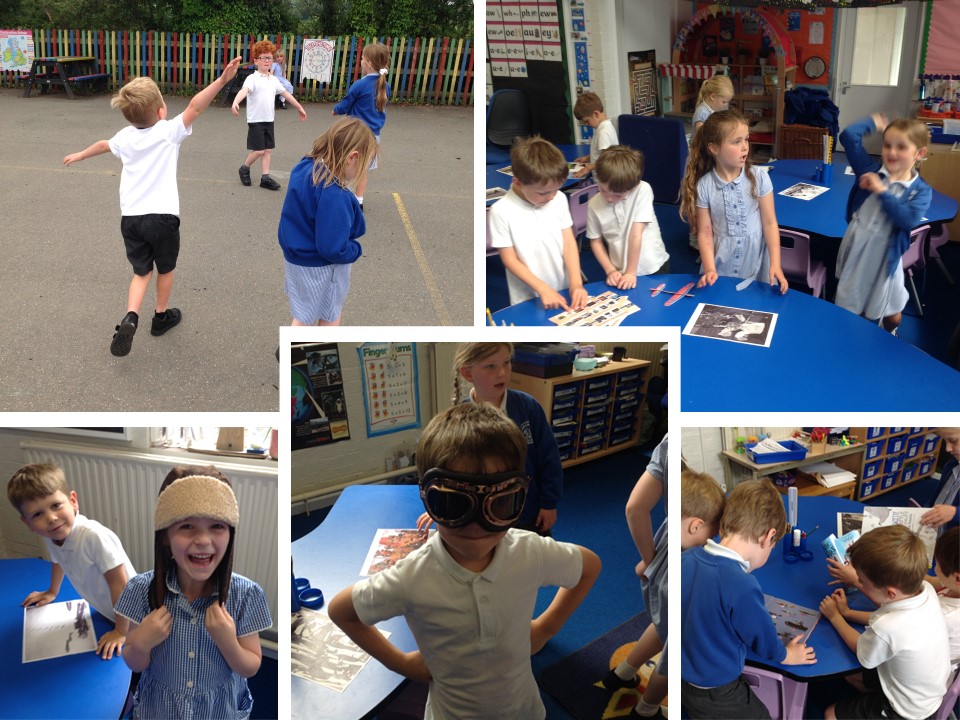
We began our look at significant women in history with a bit of a mystery - what did all the objects, books and pictures in the room have in common? After having some time to explore, the children soon worked out that it was something to do with flying planes and World War II.
They then heard a little about Mary Ellis, a female pilot who joined the Air Transport Auxiliary during World War II and flew hundreds of planes around the UK, delivering them to airfields ready for combat.
Can your child find out any interesting facts about Mary Ellis and the ATA?
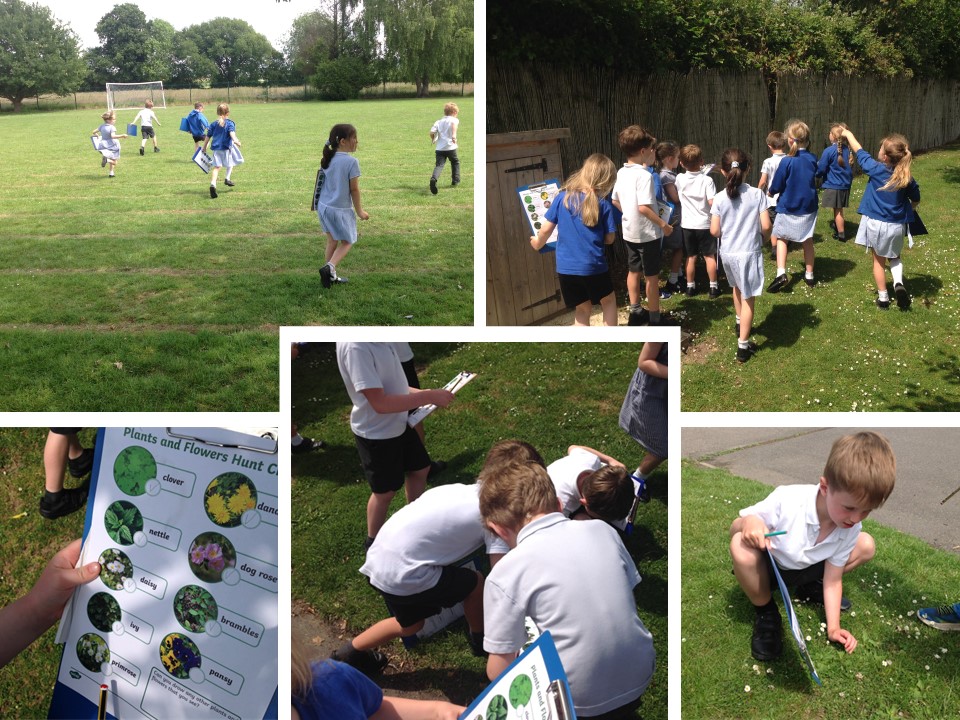 In Science, we continued our look at plants by talking about the difference between wild plants and garden plants.
In Science, we continued our look at plants by talking about the difference between wild plants and garden plants.
We learnt that garden plants are usually planted and looked after by people, whereas wild plants grow wherever their seeds land and rely on naturally receiving everything they need to grow and thrive. We then went out into the school grounds to see what different types of wild flowers we could find on the playing field and around the copse.
Ask your child which wild flowers we found around the school. Can they recognise and name any of the wild or garden plants you have at home?
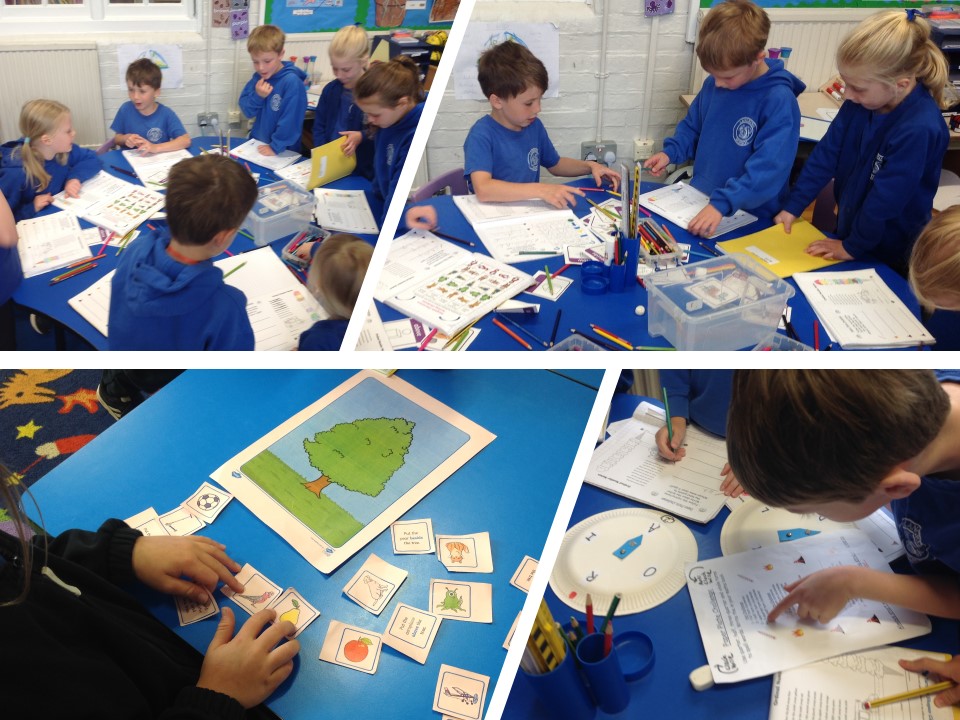
In Maths, we've been looking at position and direction. This includes using left and right, forwards and backwards, above and below, and turning clockwise or anticlockwise through a quarter, a half, a three-quarter or a full turn.
To do this, we've been cracking codes to spell the names of our classmates by turning an arrow in the correct direction to point to a letter, and we've also been making our way through pirate treasure maps and programming Bee-Bots to go in specific directions.
Can your child direct you using positional language?
Week 33 - Wonderful wind, exciting experiments and healthy humans
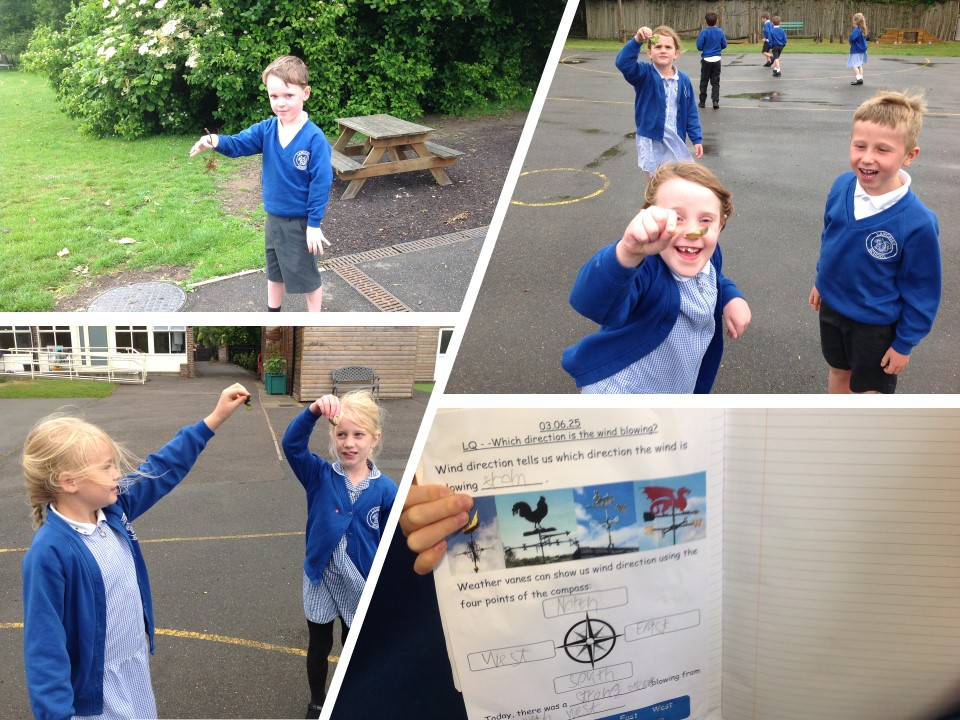
In Geography, we were talking about the wind this week. From a simple question - 'Which direction is the wind blowing from today?' - we unpacked lots of geographical knowledge to decide what effect this would have on our weather. Using compasses to find the wind direction, we determined that on Tuesday afternoon the wind was coming from the south-west. We then used maps of the world to explore what types of weather we can expect if the wind is blowing from the south-west, and how the weather might be different if it were coming from the north, east or south.
Can your child remember what different types of weather the four winds might bring and why?
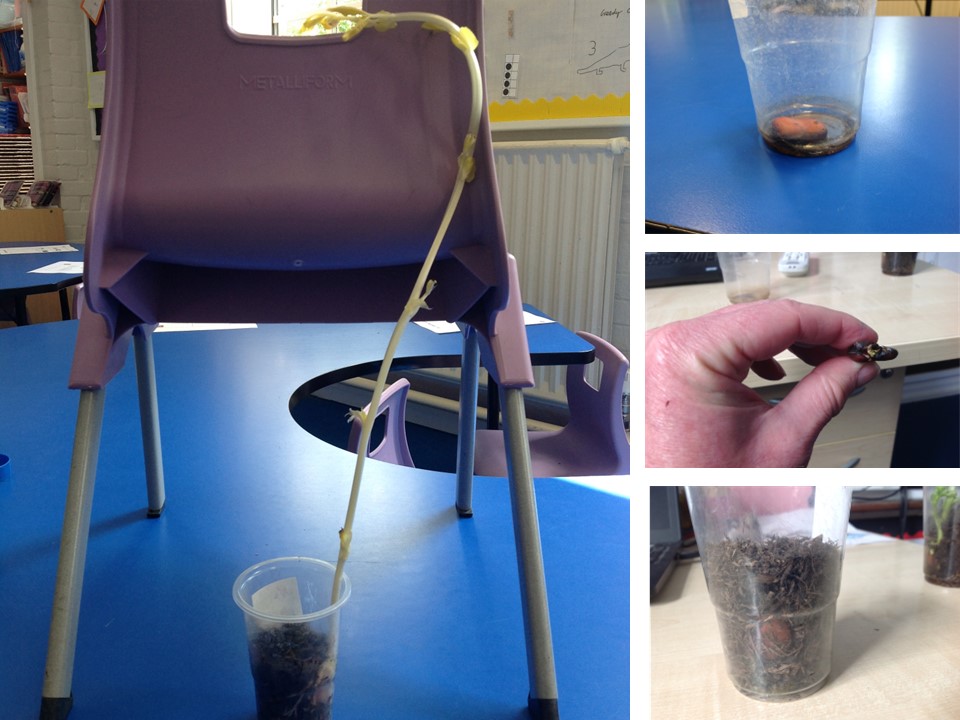
After sending the children's own bean plants home before half-term (as they were taking over the classroom!), we turned our attention this week to our experimental plants. There were four specimens: one without water, soil or light; one without light; one without soil and one without water. The children examined how the plants had grown and compared the results with their original predictions to see if they were correct. We then drew conclusions from our results as to what plants need in order to grow, thrive and survive.
Ask your child if they were surprised by any of the results and what conclusions we came to?
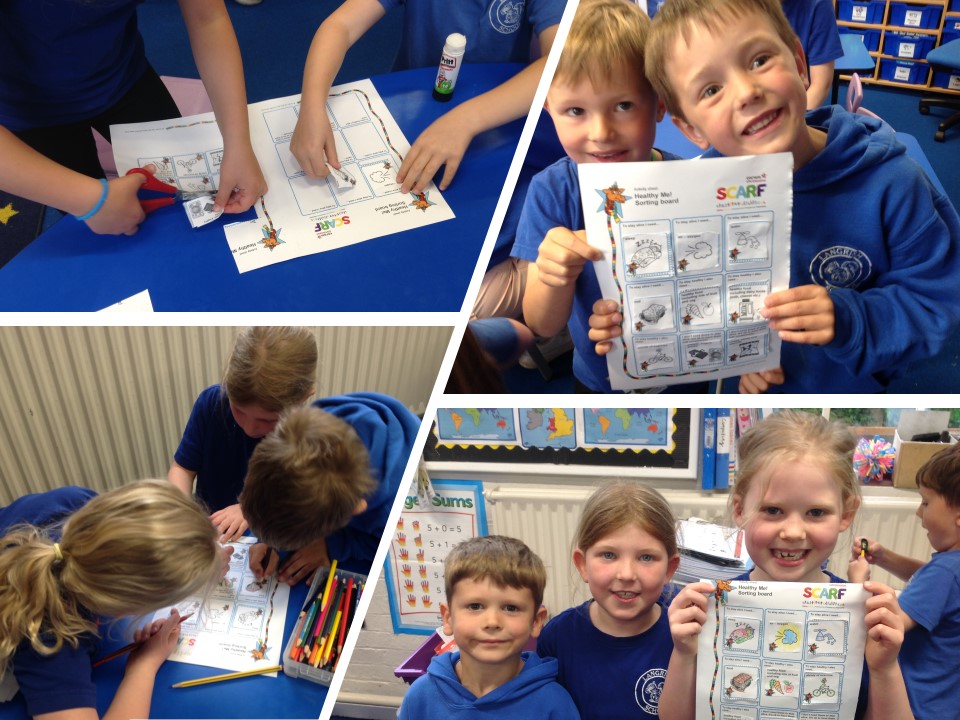 In PSHE, we've been looking at what we need in order to stay healthy. The children discussed what we need to stay alive. They then did a sorting activity in groups, in which they had to sort items into "Essential to stay alive", "Things we need to stay healthy" and "Things that aren't very healthy, but it's OK to have them now and again". It led to some really great discussion about what we need in order to survive, particularly around where sleep fitted into our sorting activity, and we even made some comparisons with our Science learning about plants last term.
In PSHE, we've been looking at what we need in order to stay healthy. The children discussed what we need to stay alive. They then did a sorting activity in groups, in which they had to sort items into "Essential to stay alive", "Things we need to stay healthy" and "Things that aren't very healthy, but it's OK to have them now and again". It led to some really great discussion about what we need in order to survive, particularly around where sleep fitted into our sorting activity, and we even made some comparisons with our Science learning about plants last term.
Can your child tell you the four things we decided were essential to stay alive?
Week 32 - Fabulous fractions, special servings and clay creations
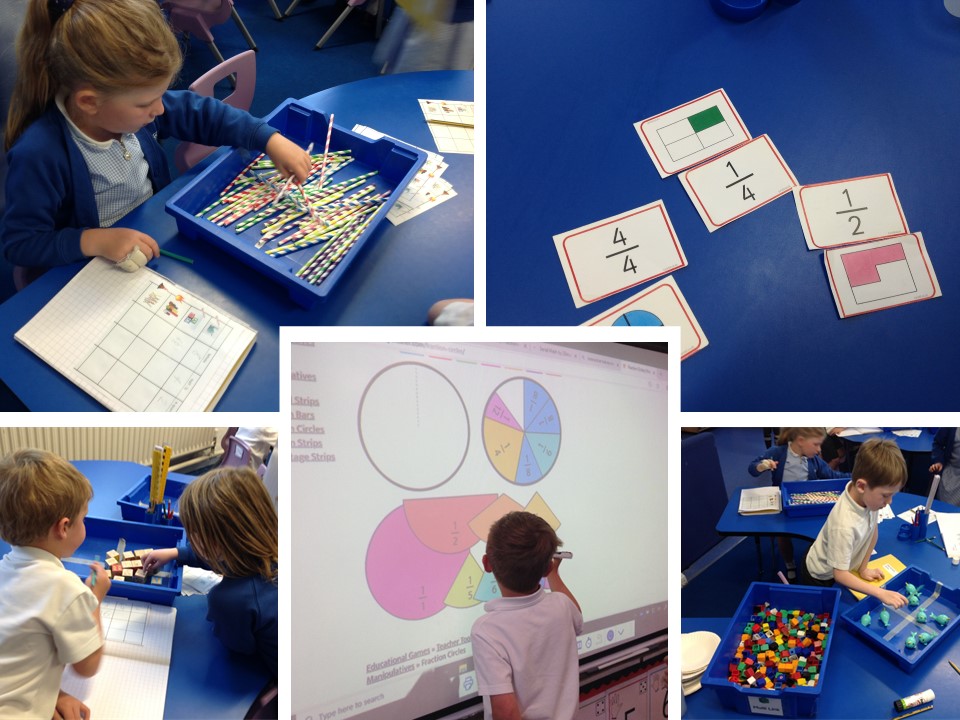
In Maths, we've just finished our unit on fractions. We learnt about halves and quarters in Year 1, so we began by recognising halves and quarters of shapes (ensuring each part was equal), before moving onto recognising and calculating halves and quarters of amounts. The children were set a number of challenges in order to help them understand fractions, including counting a range of different objects set out in trays and having to calculate a half and a quarter of each amount.
Can your child tell you about halves and quarters? Maybe you could work out some halves and quarters of amounts at home, or sing along to this Fractions Song on Super Movers for extra practice!
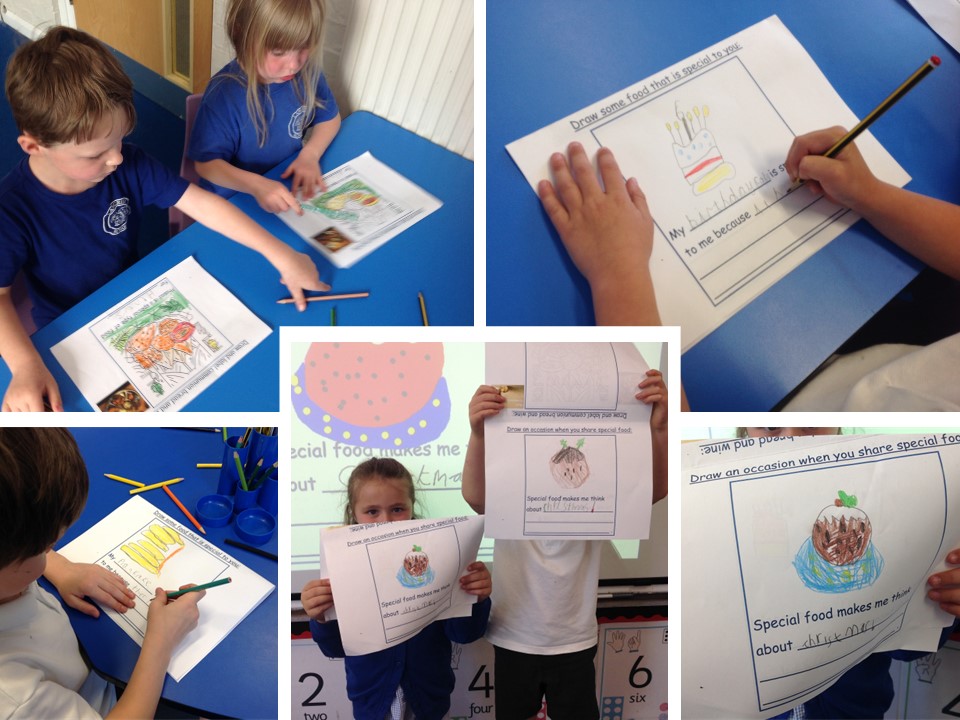
Our World Faith and Philosophy this term was all about special food. We began by looking at foods that are special to us, and read 'Frog and a Very Special Day' in which Frog's birthday is marked with a table full of food, including a birthday cake. We talked about foods that celebrate Christian festivals - such as hot cross buns, Christmas pudding, and communion bread and wine - and heard the story of the last supper. We then learnt about special food in the Hindu culture, including Prasad and how blessed food is shared amongst those making the offering to the deity.
What can your child tell you about special food in different cultures?
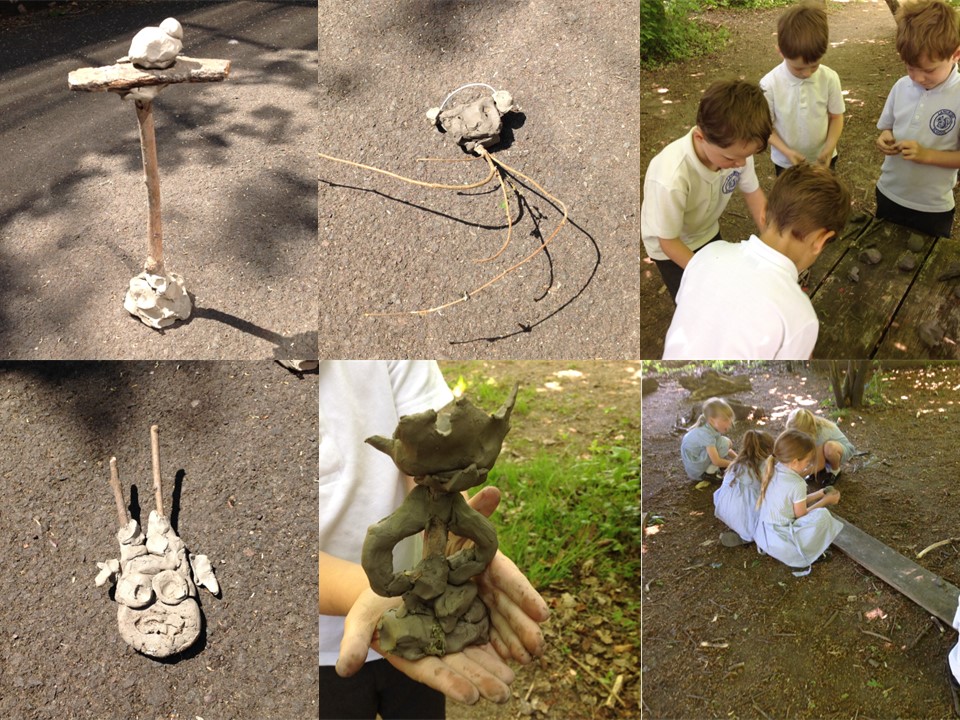 In Art, we finished our look at the work of Spanish artist Joan Miró by making multi-textured surrealist sculptures inspired by his work.
In Art, we finished our look at the work of Spanish artist Joan Miró by making multi-textured surrealist sculptures inspired by his work.
We took our clay out into the copse, and used objects we found on the ground to include in our sculptures, including sticks, feathers, wool, flowers and leaves.
We also used twigs and other implements to make marks and patterns on our sculptures, before leaving them to air-dry and hoping they all held together!
What can your child tell you about their sculpture and the work of Joan Miró?
Week 31 - Jubilant journalists, surreal sculptures and anyone for tennis?
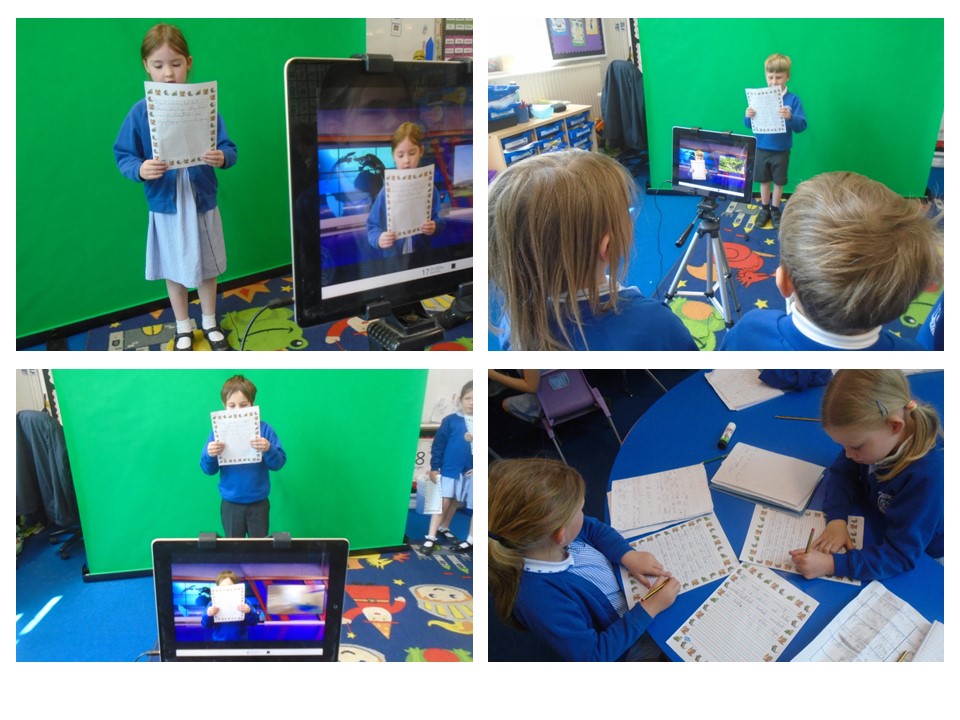 This week, we finished our dragons unit by recording the news stories the children had written about a dragon sighting.
This week, we finished our dragons unit by recording the news stories the children had written about a dragon sighting.
After looking at what elements we'd expect to see in a news story, the children learnt a class example, then used that as a basis for creating their own dragon-based news stories.
They then got to record them in front of a green screen, making them look like they were in a real news studio!
I have to say, there were some very professional results - have you watched your child's newscast yet?
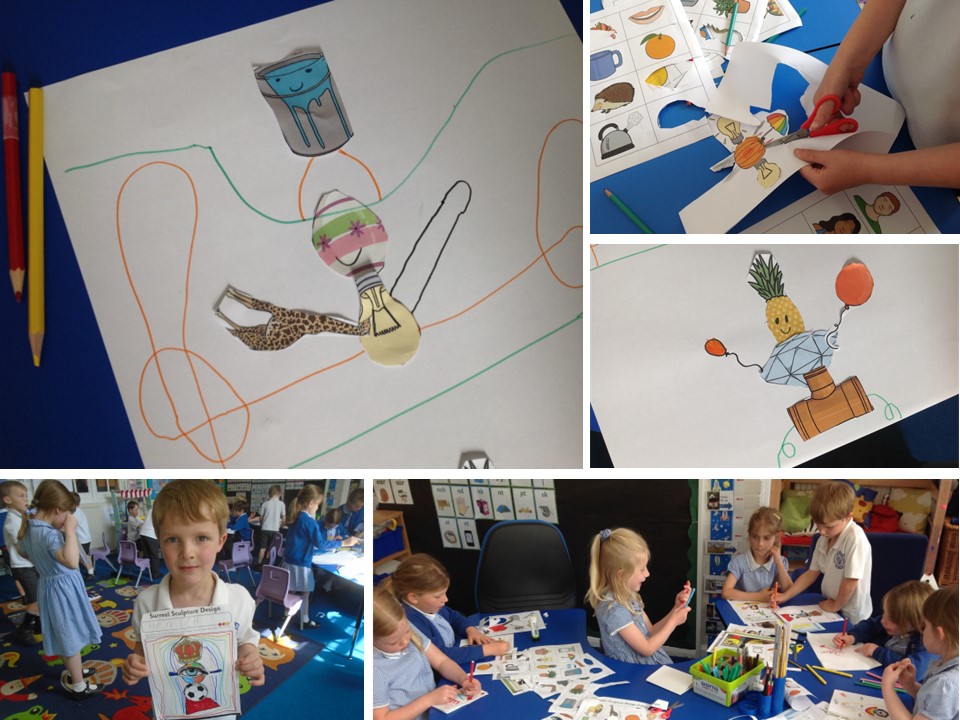
In Art, we've been learning about the Spanish artist Joan Miró.
Having looked at his 'Magical Realist' paintings, we then examined paintings of his featuring more surreal elements. Finally, we spent some time exploring his surrealist sculptures, often using found objects put together in strange juxtapositions. The children then designed their own surrealist sculptures by cutting and sticking a range of random elements, and their next step will be to see what creations they can make out of clay.
What sorts of things did your child include in their surrealist sculpture design?
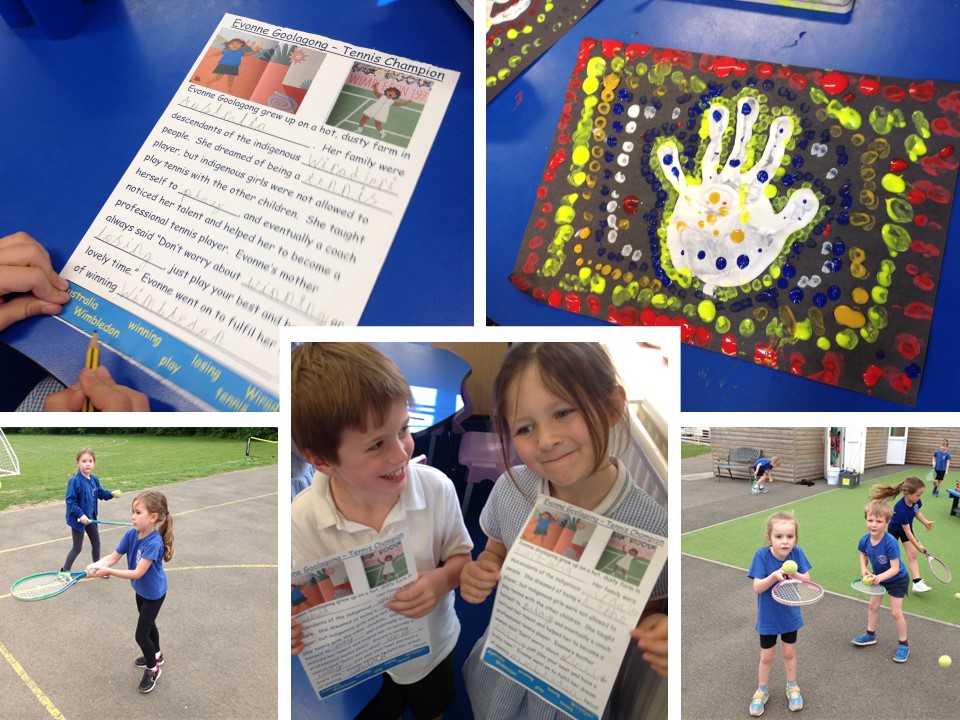 Our People Project this term is called 'How to Represent Your Country', and Year 1 were learning about the Australian tennis legend Evonne Goolagong Cawley.
Our People Project this term is called 'How to Represent Your Country', and Year 1 were learning about the Australian tennis legend Evonne Goolagong Cawley.
Originally prevented from playing tennis due to her Aboriginal heritage, Evonne went on to win Australian and French Open titles, as well as winning Wimbledon twice. After hearing about Evonne's life and achievements, it only seemed fair to give the children a go at tennis themselves - perhaps one of them will end up on Centre Court one day! We even turned our hand (literally!) to some Aboriginal-inspired art too.
What can your child tell you about Evonne?
Week 30 - Fun in Forest School, V.E. Day values and sensational seasons
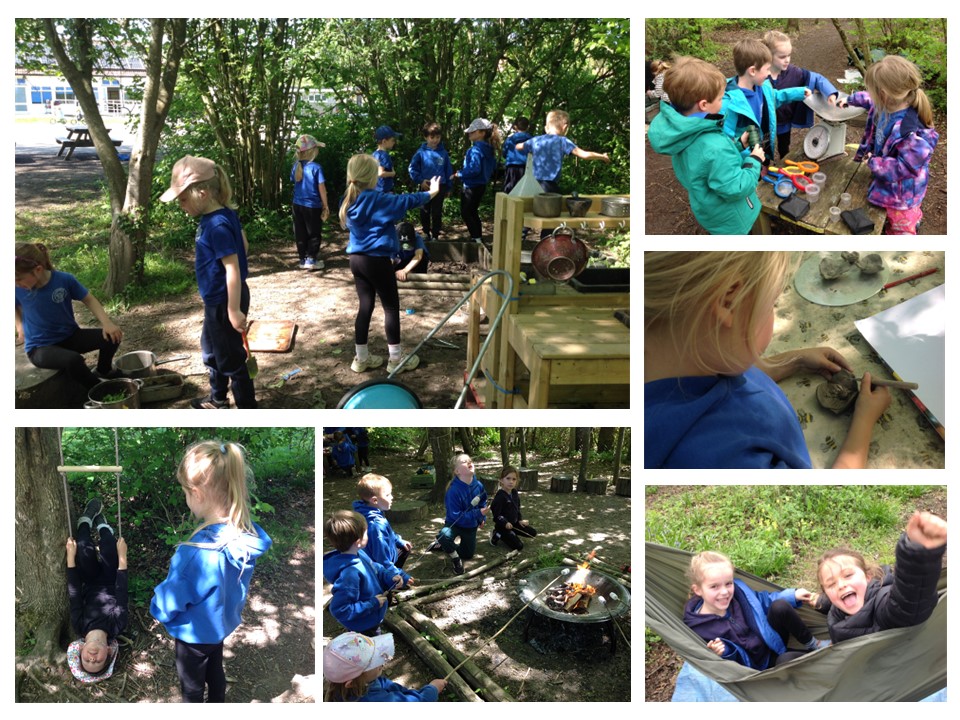 Year 1 have had a fantastic time in the copse over the past three weeks enjoying their Forest School sessions with Mrs S.
Year 1 have had a fantastic time in the copse over the past three weeks enjoying their Forest School sessions with Mrs S.
Alongside exploring, tree climbing, den building and playing in the mud kitchen, the children have also enjoyed swinging in the hammock, toasting marshmallows over the fire to make s'mores, and sculpting and painting clay poppies as part of the school's VE Day celebrations. Each session also begins with a song, and ends with everybody saying one thing that they're thankful for, before leaving some oats for the copse's wildlife.
Which activities has your child enjoyed the most?
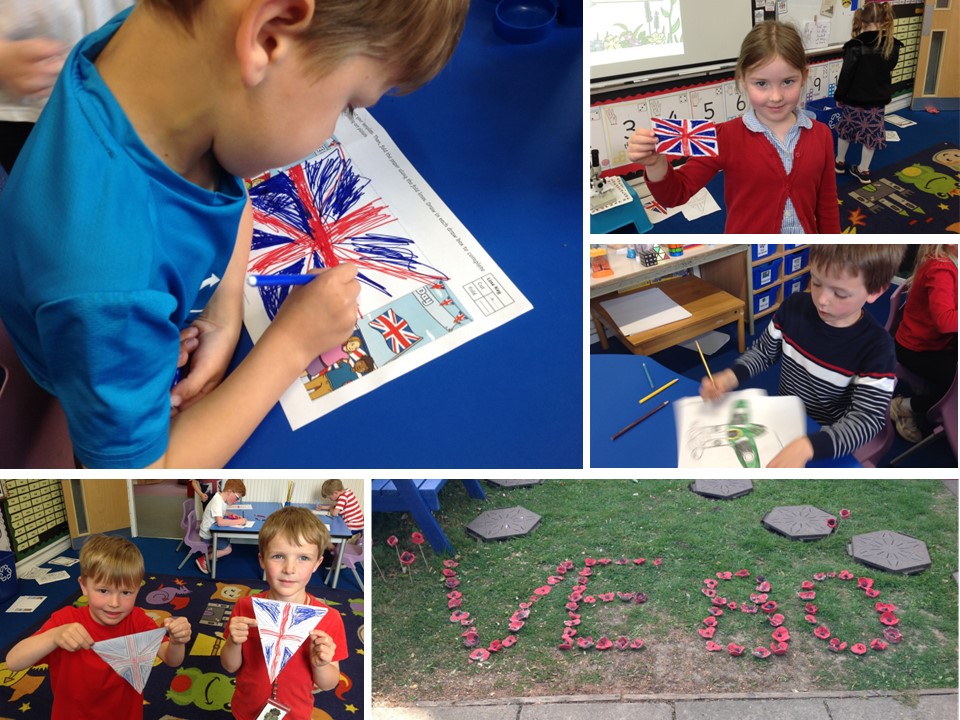 Speaking of VE Day celebrations, the school turned red, white and blue on Thursday as the country marked 80 years since the end of World War II in Europe.
Speaking of VE Day celebrations, the school turned red, white and blue on Thursday as the country marked 80 years since the end of World War II in Europe.
The children came in wearing red, white and blue themed non-uniform, and Mrs Rawlings led an assembly explaining what VE Day meant and why we commemorate it every year.
In the afternoon, the children chose from a variety of VE Day activities, including drawing and colouring, making bunting, and even colouring and folding their own paper spitfires.
Can your child explain the importance of VE Day?
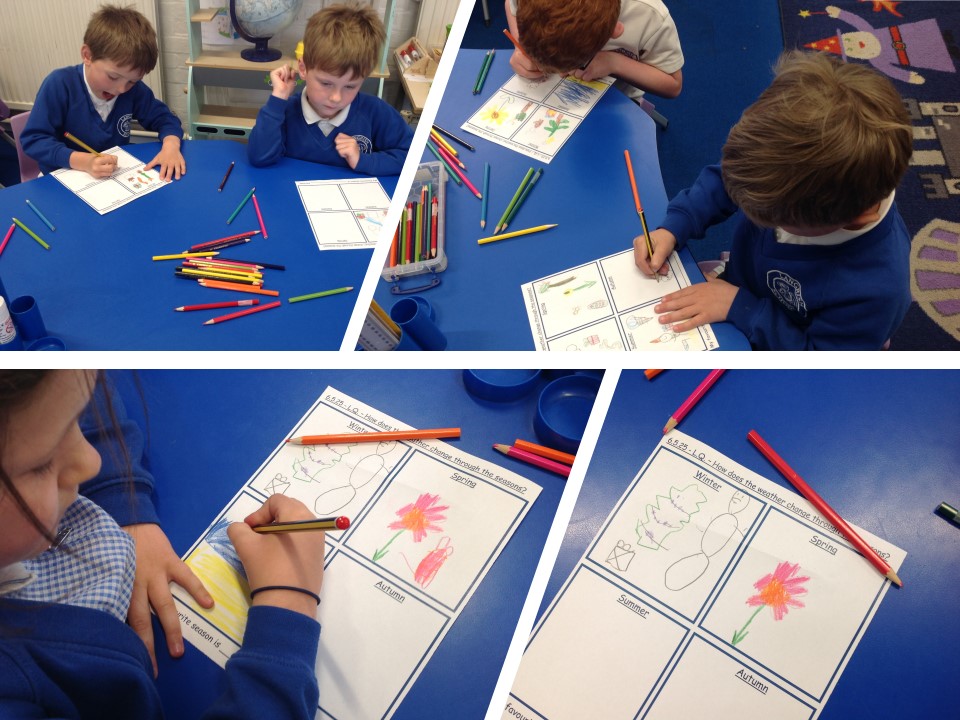 In Geography this week, we were talking about the seasons.
In Geography this week, we were talking about the seasons.
It's a subject we cover throughout the year, so the children are becoming experts at recognising the weather patterns of the different seasons, and explaining why we can be basking on the beach in July but throwing snowballs at each other in January.
We discussed the different events and celebrations that each season brings, and the children drew pictures and wrote about their favourite season.
Which is your child's favourite season and why?
Week 29 - Marvellous multiplication, plant predictions and tackling technology
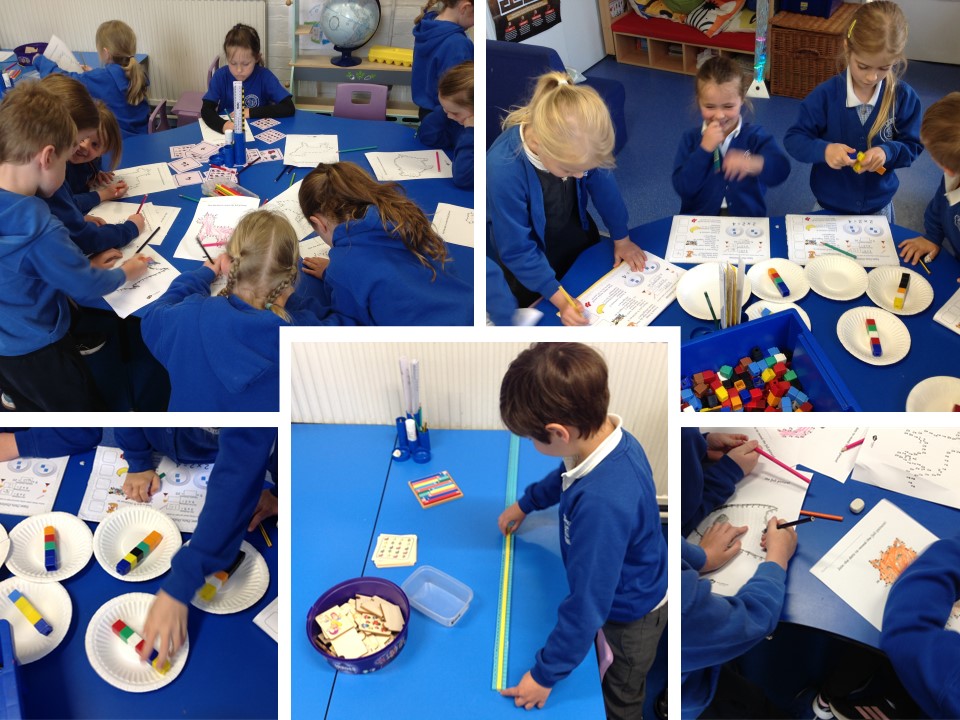
In Maths, we're currently learning about multiplication and division within 50.
This involves making, recognising and sharing equal groups, and strategies such as repeated addition in order to solve multiplication problems.
Challenges have included sharing cubes into equal groups on paper plates, counting the multiple eyes of aliens, and working out doubles and halves using spots on a ladybird.
Can your child count in twos, fives and tens? Maybe they could sing along to some of the Super Movers Times Tables Songs for some extra practice.
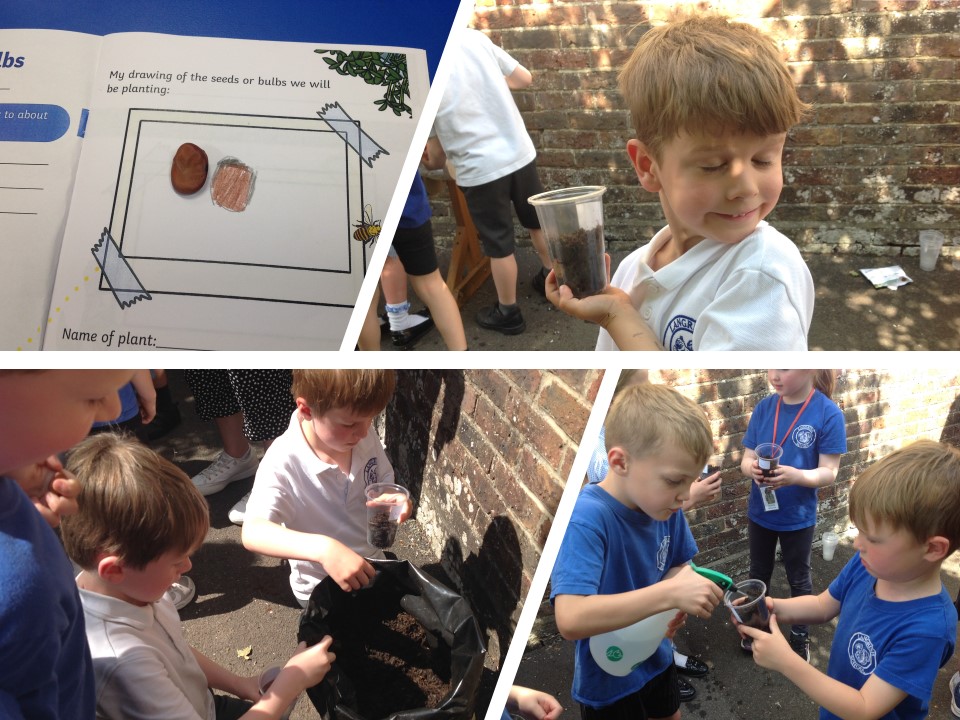 In Science, we're learning about plants and what they need in order to grow and thrive. So what better way to learn about that than to grow our own plants in the classroom? The children potted up their broad beans in cupfuls of compost, before watering them and leaving them on the windowsill in the sunlight. We then did scientific drawings of the seeds and the potted plant, noting how they both looked at this stage.
In Science, we're learning about plants and what they need in order to grow and thrive. So what better way to learn about that than to grow our own plants in the classroom? The children potted up their broad beans in cupfuls of compost, before watering them and leaving them on the windowsill in the sunlight. We then did scientific drawings of the seeds and the potted plant, noting how they both looked at this stage.
As part of our investigation, we also potted up three more runner beans which will have - respectively - no water, no soil and no sunlight. What does your child think will happen to these plants and why?
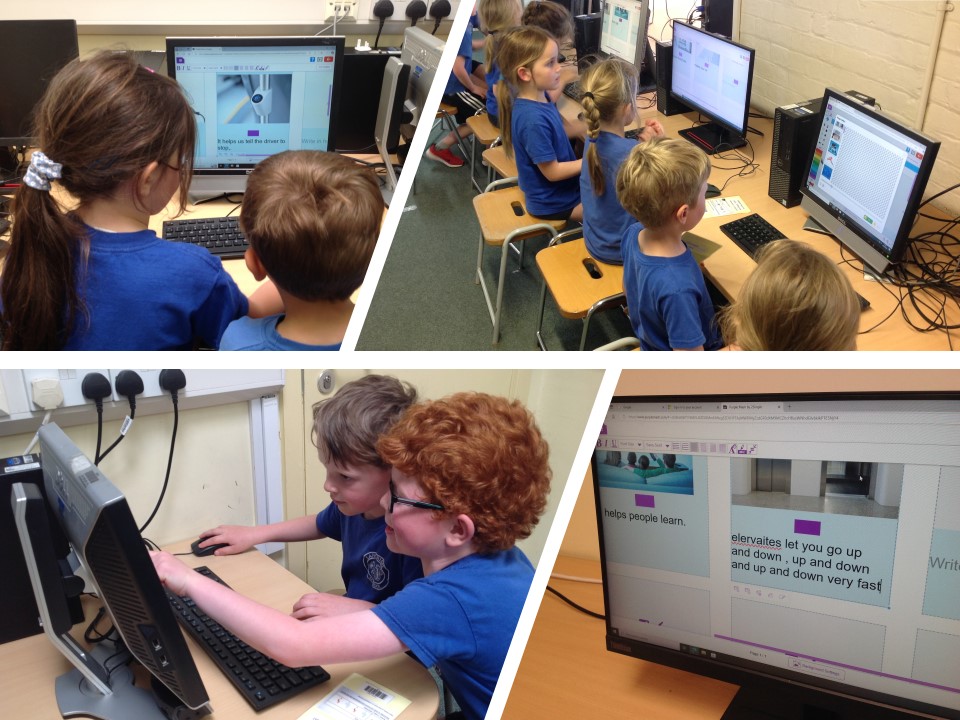
In Computing this week we were learning about how technology is used both at school and in the wider world.
We began by discussing what technology is and looked around the classroom for examples of technology that we regularly use. We then thought about examples of technology that we encounter outside of school and how it helps us in our day-to-day lives. The children then used Purple Mash to write about different types of technology that you might encounter in the wider world.
Try the 'What is Technology' sorting quiz on Purple Mash for an extra challenge.
Week 28 - Daring dragons, wonderful weather and five-a-day fun
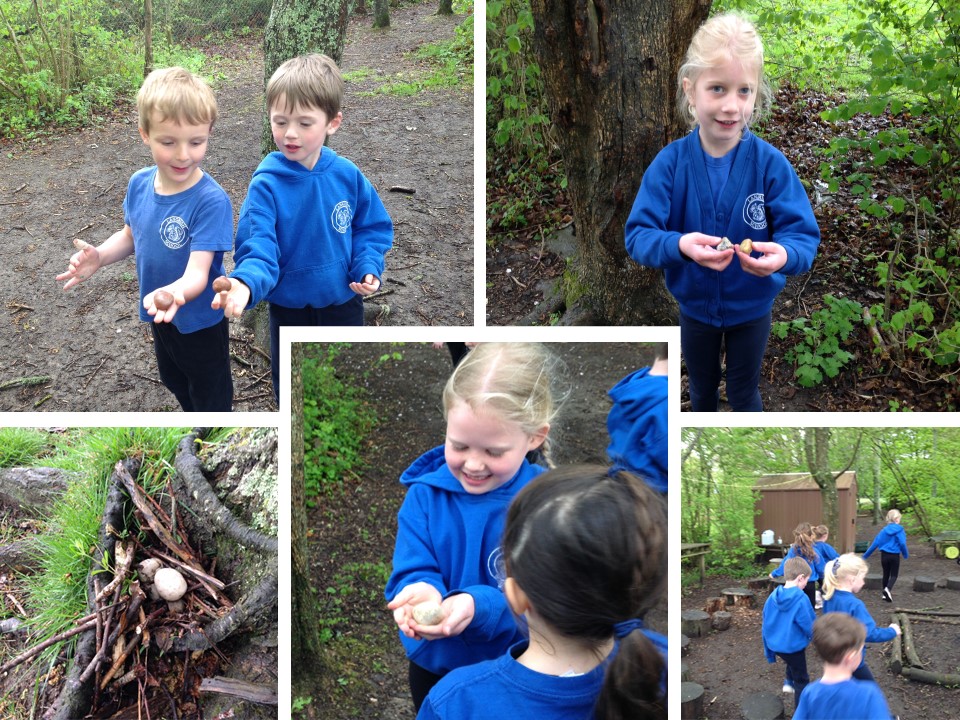
Our English unit this term is all about dragons, and it all began with a video which appeared to show dragons flying over Butser Hill towards the copse. We headed down to take a look, and the children found a large dragon footprint in the mud and three dragon nests! They were allowed to take one dragon egg each, as long as they promised to look after it. We then read the book 'Tell Me a Dragon', which is full of different dragons, and the children thought about what type of dragon theirs might be when it finally hatches...which can take up to one hundred years to happen.
How is your child keeping their dragon egg safe, and what type of dragon do they think it will hatch into?
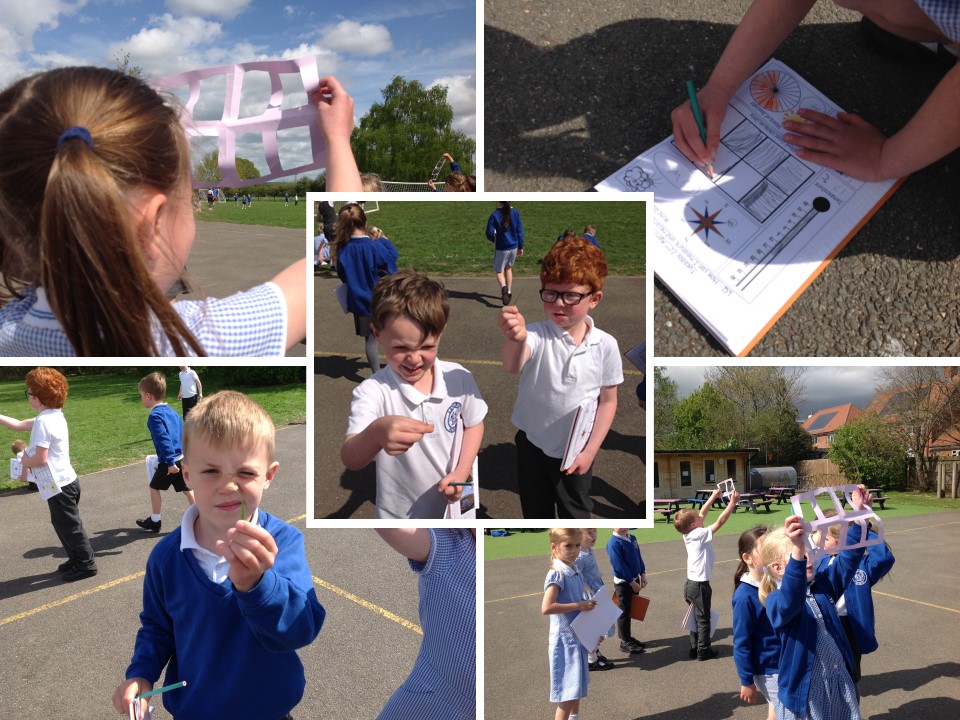
We began discussing that most British of topics in Geography this week: the weather. After looking at examples of different types of weather, we then headed out to see what the weather was doing today. We recorded the temperature, hours of daylight, wind direction and rainfall, before using oktas to evaluate the amount of cloud cover there was by counting how many of the eight rectangles were filled by cloud when the okta was held at arm's length. We even compared the clouds to some diagrams to work out what type of clouds they were.
Ask your child about our weather-measuring fieldwork.
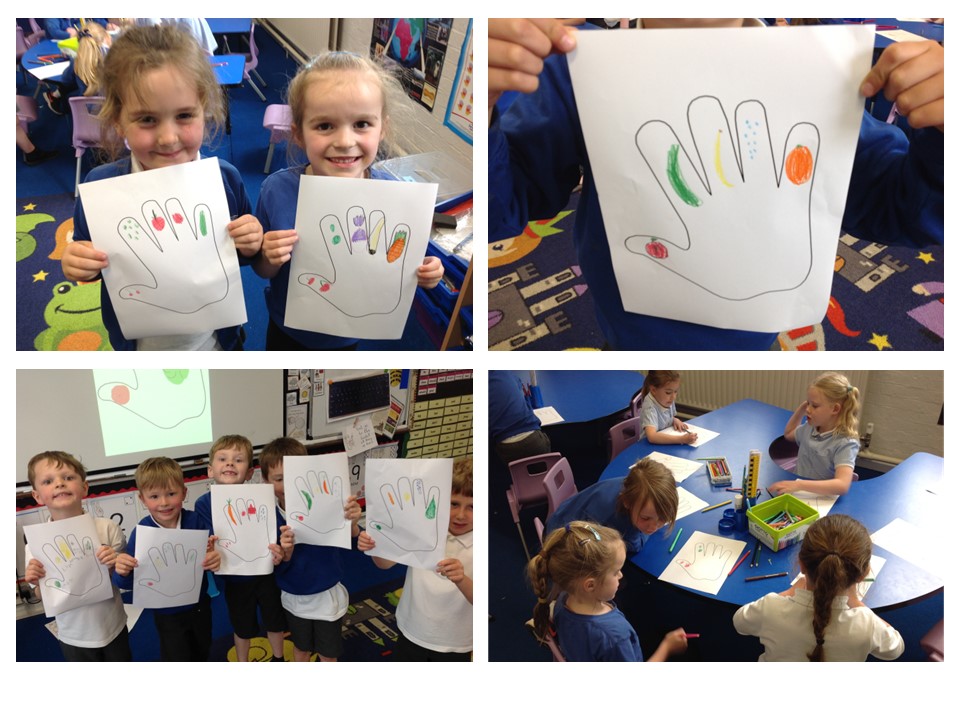 Our PSHE this term is all about 'Being My Best', and we began by looking at what we can eat to try and keep ourselves healthy.
Our PSHE this term is all about 'Being My Best', and we began by looking at what we can eat to try and keep ourselves healthy.
First, we looked at the roles of different food groups, including proteins, carbohydrates, dairy products, and fruits and vegetables, talking about how each different group helps our bodies to grow, develop and remain healthy. The children then drew their five favourite fruits or vegetables for their ideal 5-a-day.
Which fruits and vegetables are your child's favourites?
Week 27 - Capturing capacity, a warm welcome and protesting too much
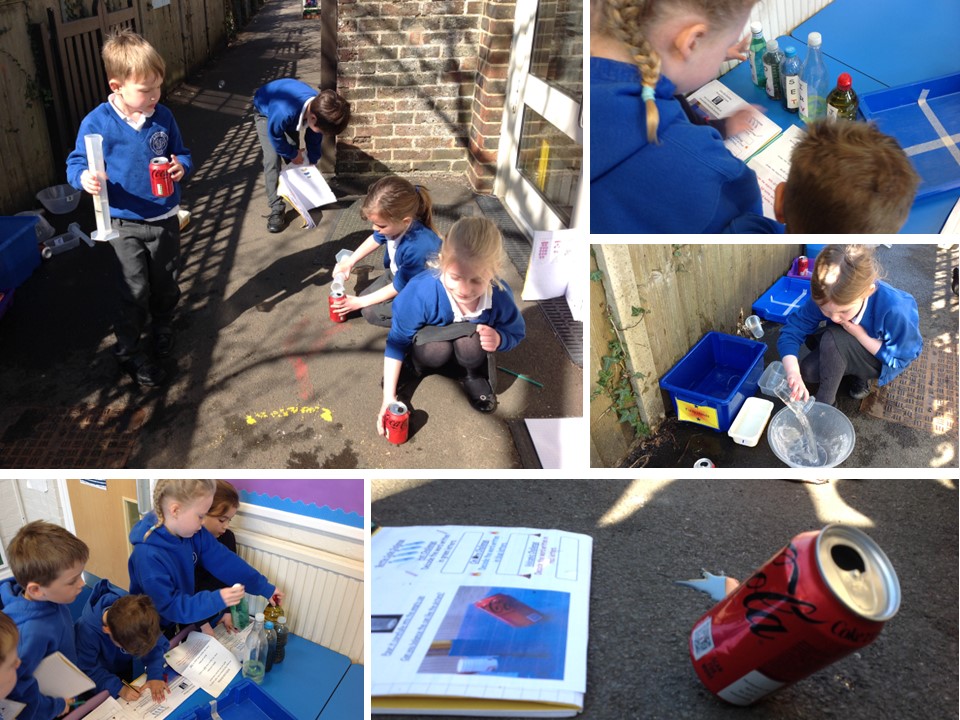 In Maths, we've continued our look at measurement by moving onto capacity and volume.
In Maths, we've continued our look at measurement by moving onto capacity and volume.
This week's challenges have included decoding messages by placing bottles containing different volumes into the correct order, estimating and measuring the capacity of different containers, and measuring exactly 100ml of water in order to get a soft-drink's can to balance on its edge. With so much water splashing around we've been very lucky it's been such a warm week!
Can your child tell you how they got on with their challenges?
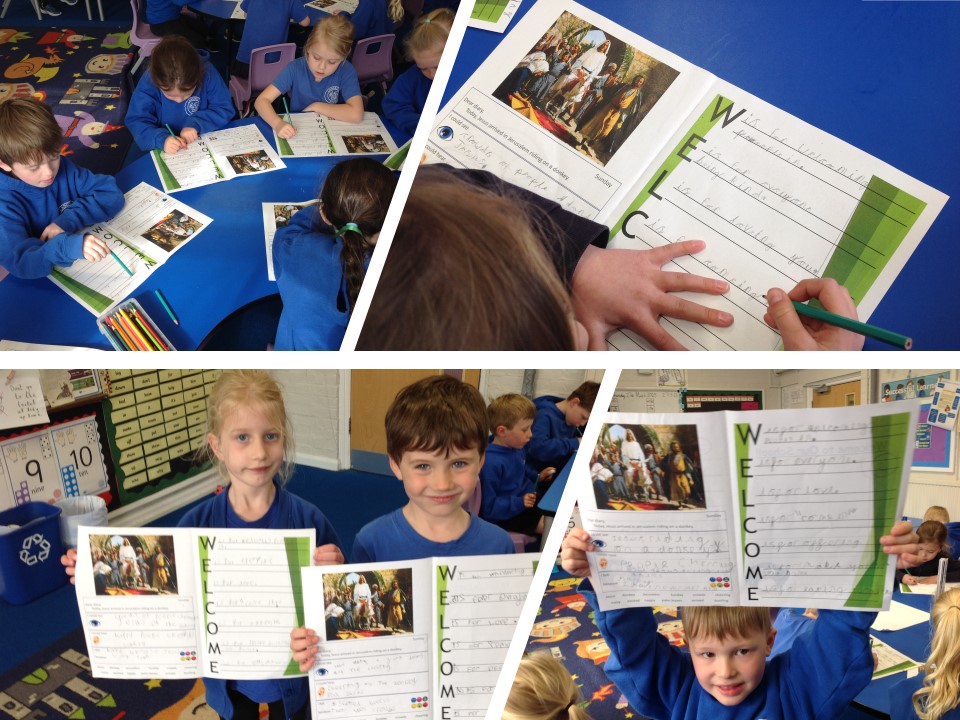 Our World Faith & Philosophy unit this term has centred around the concept of 'Welcoming'.
Our World Faith & Philosophy unit this term has centred around the concept of 'Welcoming'.
Having discussed what it means to be welcomed, the children went on to hear the Bible story of how Jesus was welcomed into Jerusalem on Palm Sunday (which they enjoyed re-enacting in the classroom!)
After that, they wrote a diary entry about witnessing Jesus being welcomed into Jerusalem, before writing an acrostic poem on the theme of welcoming.
Ask your child what welcoming means to them.
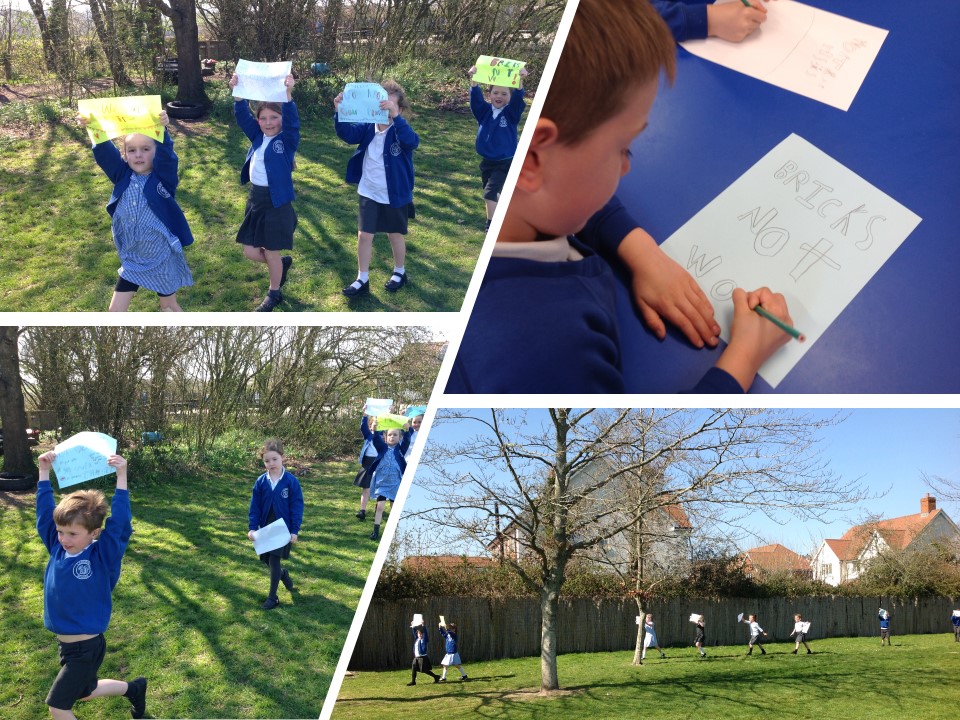 Our History unit on the Great Fire of London drew to a close this week by examining the legacy of the fire.
Our History unit on the Great Fire of London drew to a close this week by examining the legacy of the fire.
The children each decided what they thought the main cause of the fire was, before designing placards to petition the powers that be for new rules to make London safer. These included slogans such as 'Bricks Not Wood!', 'Wider Streets!' and 'We Want a Fire Brigade!'
Ask your child why they think the fire caused so much devastation, and what changes they would make to the city. You might also want to ask them about our famous historical visitor...
Week 26 - Measuring mass, pop-up production and springy science
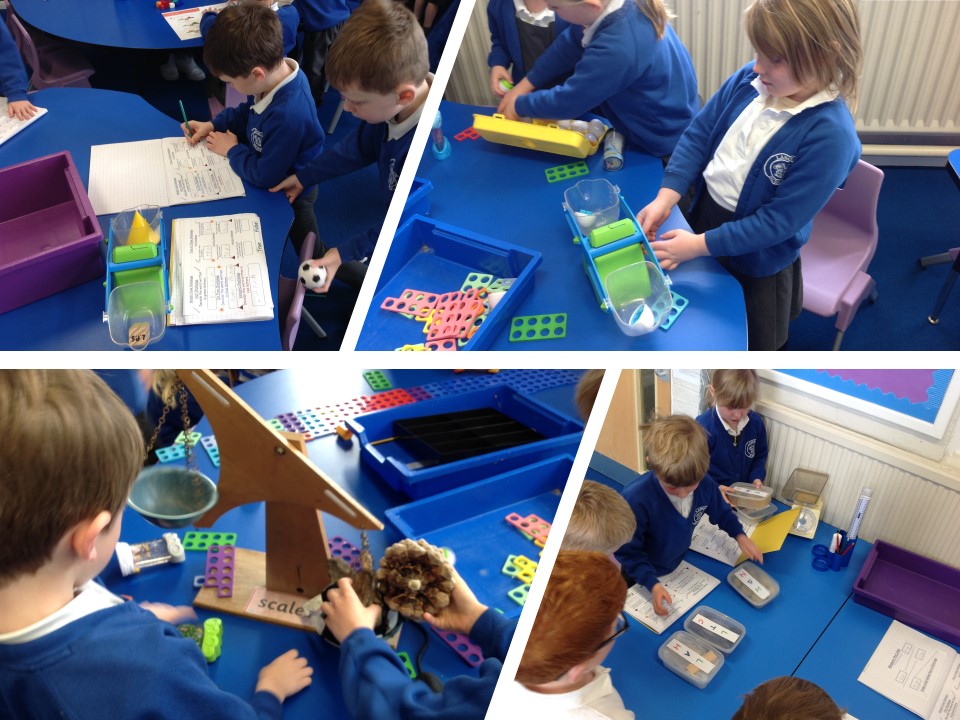
In Maths, we're continuing our look at measurement by moving onto mass and capacity.
This week, we looked at measuring and comparing mass using simple vocabulary (heavier / lighter / equal) and non-standard units (the mass of the pine cone is equal to three blocks).
The children had a number of challenges to complete, including unlocking a secret code by putting the containers in the correct order according to their relative mass.
Can your children tell you what the secret messages spelt out?
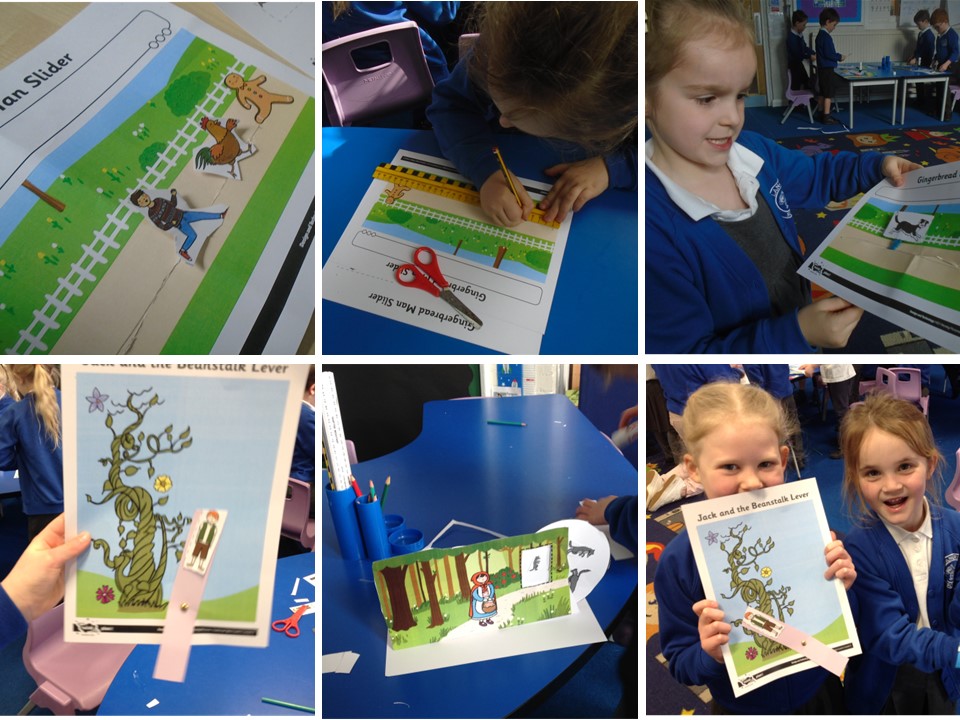
We've been perfecting our pop-up skills in Design & Technology over the past few weeks.
After sliders in the first week, we moved onto making pictures move with a lever mechanism, before finally moving onto a wheel mechanism, making the Big Bad Wolf look like he's sneaking up on Little Red Riding Hood.
Skills practised, the next step will be for the children to design their own pop-up Easter cards, deciding which mechanisms and materials would be the best ones to use for their creations.
Ask your child about their design ideas - what do they have planned for their Easter card?
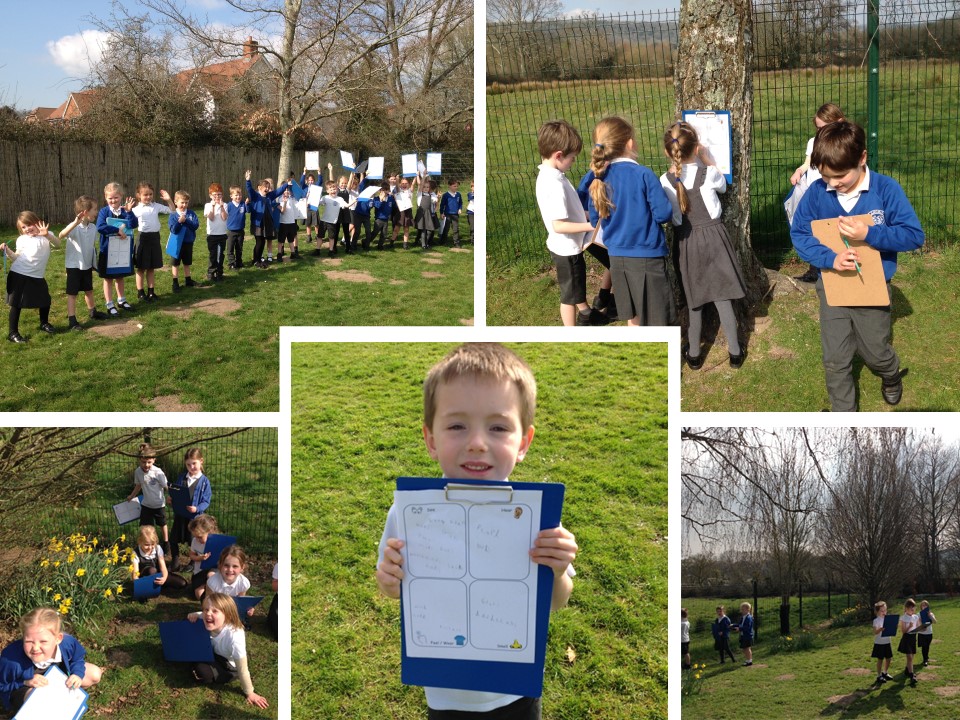
With the vernal equinox last week heralding the official arrival of spring, we headed outside this week to see what changes we could notice around the school grounds to show that the season of new life really was here.
Not only did we enjoy the spring sunshine, we also noticed daffodils and daisies amongst the freshly mown grass, buds growing on the trees, and sheep in the fields ready for lambing season. The children made notes and took photos before comparing their findings back in the classroom.
What signs of spring did your child spot?
Week 25 - Marvellous measuring, wonderful word processing and perfect percussion
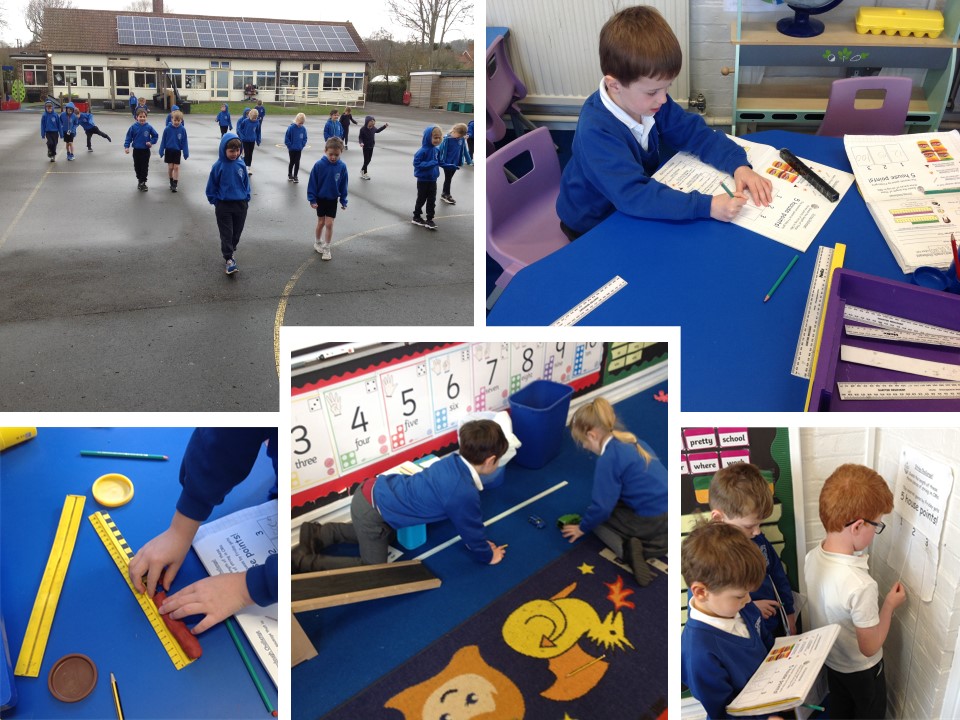 In Maths, we've just finished the first of our units on measurement, looking in particular at Length and Height.
In Maths, we've just finished the first of our units on measurement, looking in particular at Length and Height.
The hands-on challenges included measuring in both standard and non-standard units, including finding out how many paces wide the playground is, as well as comparing their own height in centimetres to those of different animals. The children also had to answer the age-old question 'How long is a piece of string?', as well as making Play-Doh sausages to specific lengths and measuring how far a toy car travels when it's sent down a ramp.
Can your child tell you what they found out?
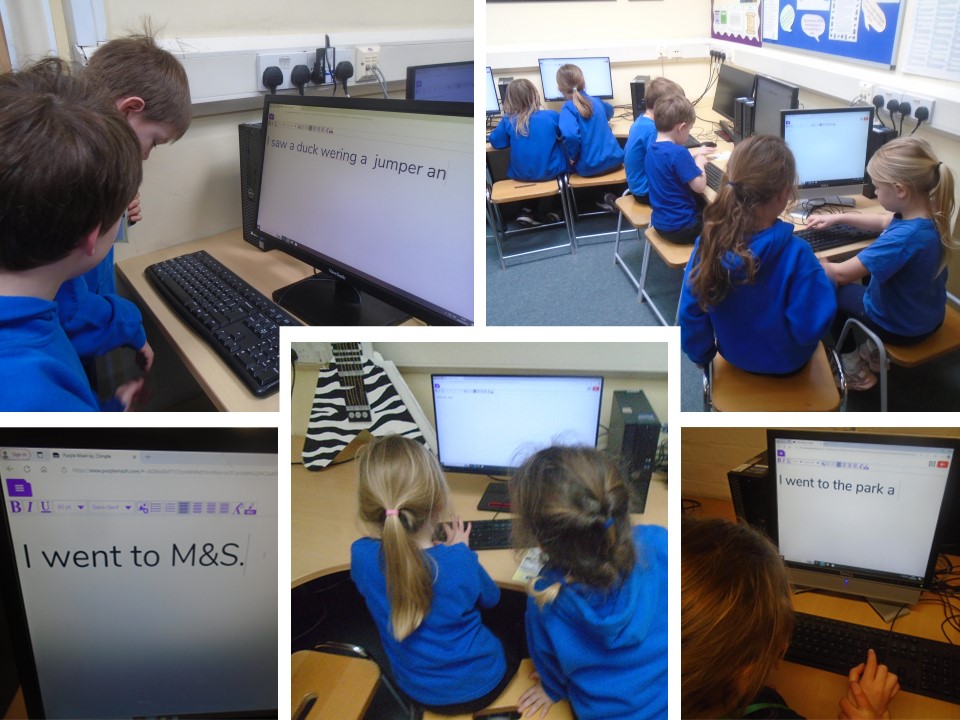 In Computing, we've been using the 2Write programme on Purple Mash to learn about Word Processing.
In Computing, we've been using the 2Write programme on Purple Mash to learn about Word Processing.
The children have been practising their typing, as well as learning how to access capital letters and symbols using the 'Shift' key, and editing their work using both the 'Backspace' and 'Delete' buttons, as well as the arrow keys to move their cursors around the page.
They've also been saving their work and accessing it again later to add to or edit it.
Can your child show you their Word Processing skills on Purple Mash?
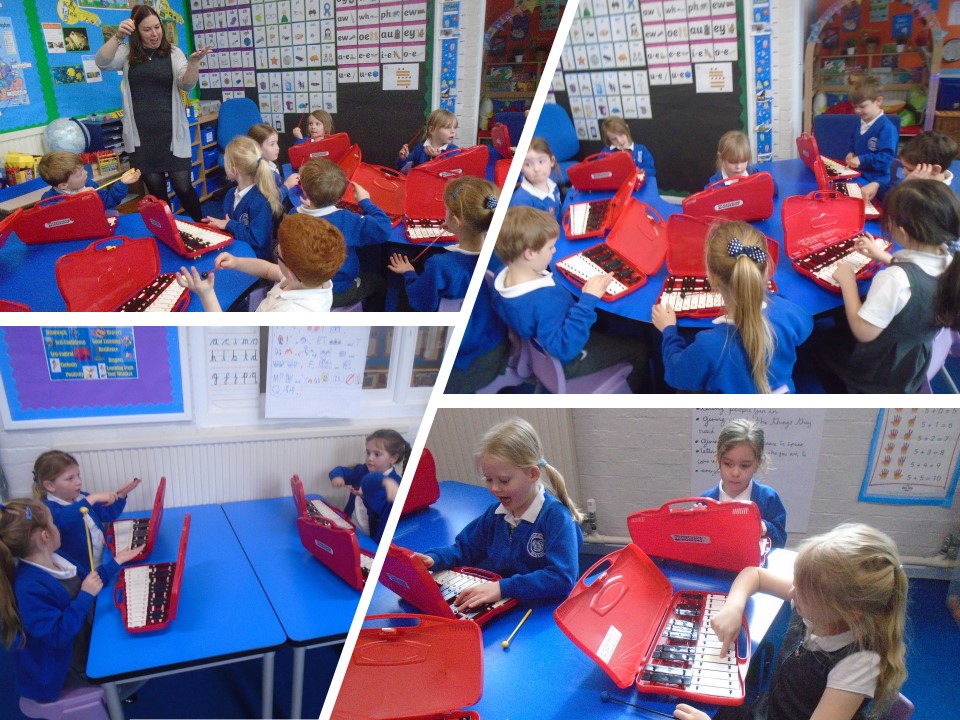 Computer keys aren't the only keys the children have been hitting this week, as the glockenspiels came out for our Music lesson.
Computer keys aren't the only keys the children have been hitting this week, as the glockenspiels came out for our Music lesson.
We started off by using just two notes and tapping them with our fingers to get used to the musical pattern and keeping in time with the beat.
Once mastered, the children then used their beaters to play the glockenspiels properly, and got so good at it that they progressed onto the more challenging three-note pattern. It was so impressive, even our head of Music Mrs Lawry had to come by to enjoy a performance!
Week 24 - Awesome athletes, telling Toby's tale and recording reefs
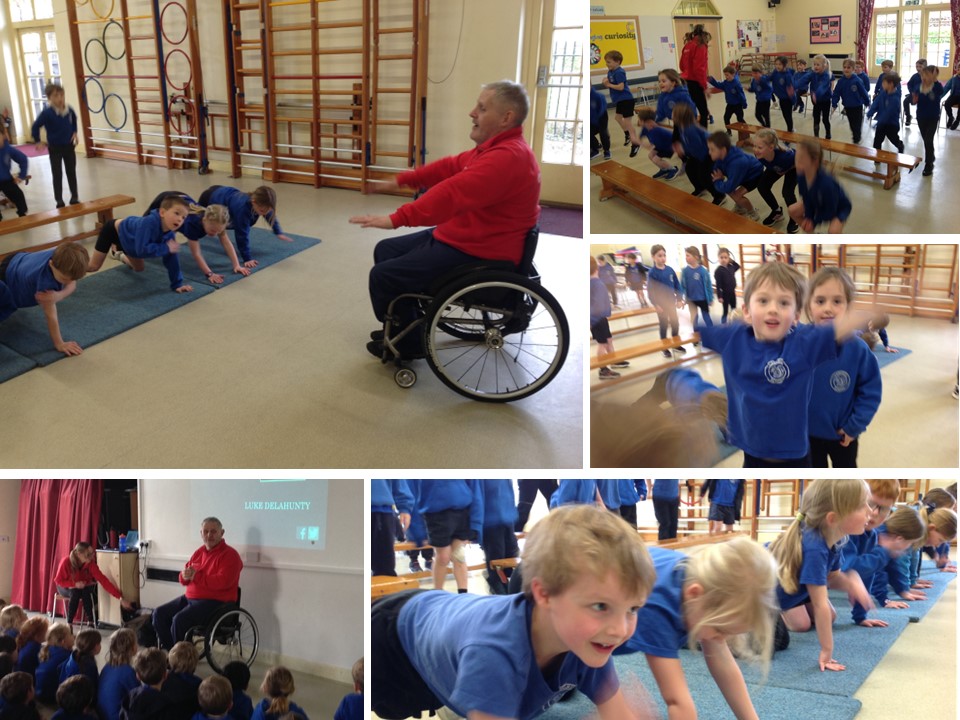 On Tuesday, Team GB Invictus Games athlete Luke Delahunty came in to put the children through their paces as part of the Great Athletes programme, designed to inspire children to get into sport. After a very active session in which the children did a range of activities, including star jumps, press-ups and running on the spot, Luke led an assembly talking about his life before and after becoming paralysed, and demonstrating to the children that it has not stopped him taking part in sports, flying planes, and even swimming with sharks!
On Tuesday, Team GB Invictus Games athlete Luke Delahunty came in to put the children through their paces as part of the Great Athletes programme, designed to inspire children to get into sport. After a very active session in which the children did a range of activities, including star jumps, press-ups and running on the spot, Luke led an assembly talking about his life before and after becoming paralysed, and demonstrating to the children that it has not stopped him taking part in sports, flying planes, and even swimming with sharks!
Ask your child about their day with a Great Athlete.
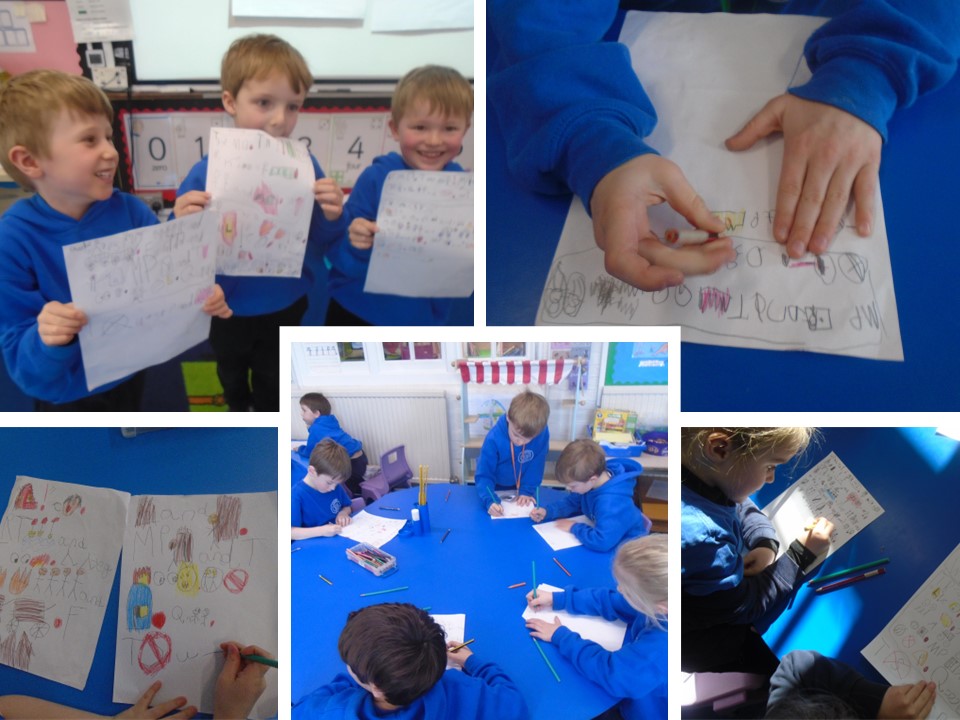 Our current English unit ties in nicely with our History topic of The Great Fire of London, as it's inspired by the story 'Toby and the Great Fire of London' by Margaret Nash and Jane Cope. Using the Talk for Writing process, we went through the book sentence by sentence, drawing pictures to remind us of what happens in the story. The children then used their story maps to learn the story by heart, using actions to go along with the pictures. Once learnt, the children finally got to write the story in their English books, including some tricky use of inverted commas for speech.
Our current English unit ties in nicely with our History topic of The Great Fire of London, as it's inspired by the story 'Toby and the Great Fire of London' by Margaret Nash and Jane Cope. Using the Talk for Writing process, we went through the book sentence by sentence, drawing pictures to remind us of what happens in the story. The children then used their story maps to learn the story by heart, using actions to go along with the pictures. Once learnt, the children finally got to write the story in their English books, including some tricky use of inverted commas for speech.
Can your child tell you the story of 'Toby and the Great Fire of London'?
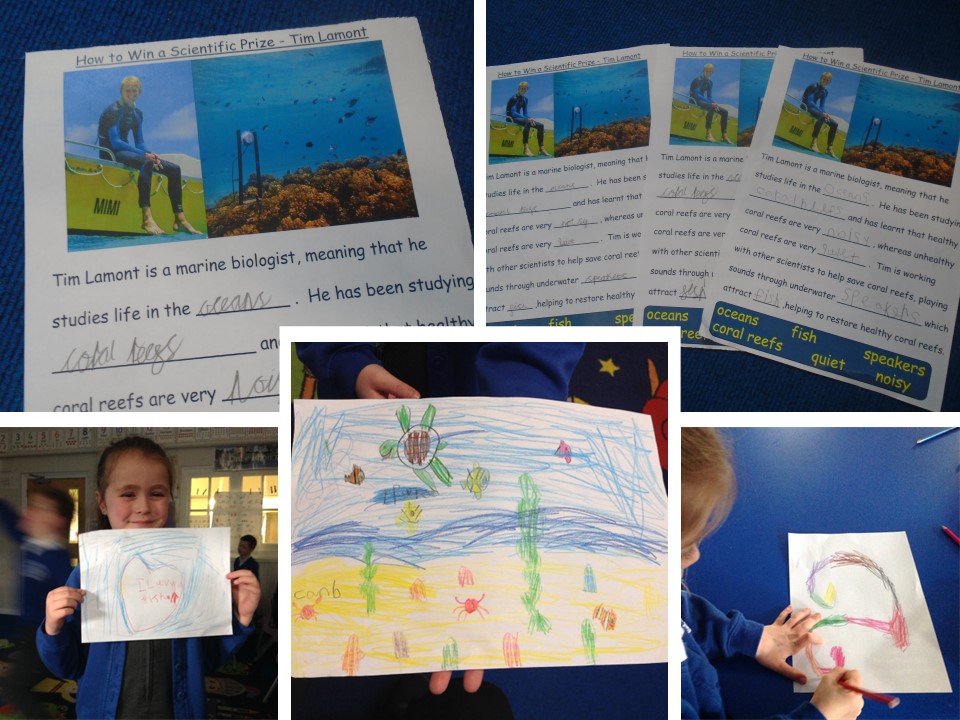 Our People Project this term is looking at How to Win a Scientific Prize. Winner of the 2022 John C. Marsden Medal for his groundbreaking work on restoring coral reefs, Year 1 have been learning all about marine biologist Tim Lamont.
Our People Project this term is looking at How to Win a Scientific Prize. Winner of the 2022 John C. Marsden Medal for his groundbreaking work on restoring coral reefs, Year 1 have been learning all about marine biologist Tim Lamont.
We began by learning about Tim's work and listening to his recordings of healthy and unhealthy coral reefs. Inspired by this, we then created some artwork by listening to the sounds of the oceans, creating patterns, squiggles or even drawings of sea creatures inspired by the ocean soundscape.
Ask your child about Tim Lamont and how they plan on winning a scientific prize.
Week 23 - Hurrah for history, wonderful World Book Day and rip-roaring rocking out
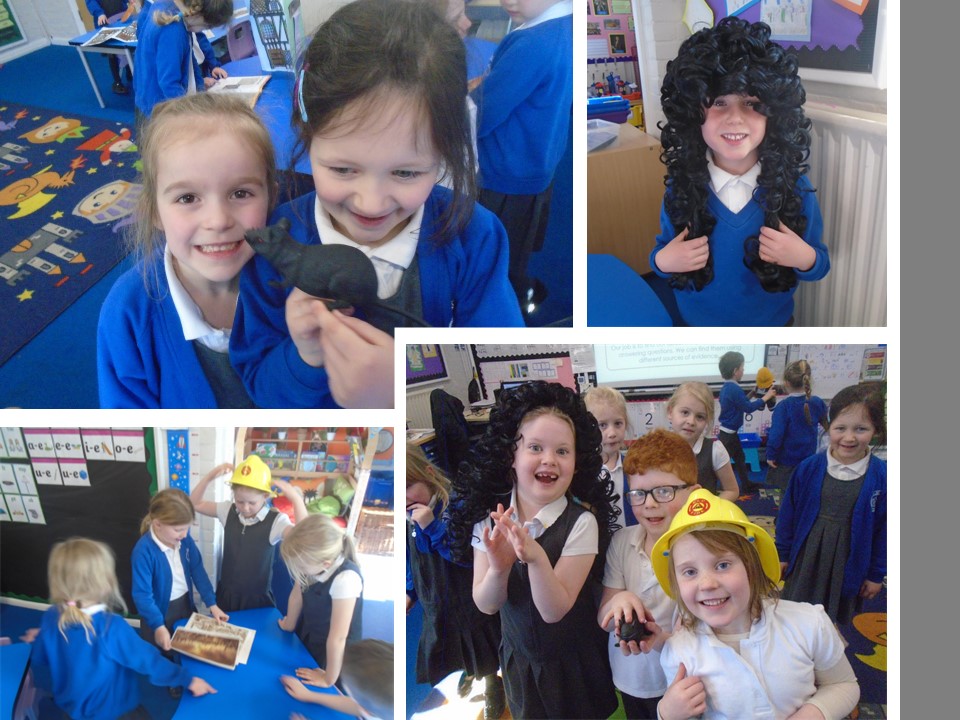
We launched our Great Fire of London learning this week with a mystery table packed with books, objects and pictures that all linked to our latest History topic. The children had a great time trying on wigs, using quill pens, and trying to figure out how rats, bread rolls and Parmesan cheese could possibly have anything to do with the events of 1666.
We also investigated how London looked before it was ravaged by fire and found out about some of the reasons why the flames were able spread so far and cause so much damage.
Can your child tell you about any of the items, and what they had to do with the Great Fire of London?
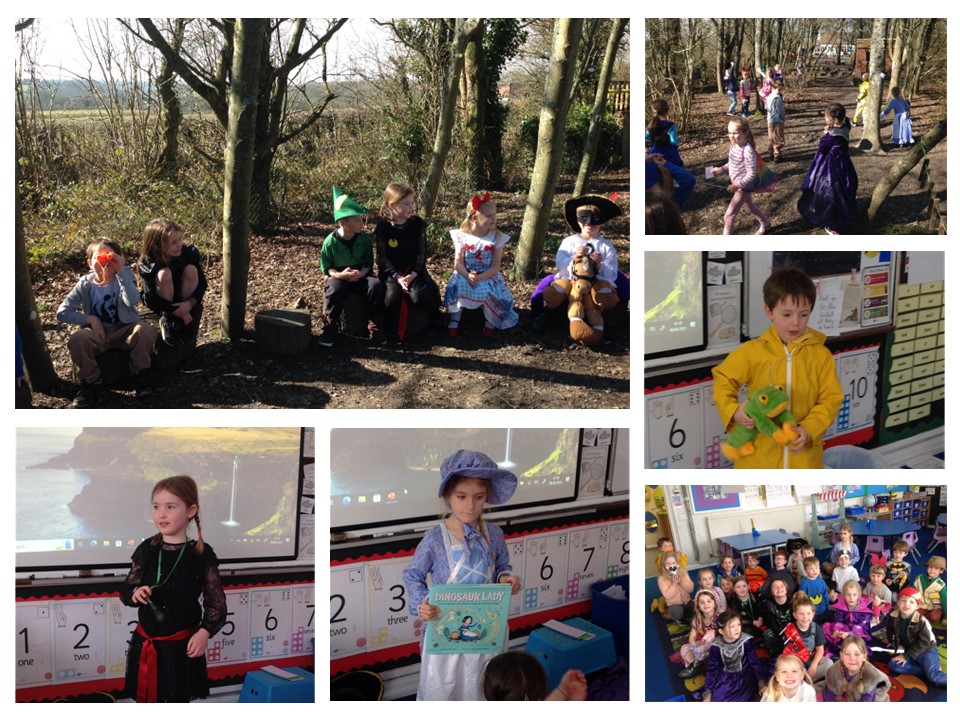
It won't have escaped your attention that Thursday was World Book Day, so all sorts of exciting characters came into the classroom!
The children had a fabulous day celebrating all things literary, including designing personalised bookmarks, doing a fairytale-themed treasure hunt out in the copse and admiring the amazing costumes worn by children (and teachers!) across the whole school. Finally, the children took part in a character "battle", with each child talking about their own characters, what they liked about them, and why they had chosen to come dressed as them.
What did your child say about their favourite character?
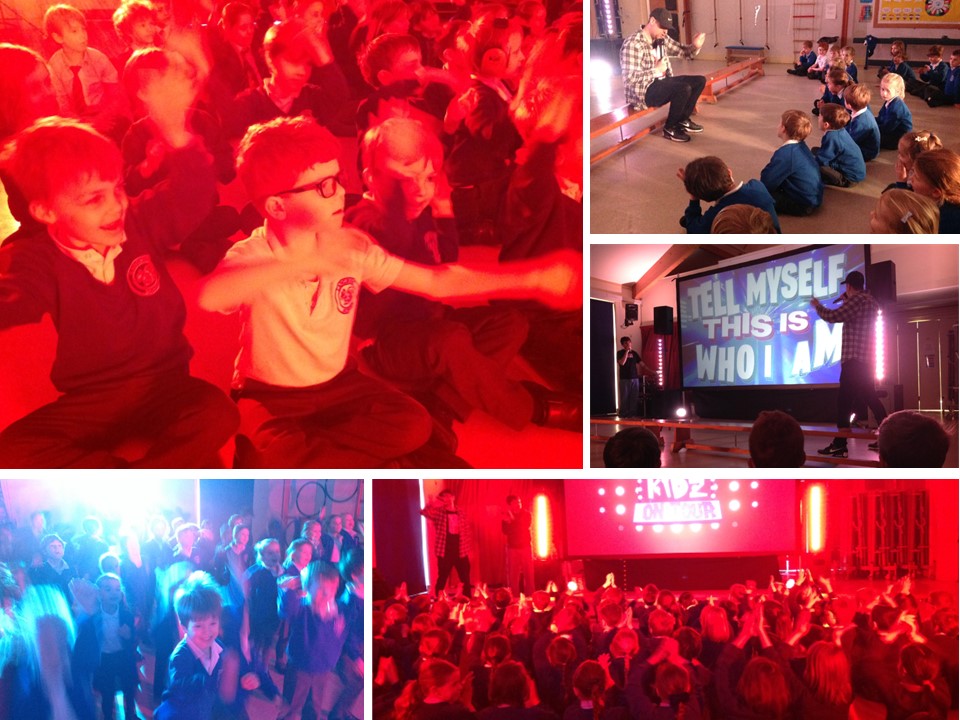
If World Book Day hadn't provided enough excitement for one week, the next day Rock Kidz came into school to turn everybody into rock stars for the day.
Carrying a strong anti-bullying message about the importance of being yourself, the session featured a rocking warm-up, a pop video, and a song to learn ready to sing with the rest of the school at the Rock Kidz Afterparty.
There was also an eye-watering kids vs teachers dance battle (all photographic evidence of which has hopefully been deleted!)
What was your child's favourite thing about being a rock star?
Week 22 - Scientific sorting, a swinging surprise and popular pop-up books
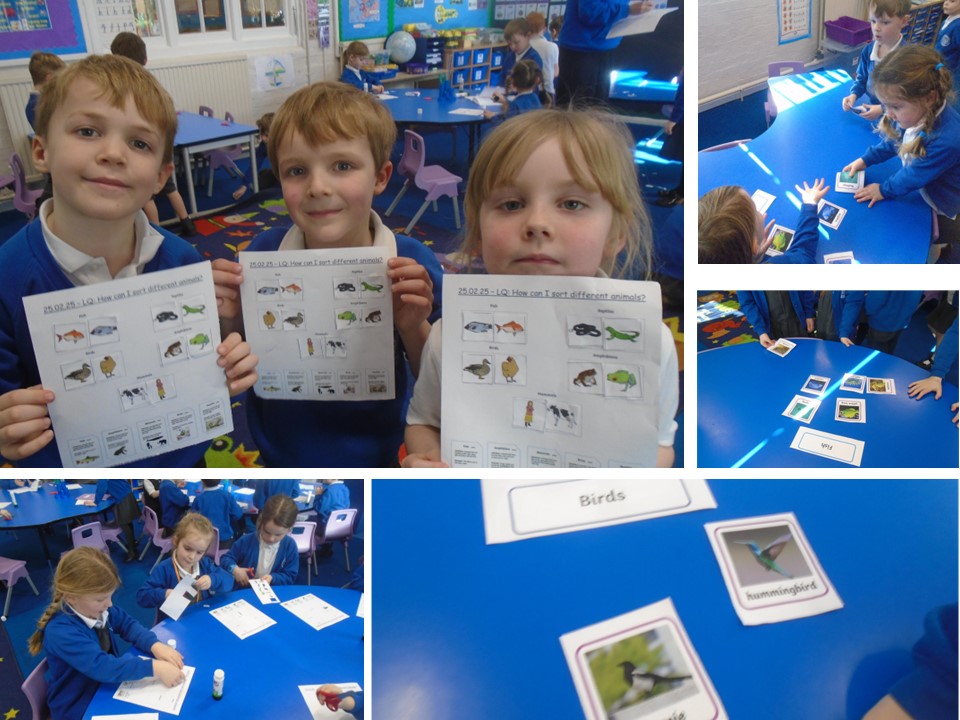
In Science this term, we're looking at how animals (including humans) survive. We began by exploring different families of animals, and having categorised animals according to their diets last term, we turned our attention to a different type of classification, this time by sorting animals into mammals, fish, birds, reptiles and amphibians.
After discussing the characteristics each animal family shares, it was up to the children to sort pictures of animals into the correct groups, first working as a team and finally working individually in their books.
Can your child tell you about mammals, fish, birds, reptiles and amphibians?
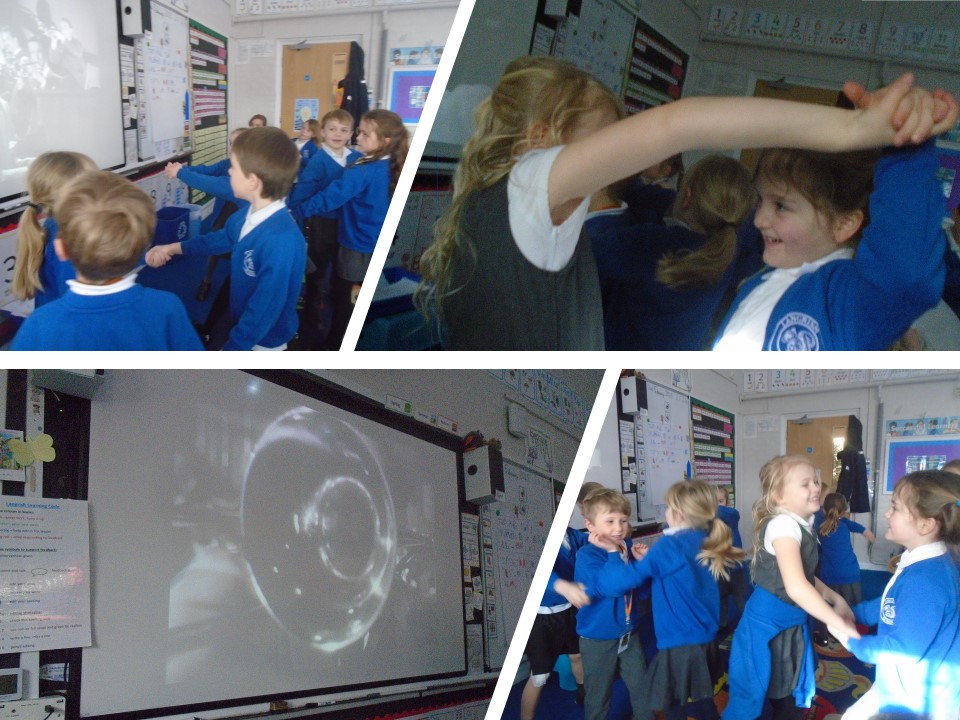 In Music, we explore many different styles and genres in order to give the children as wide a musical vocabulary as possible. This week, our Charanga song about the days of the week was in a jazz big band swing style. Curious to find out more, we ended up watching Glenn Miller and his band perform 'In the Mood' in the 1941 musical 'Sun Valley Serenade' (starring Norwegian Olympic skating champion turned actress Sonja Henie). The children absolutely loved it, and spontaneously turned the carpet into a dance floor, demonstrating some amazing swing dance moves!
In Music, we explore many different styles and genres in order to give the children as wide a musical vocabulary as possible. This week, our Charanga song about the days of the week was in a jazz big band swing style. Curious to find out more, we ended up watching Glenn Miller and his band perform 'In the Mood' in the 1941 musical 'Sun Valley Serenade' (starring Norwegian Olympic skating champion turned actress Sonja Henie). The children absolutely loved it, and spontaneously turned the carpet into a dance floor, demonstrating some amazing swing dance moves!
Watch the clip by clicking here if you'd like a repeat performance.
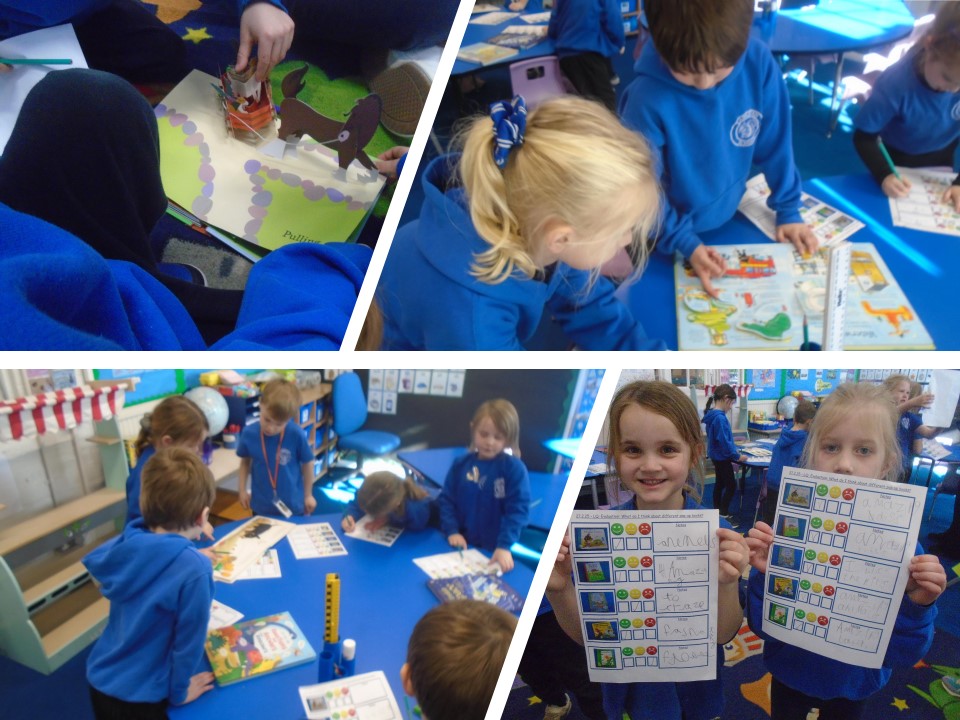 We began our Design & Technology unit this week by looking at books with moving elements.
We began our Design & Technology unit this week by looking at books with moving elements.
The children had the opportunity to explore a wide range of titles, from lift-the-flap books and 3D pop-up books, to books with sliders and wheels, and even a book by renowned 'paper engineer' Robert Sabuda called 'Ten Horse Farm'. Their task was to evaluate the books, saying whether or not they liked them, and making notes about what they enjoyed or disliked about the different examples.
Which were your child's favourites? Do they have any favourite pop-up books at home?
Week 21 - Spotting scams, researching realism and clever calculations
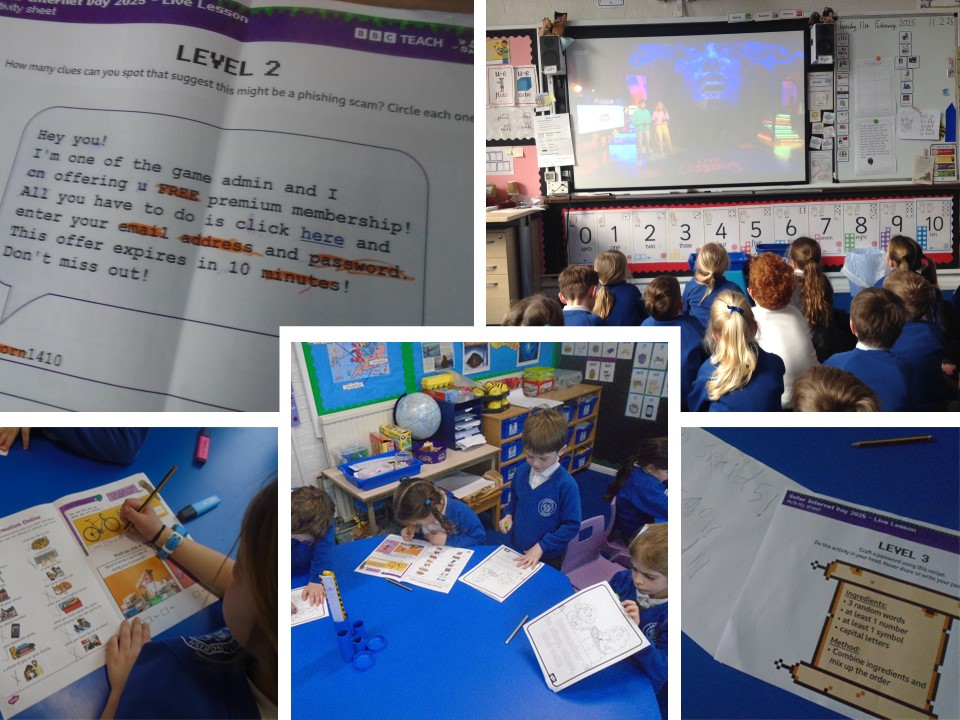
Tuesday was Safer Internet Day, and we celebrated with a range of activities across the school.
This year's theme was 'Too Good to be True' and was all about spotting and avoiding online scams.
We took part in the BBC's Live Lesson, playing along with the 'Scam Smashers' game by spotting fake offers, recognising all the hallmarks of a phishing email, and creating strong passwords to protect our personal information.
Ask your child about our Safer Internet Day activities.
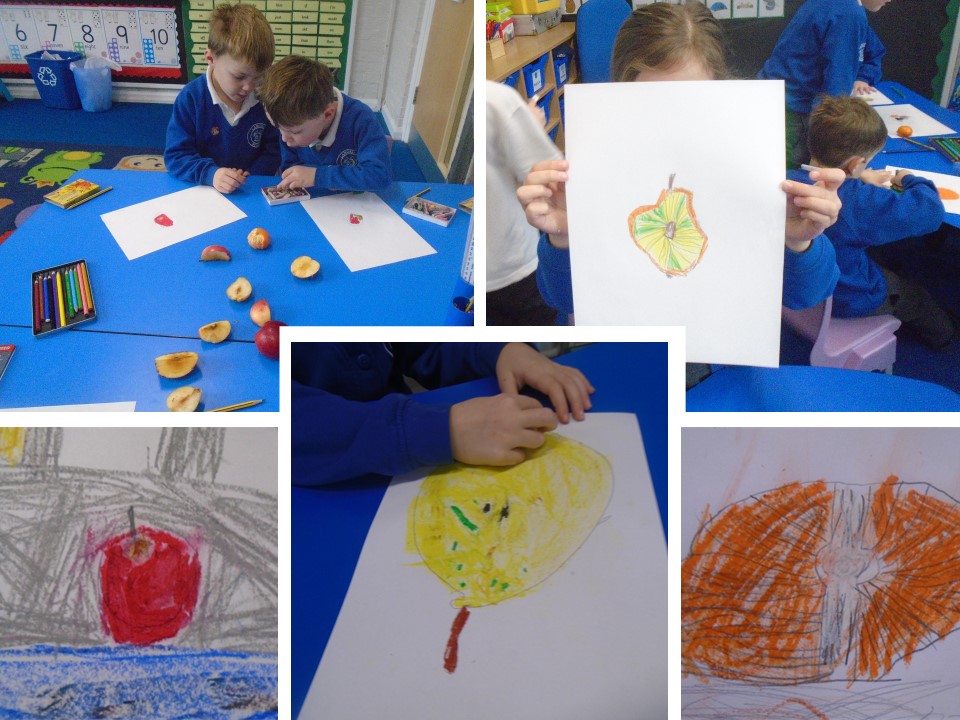 Alongside Safer Internet Day, this week also marked the National Gallery's 'Take One Picture' week. At Langrish, instead of taking one picture, each class was given a style or period of art to explore, and in Year 1 it was Realism. We began by looking at some famous Realist artworks and talking about how they portray ordinary, everyday people and events in realistic detail. We then chose some objects around the classroom to draw in a Realist style, before adding colour using oil pastels or watercolours, depending on which the children wanted to use.
Alongside Safer Internet Day, this week also marked the National Gallery's 'Take One Picture' week. At Langrish, instead of taking one picture, each class was given a style or period of art to explore, and in Year 1 it was Realism. We began by looking at some famous Realist artworks and talking about how they portray ordinary, everyday people and events in realistic detail. We then chose some objects around the classroom to draw in a Realist style, before adding colour using oil pastels or watercolours, depending on which the children wanted to use.
Can your child tell you about their Realist masterpiece?
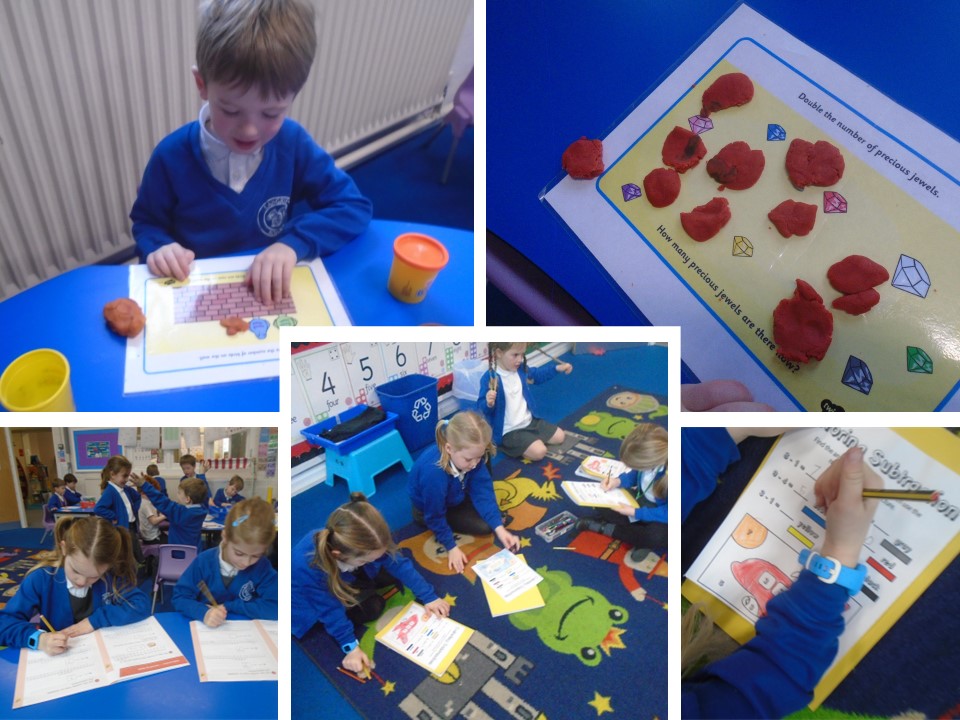
In Maths, we've come to the end of our look at adding and subtracting within 20.
As ever, it's been a very practical subject, with the children making doubles and halves using Play-Doh, solving calculations in order to colour pictures according to the answers, and using practical resources to explore different methods of solving calculations. These have included using doubles and near doubles, as well as number bonds and the commutative law.
Your child's class workbook and home learning booklet will both be coming home; can your child talk you through their learning?
Week 20 - Terrific trees, amazing atlases and who can help?
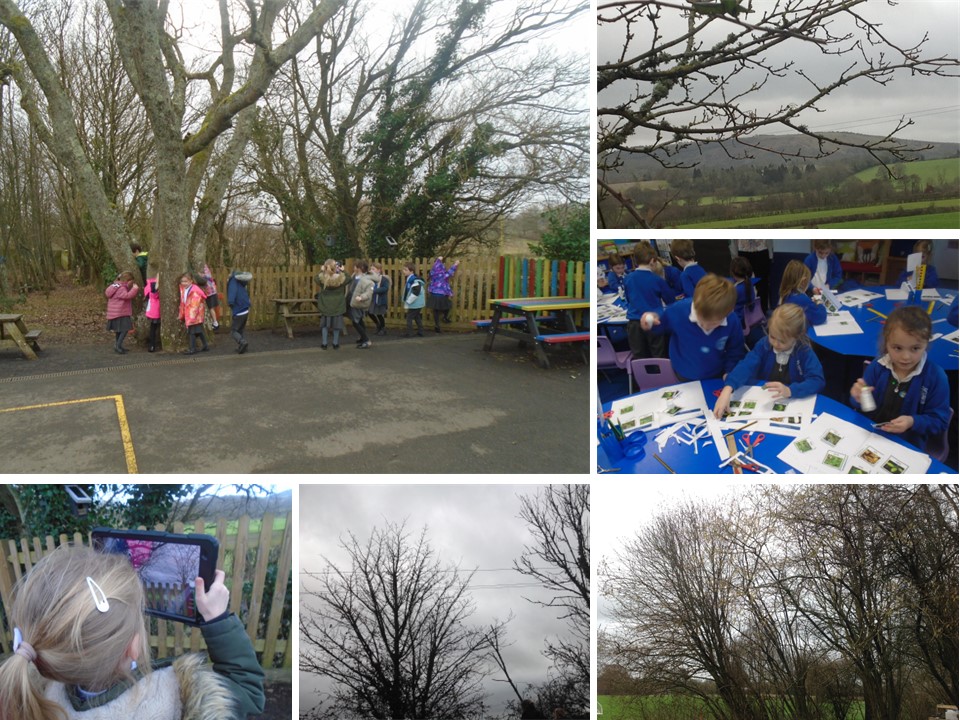 In Science, we're looking at the seasons. Having learnt about how some animals survive the changing seasons by hibernating or migrating, our thoughts this week turned to living things that can't move somewhere warmer - trees. We talked about the difference between deciduous and evergreen trees, then went out into the school grounds to see which were the most common in our immediate environment. The children took some photos on the iPad, then sorted some pictures of trees according to whether they were deciduous or evergreen.
In Science, we're looking at the seasons. Having learnt about how some animals survive the changing seasons by hibernating or migrating, our thoughts this week turned to living things that can't move somewhere warmer - trees. We talked about the difference between deciduous and evergreen trees, then went out into the school grounds to see which were the most common in our immediate environment. The children took some photos on the iPad, then sorted some pictures of trees according to whether they were deciduous or evergreen.
Can your child tell you about deciduous and evergreen trees? Which do you have near you?
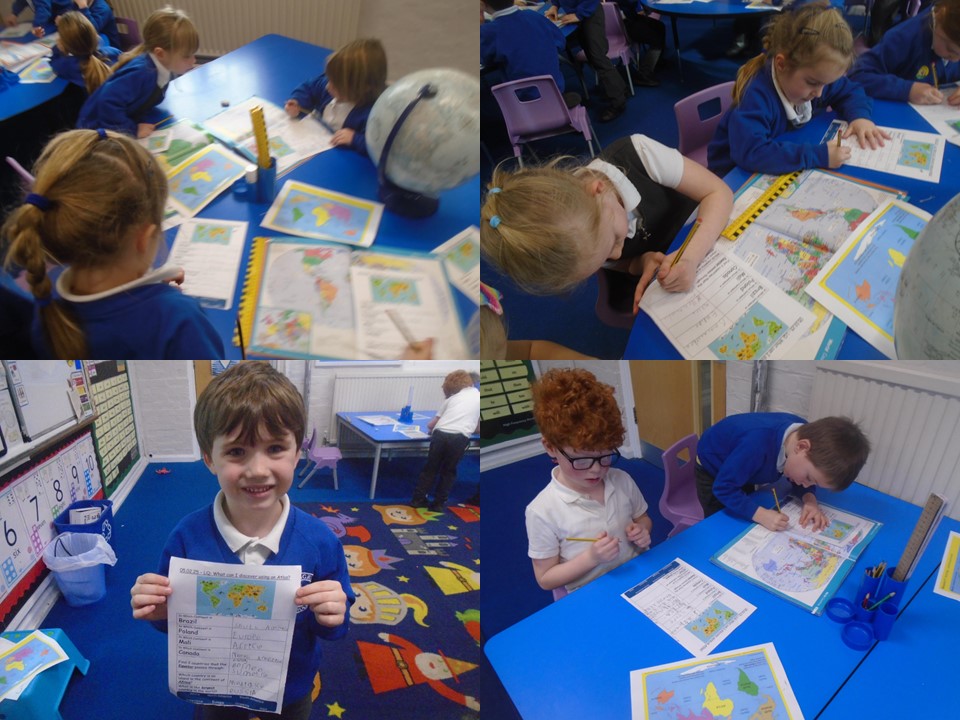 The Atlases came out again in Geography this week. We've been looking at the seaside, and in particular the coastal town of Wembury in Devon. To see where Wembury is in the world, we went on a geographical journey through towns, counties, countries, continents and oceans, before the children took on a number of challenges using their Atlases.
The Atlases came out again in Geography this week. We've been looking at the seaside, and in particular the coastal town of Wembury in Devon. To see where Wembury is in the world, we went on a geographical journey through towns, counties, countries, continents and oceans, before the children took on a number of challenges using their Atlases.
Among their tasks was to find out on which continents specific countries could be found, to track down three of the eleven countries that the Equator passes through, and to work out which was the largest country in the world by area.
Which geographical facts does your child remember?
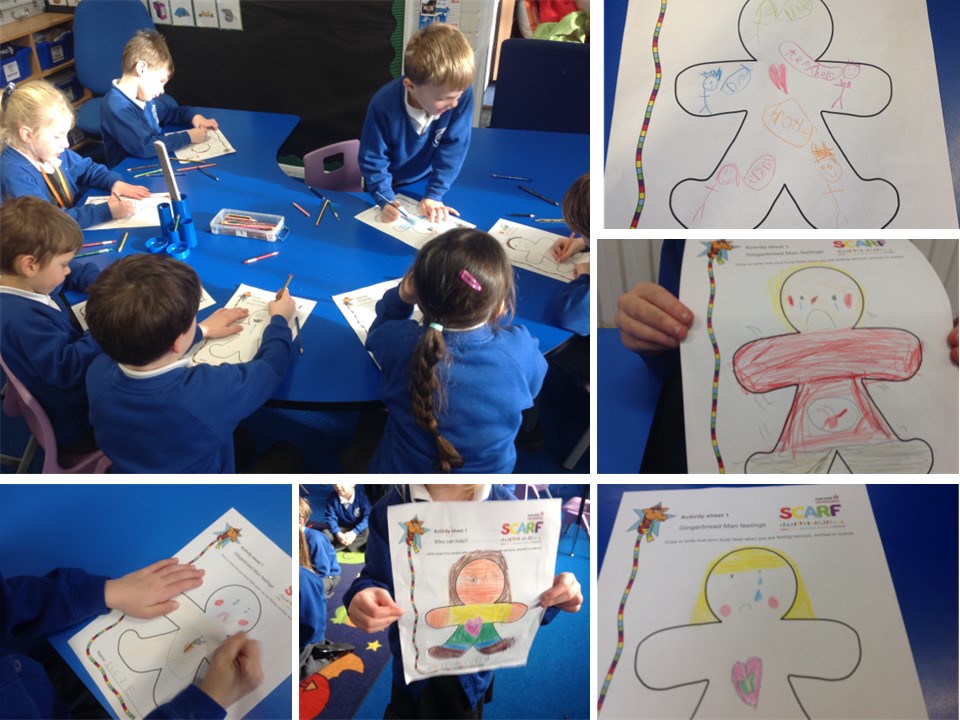 Following the SCARF curriculum, and linking to Children's Mental Health Week, we continued our exploration of keeping ourselves safe and healthy in PSHE.
Following the SCARF curriculum, and linking to Children's Mental Health Week, we continued our exploration of keeping ourselves safe and healthy in PSHE.
This week, we talked about what happens to our bodies when we're scared or nervous, and the children illustrated a figure with things like tears, butterflies in their tummies or clammy palms.
They then discussed who was there to help them if ever they felt anxious, nervous or scared, and drew pictures of the friends or trusted adults they could turn to for help, including mummies, daddies, teachers and grandparents.
Week 19 - Careful coding, jumping in the gym and a dose of double digits
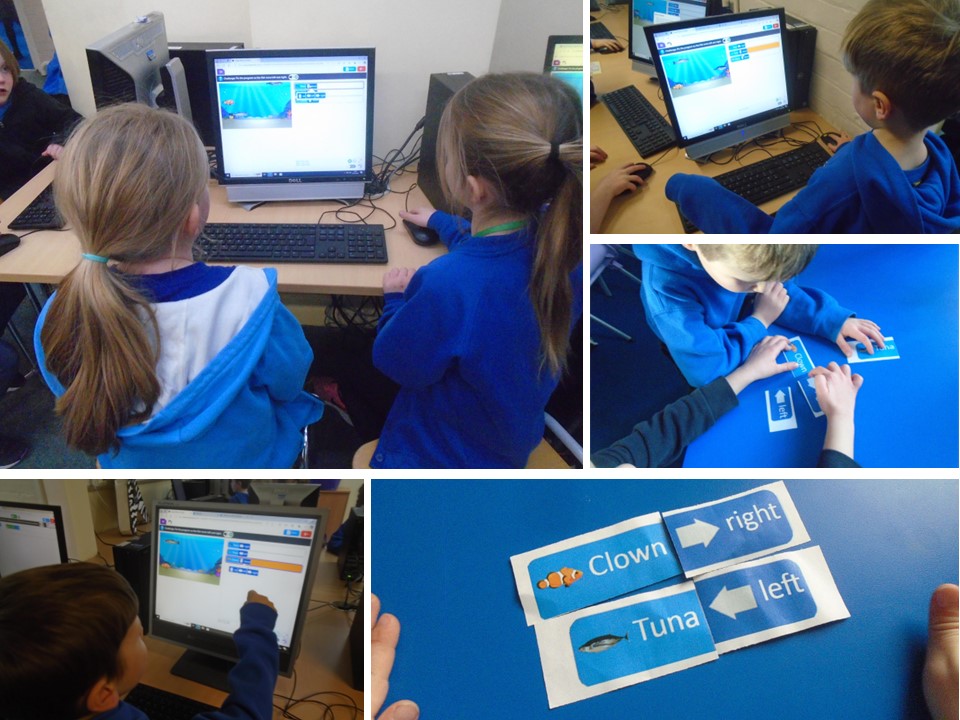
In Computing, we started looking at coding and algorithms earlier in the year using Beebots. This term, we've moved onto the computers, using the block coding system 2Code on Purple Mash.
First, we looked at objects and actions within a program, using printed paper blocks to combine the object (a fish) and an action (go left or right) into an algorithm. We then went onto the computers to put our coding skills into practise, making the fish move across the screen, and even debugging programs when they didn't do what we wanted them to do.
Maybe you could log in to Purple Mash at home and try it for yourself!
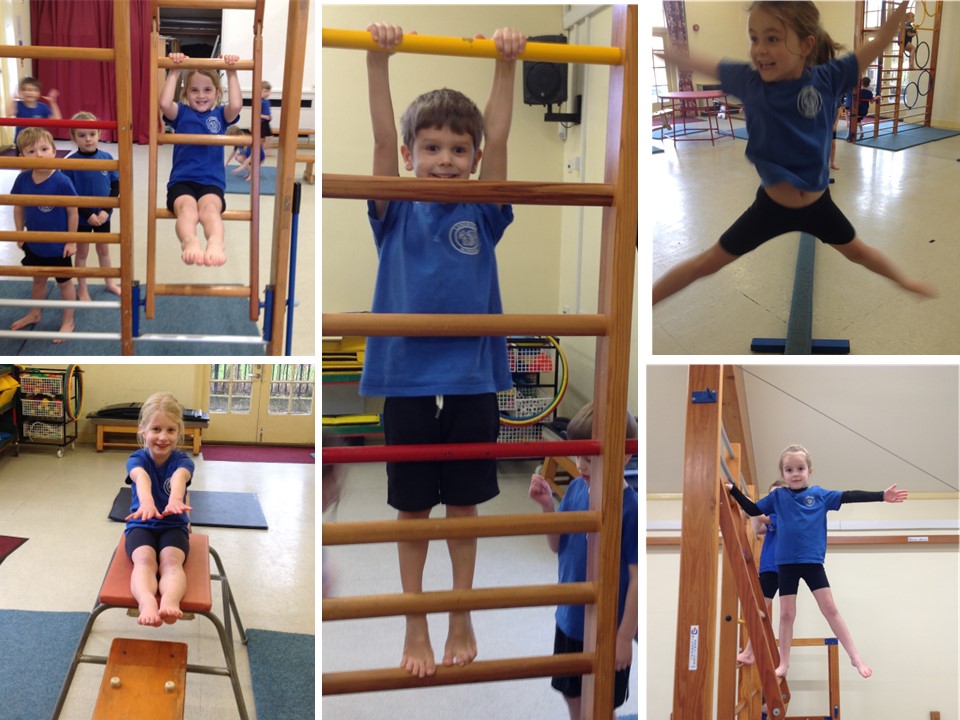
The children have really enjoyed using the gym equipment in P.E. over the past few weeks.
They've been showing off their balancing skills on the wall bars as well as on the floor equipment. This involves using their core strength and coordination in order to climb, balance and hold different poses and positions, all under the watchful eye of Mr James.
It's great for building the children's confidence as well as their strength, and there's always a ripple of excitement when they go into the hall and see what's in store!
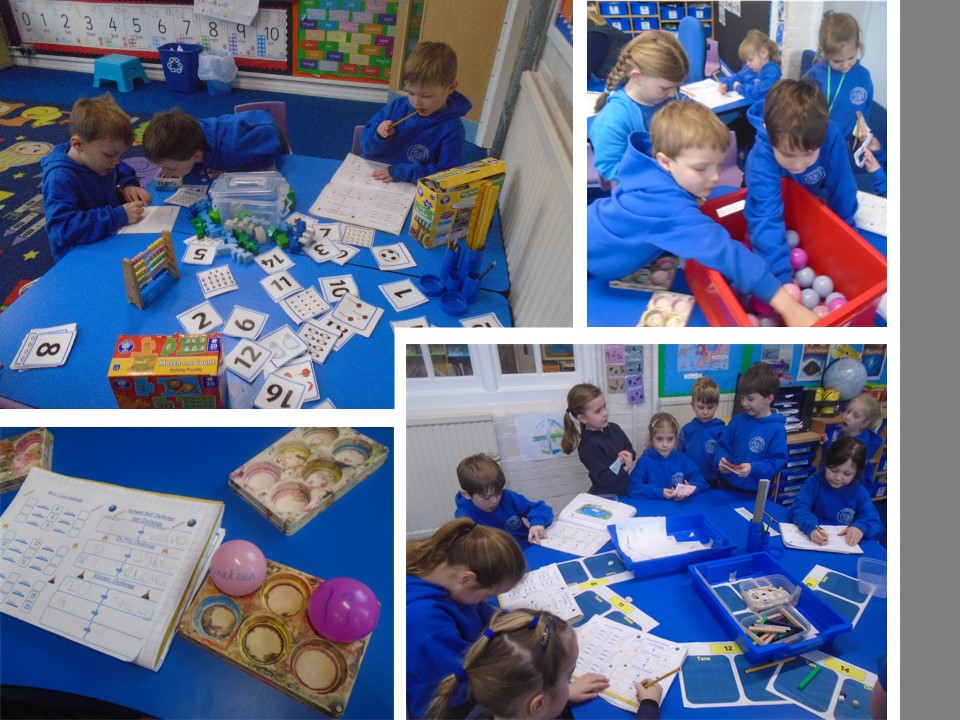
In Maths, we've come to the end of our look at number and place value up to 20.
Using lots of fun, hands-on activities, the children have really enjoyed getting to grips with two-digit numbers, including recognising them as numbers, words and pictorial representations. It will stand them in good stead for our next unit, in which we'll be using our knowledge of place value to look at strategies for adding and subtracting numbers within 20.
Can your child talk you through their class workbook or home learning booklet, both of which have now come home?
Week 18 - Sunny seasides, railway reminders and loving drawn lines
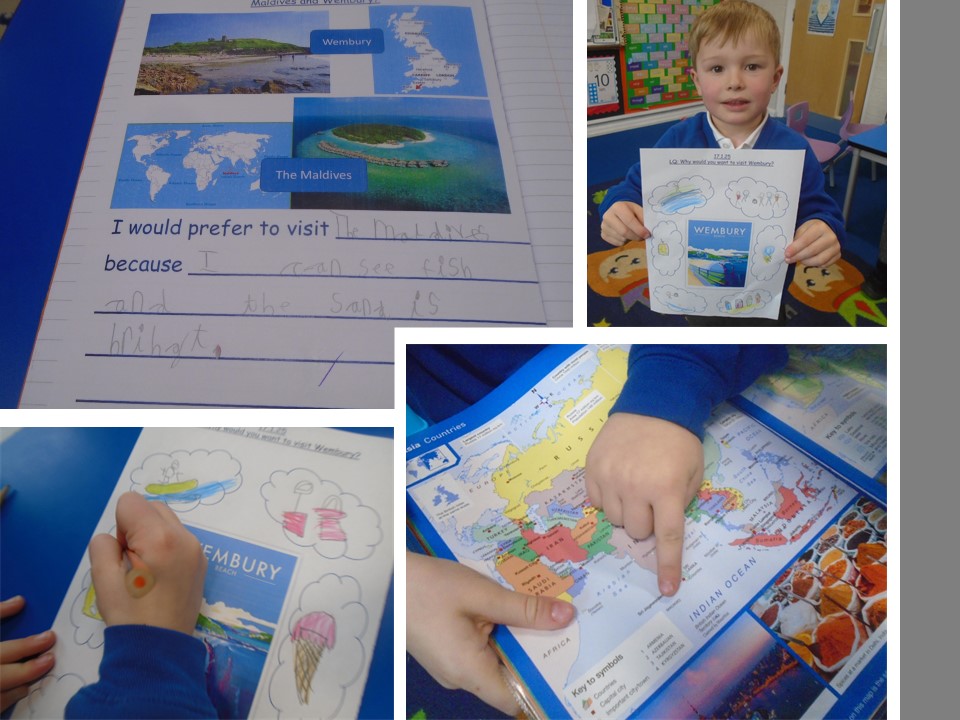 In Geography, we continued our look at the seaside by comparing two very different seaside resorts: the Devon town of Wembury and the Indian Ocean islands of The Maldives.
In Geography, we continued our look at the seaside by comparing two very different seaside resorts: the Devon town of Wembury and the Indian Ocean islands of The Maldives.
We noticed that both had the physical geographical features you'd associate with the coast (beaches, sand, the sea) and there were similar seaside activities on offer (kayaking, swimming, playing in the sand). However, there were some big differences between the two destinations as well!
Ask your child about the different resorts. Which one would they rather visit and why?
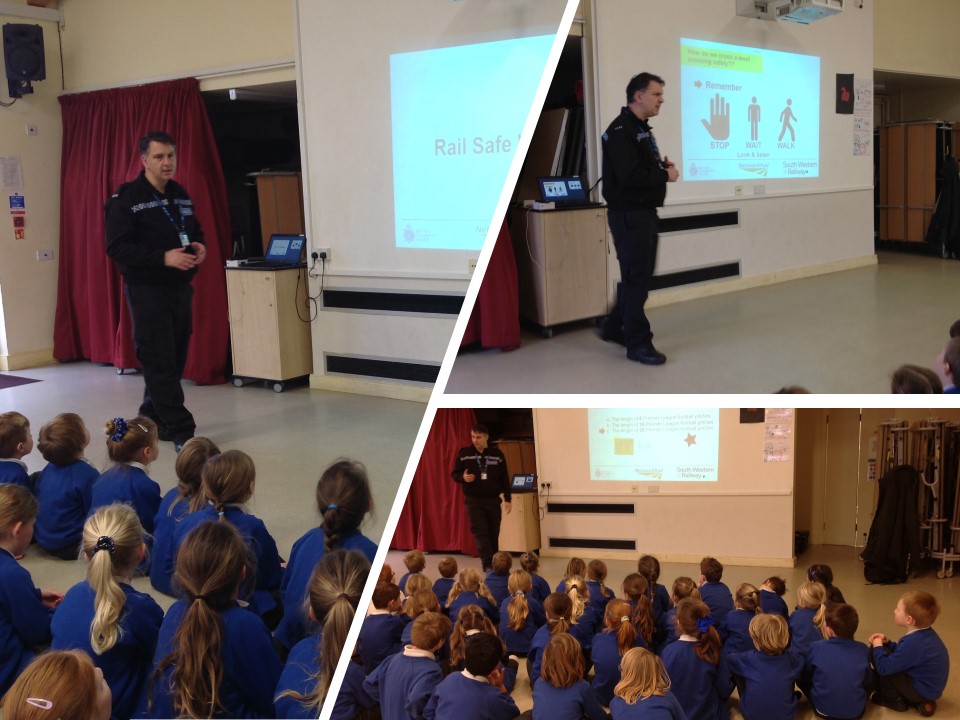 At the end of last week, we were visited by Rail Safety Wessex, who had some important railway safety reminders for the whole school.
At the end of last week, we were visited by Rail Safety Wessex, who had some important railway safety reminders for the whole school.
The session included how to stay safe on the railway platform by staying back behind the yellow line and never trying to retrieve anything that falls onto the track. The children learnt about how fast trains can travel, and how a dangerous electrical current runs through the third rail. They also looked at level crossings, including what the lights and barriers mean, and when it's safest to cross or not to cross.
What rail safety tips can your child tell you about?
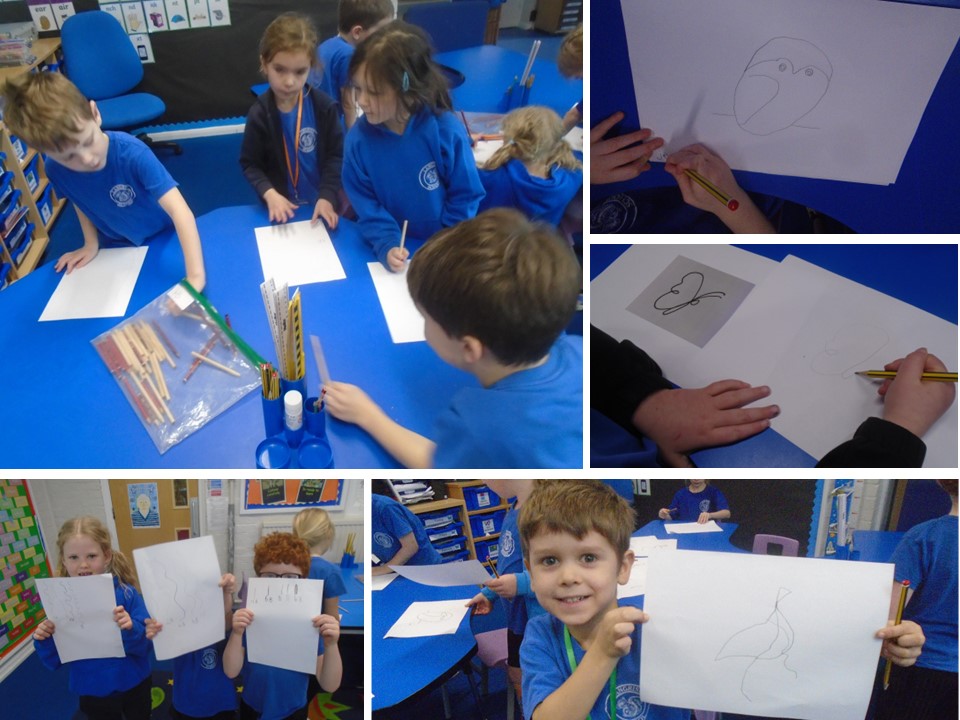 In Art, we were once again looking at the work of Pablo Picasso, this time concentrating on his simple line drawings of animals.
In Art, we were once again looking at the work of Pablo Picasso, this time concentrating on his simple line drawings of animals.
First, we experimented with different grades of pencil to see the difference in the lines created by an HB, a 2B and a 6B pencil. We then looked at Picasso's line drawings and how some of them are created using only one line.
We then had a go ourselves, tracing or copying Picasso's sausage dogs, flamingos, owls, cats and elephants.
Which drawings did your child bring home?
Week 17 - Brilliant bouncing, encountering Cubism and chatting about change
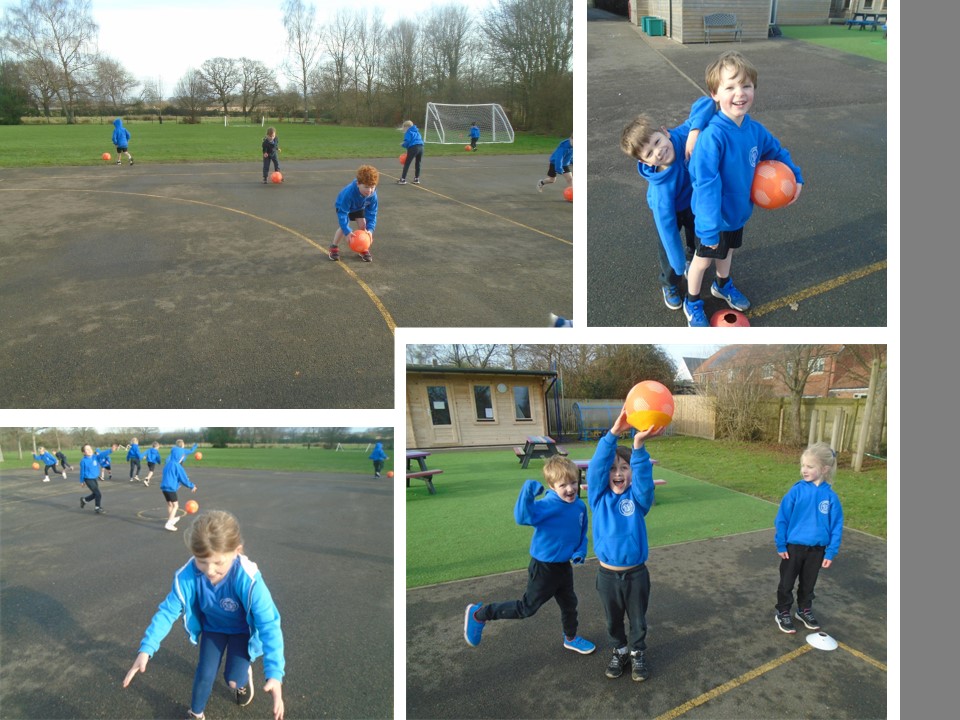
The children have enjoyed putting their speed and coordination skills to the test in P.E. this week using different apparatus in the playground.
They were challenged to work in teams, keeping control of a ball as they bounced it from one side of the playground to the other before passing it to the next member of their team.
It was nice to be outside again after the freezing weather of last week, and the children enjoyed working together as a team, especially getting competitive against the other teams!
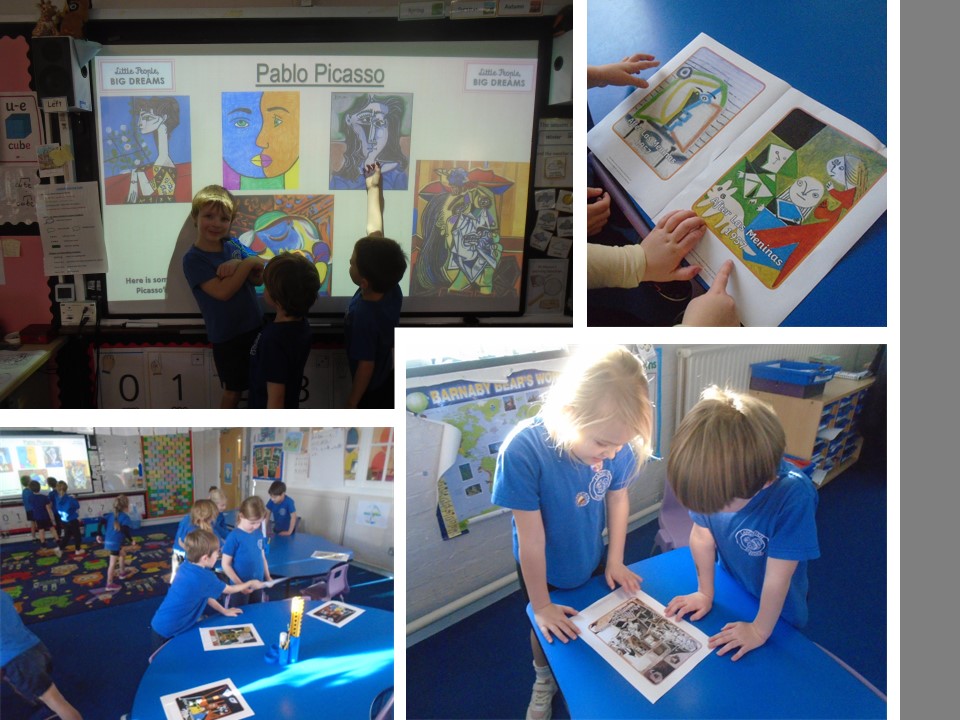
Our Art unit this term looks at the different ways of using line through the works of a particular artist - in our case, Pablo Picasso.
We began by learning a little about the artist himself, looking at his life and the way in which his style changed across the years.
The children looked at lots of different paintings, including Picasso's use of line and colour. They discussed each work, talking about what they liked or didn't like about it...and they definitely had some favourites!
Ask your child what they remember about Pablo Picasso and his paintings.
Our World Faith & Philosophy unit this term looked at change, focusing on Christianity and how Christians believe that Jesus changed the lives of the people he met.
We began by exploring the concept of change, talking about things that do change, things that don't, and things the children would like to change if they got the chance!
We then heard some stories from the Bible, in which Jesus changes people's lives by healing them, or by making them see the error of their ways.
Ask your child what they think about change.
Week 16 - Fabulous Freddie, tackling twenty and Little Red Hens
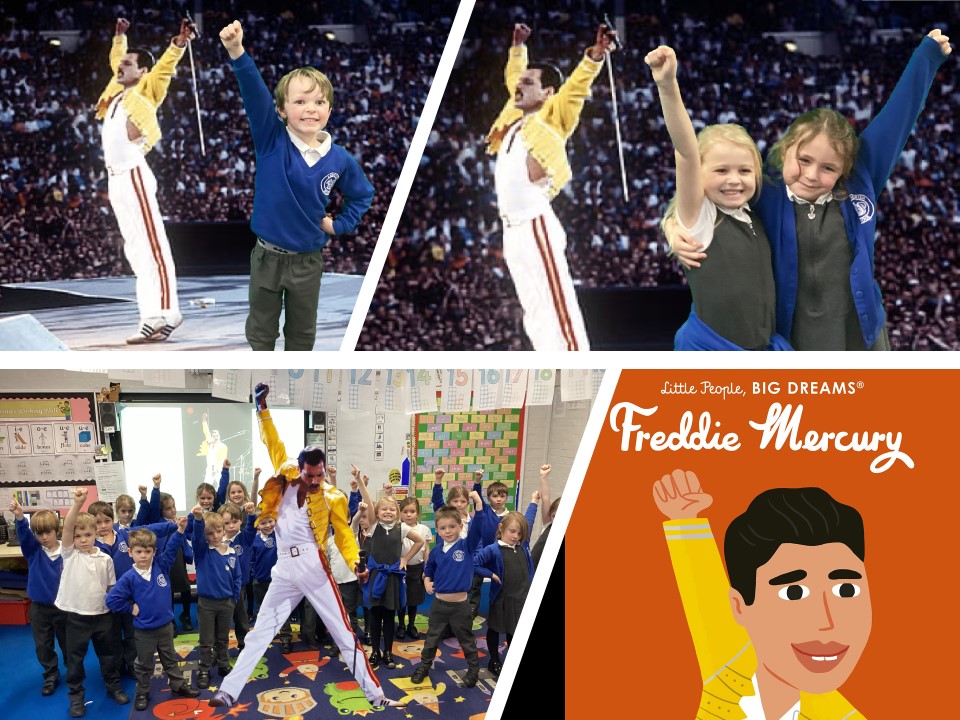
We launched our 'People Project' this week with a focus on 'How to be a Rock Star', and for Year 1 that rock star was Freddie Mercury.
We listened to the music of Queen and learnt about Freddie Mercury's life using the 'Little People, Big Dreams' book. The children watched Queen's Live Aid set from 1985, and we looked at the way Freddie used power poses to make himself look and feel like a rock star. Obviously, we had to try some rock star power poses out for ourselves, and even managed to join Freddie on stage using the green screen.
Ask your child what they remember about Queen and Freddie Mercury.
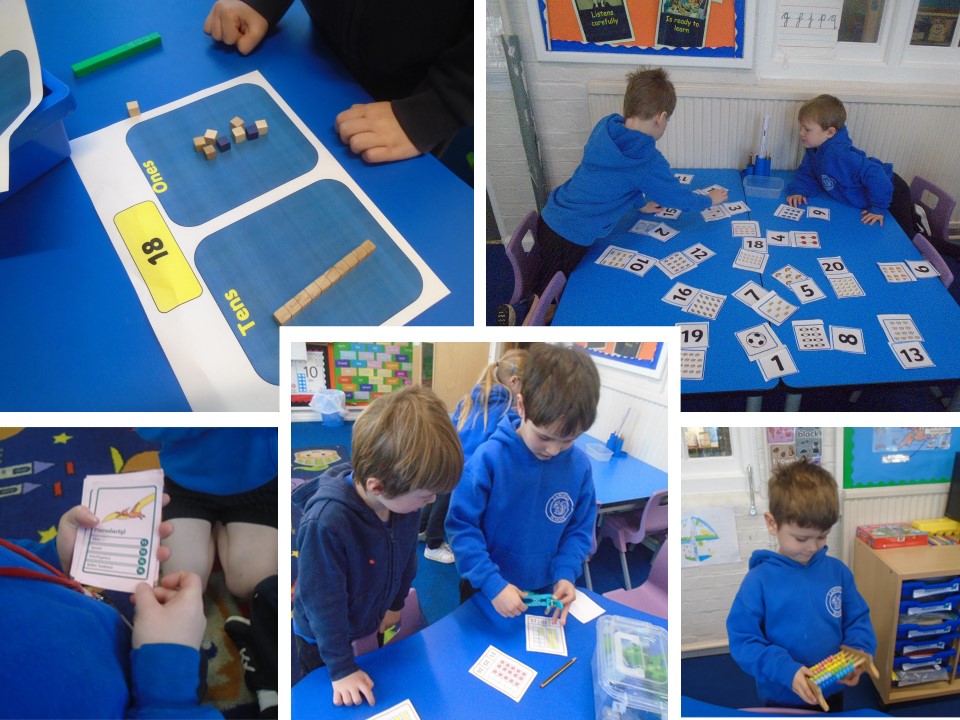
In Maths, we're looking at number and place value up to 20.
This involves taking the numbers and delving into the concept behind each digit, exploring how, for instance, the number 14 is made up of 1 lot of ten and 4 lots of one. Doing this using physical resources, such as Dienes blocks or Numicon, really helps the children to understand the meaning behind each number and their relative values, giving them the building blocks to understand and manipulate larger numbers as they move up through the school.
Can your child recognise, write and tell you about the numbers from 10 to 20?
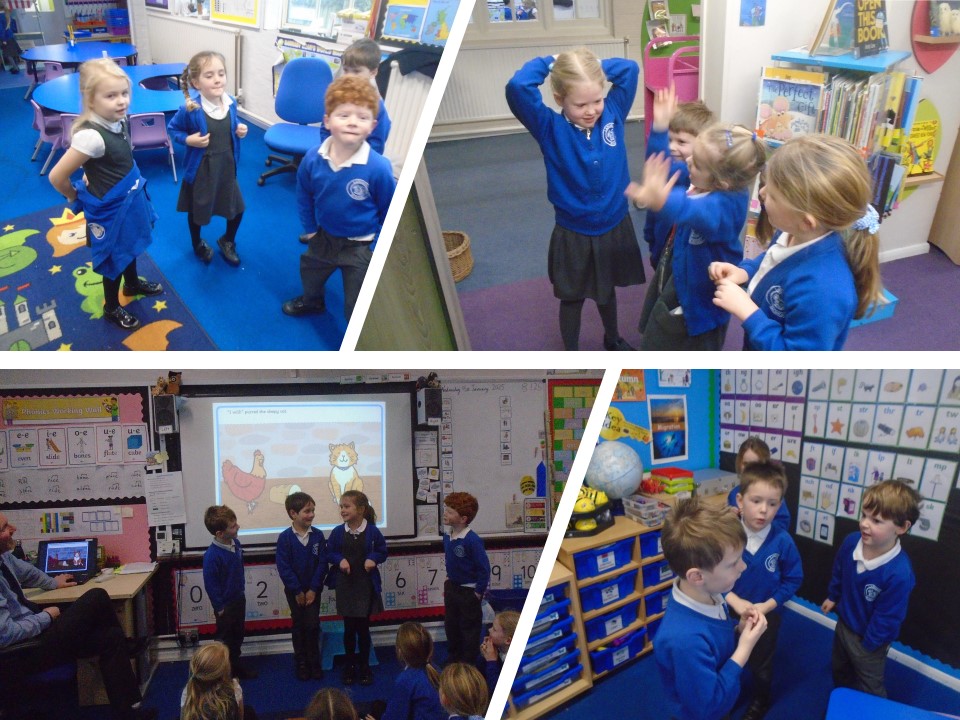
In English, we've begun our next Talk for Writing unit, taking on the traditional tale of the Little Red Hen.
After listening to the story of the industrious Little Red Hen and his lazy friends, the children then broke into groups to retell the story as a short play, taking some time to practise before performing their plays for the rest of the class.
As with all Talk for Writing units, the next step will be to continue embedding the story using story maps and verbal retelling, before finally writing the story in their books.
Can your child tell you the story of the Little Red Hen?
Week 15 - It's Christmas!
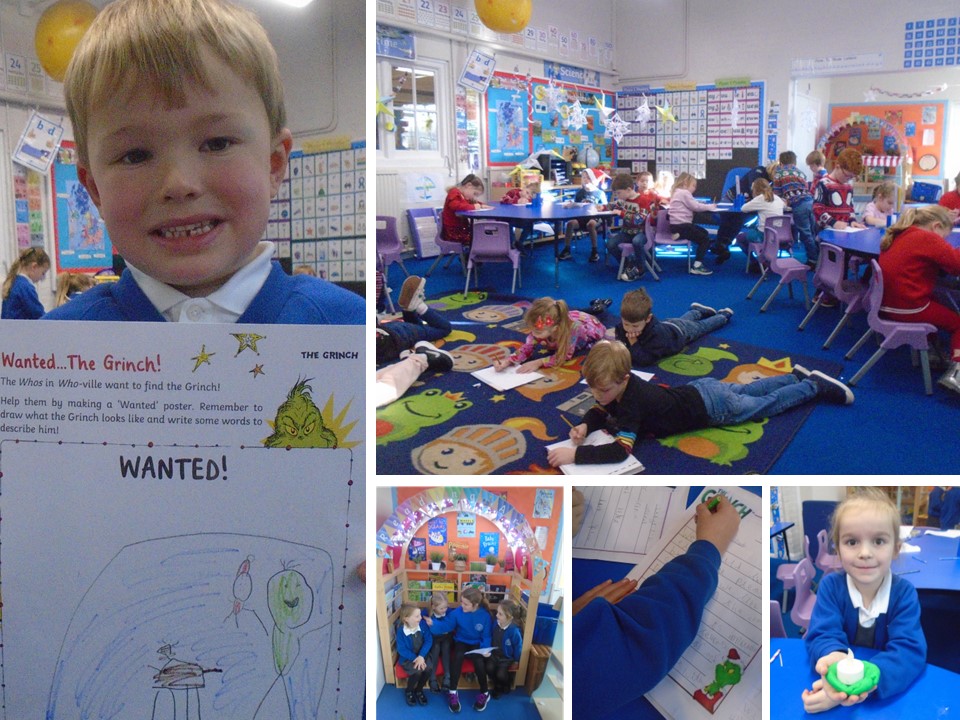 There's been no slowing down in the run-up to Christmas! This week, the children have written letters to the Grinch to get our elf-on-the-shelf back after he stole it (it was safely returned on Wednesday); the Year 5 class have been in to read us their 'Snowman' stories; we've taken a step away from Christmas to learn about how Hindus use the symbol of light to celebrate Diwali; there've been lots of festive crafts, a reindeer 'Draw With Rob', and we've even managed to squeeze in a Christmas Fair, Christmas Jumper Day and the Infants Christmas party, not to mention a pantomime!
There's been no slowing down in the run-up to Christmas! This week, the children have written letters to the Grinch to get our elf-on-the-shelf back after he stole it (it was safely returned on Wednesday); the Year 5 class have been in to read us their 'Snowman' stories; we've taken a step away from Christmas to learn about how Hindus use the symbol of light to celebrate Diwali; there've been lots of festive crafts, a reindeer 'Draw With Rob', and we've even managed to squeeze in a Christmas Fair, Christmas Jumper Day and the Infants Christmas party, not to mention a pantomime!
Ask your child about their favourite festive activities this week.
Week 14 - A pitch perfect performance, letters to Lapland and counting down with kindness
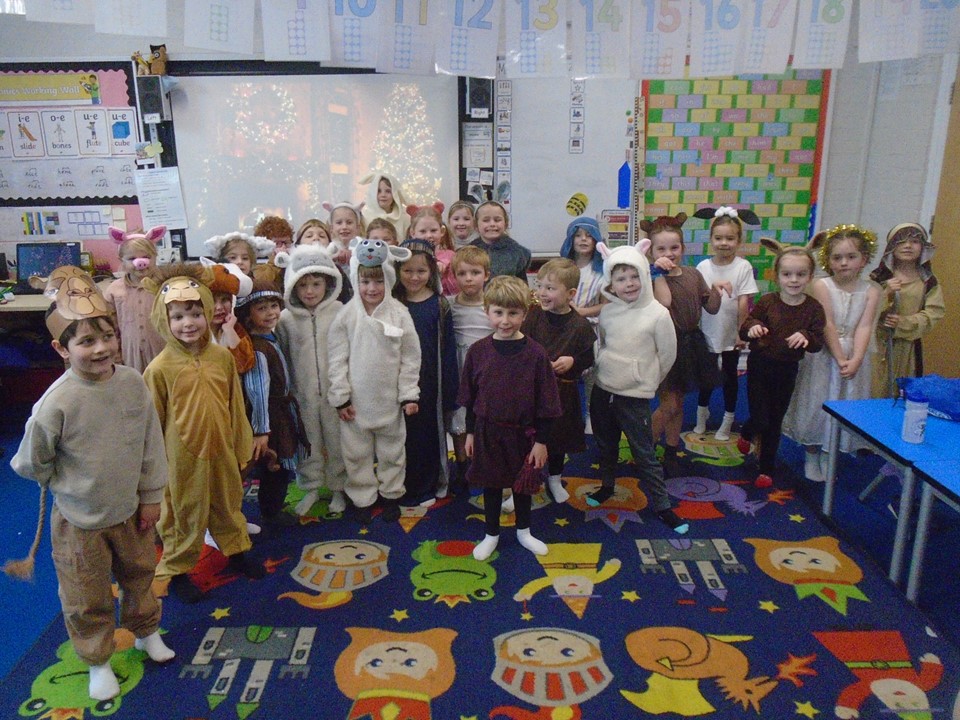
This week, the infants performed their Nativity production for parents and families as well as for the rest of the school.
This year's Nativity was entitled 'Secret Angels', and was a spin on the traditional Nativity tale, involving angels coming down to Earth in disguise to spread the news of the baby Jesus.
Thanks to everybody who was able to come and watch the performance, as well as providing some amazing costumes and helping the children to practise their songs at home.
We hope all the songs, tinsel and sparkles have helped to put you in a festive mood!
Despite a busy schedule of Nativity rehearsals, we've also found time to squeeze in the rest of the curriculum, including English...albeit with a festive theme.
The children have been writing their letters to Santa Claus, telling him what they might like for Christmas and what they've done to get onto the 'Nice List'. After writing their letters and making and decorating their envelopes, the children then posted them into our magical post box for Santa's elves to collect. Those same elves also thought it might be useful to send a copy of the letters home in the children's reading wallets, just in case you wanted to see what they said!
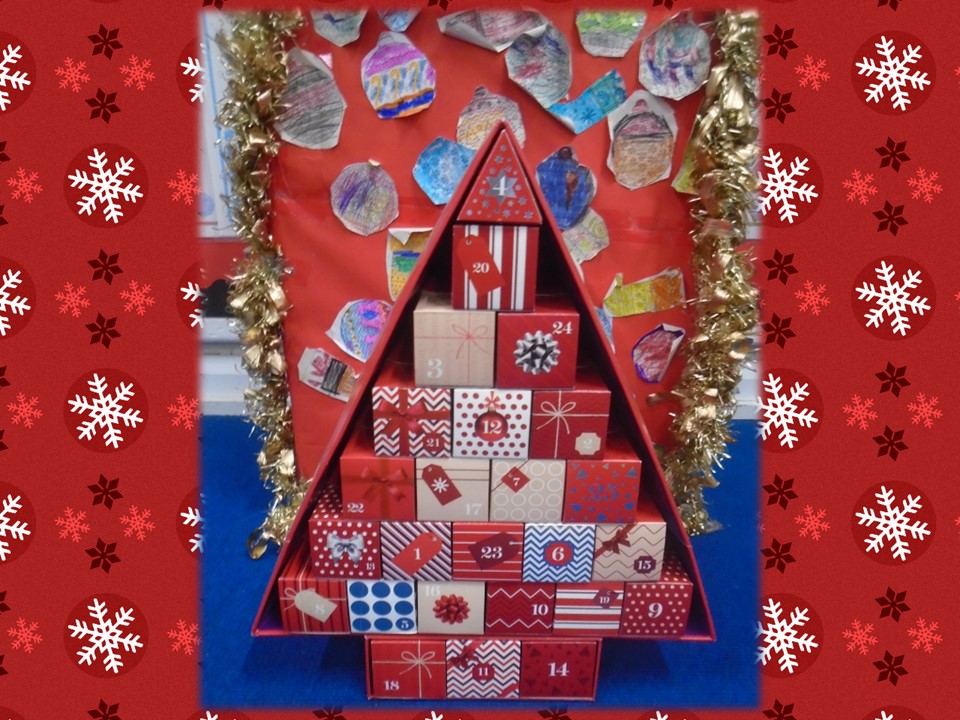
Talking of getting onto the 'Nice List', we've been doing a special Christmas countdown in Year 1.
Advent is always full of chocolate advent calendars and mischievous elves, but this year we've created a special 'Advent Calendar of Kindness'. Every box contains a note with something kind you could do for somebody else. These range from holding a door open for somebody or telling them a joke to make them laugh, to feeding the birds in your garden or donating some of your old toys and clothes to a local charity shop.
Ask your child which acts of kindness they've completed this week.
Week 13 - Smashing shapes, wonderful watercolours and diving into diets
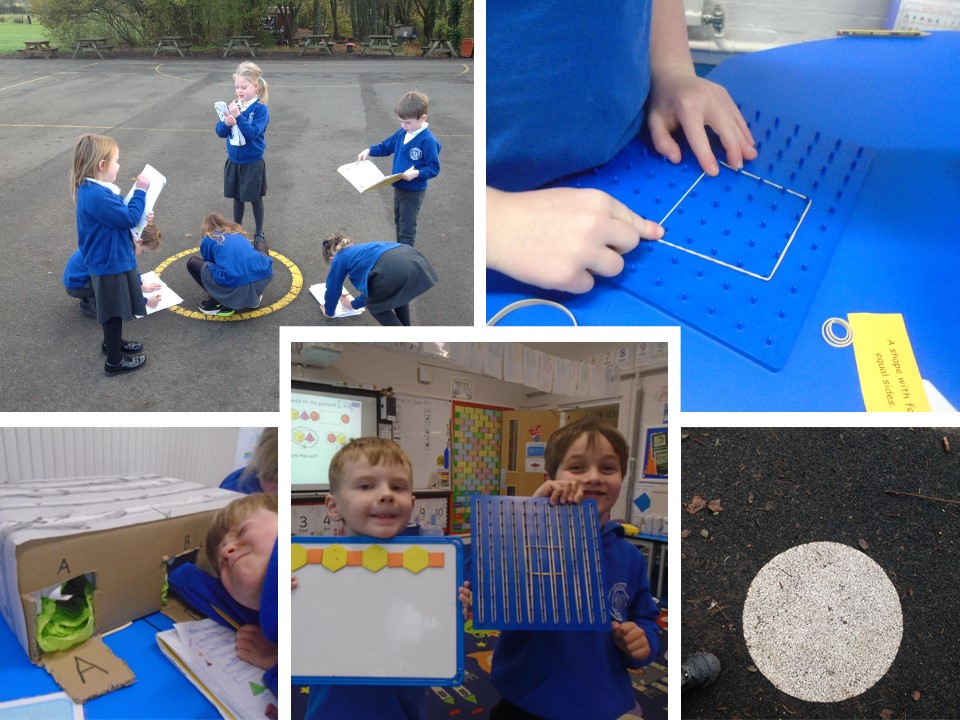 In Maths, we've continued our work on shapes by turning our attention to 2D shapes.
In Maths, we've continued our work on shapes by turning our attention to 2D shapes.
The children went outside on a shape hunt, looking for 2D shapes in and around the school buildings and playground. They also made shapes using peg boards and rubber bands, as well as taking part in a number of other challenges, including sorting 2D shapes into trays, identifying pictures of shapes around the room, and even using their shape detective skills to recognise the three shapes hidden behind the mystery doors using just their sense of touch.
What shapes can your child spot around your home and garden?
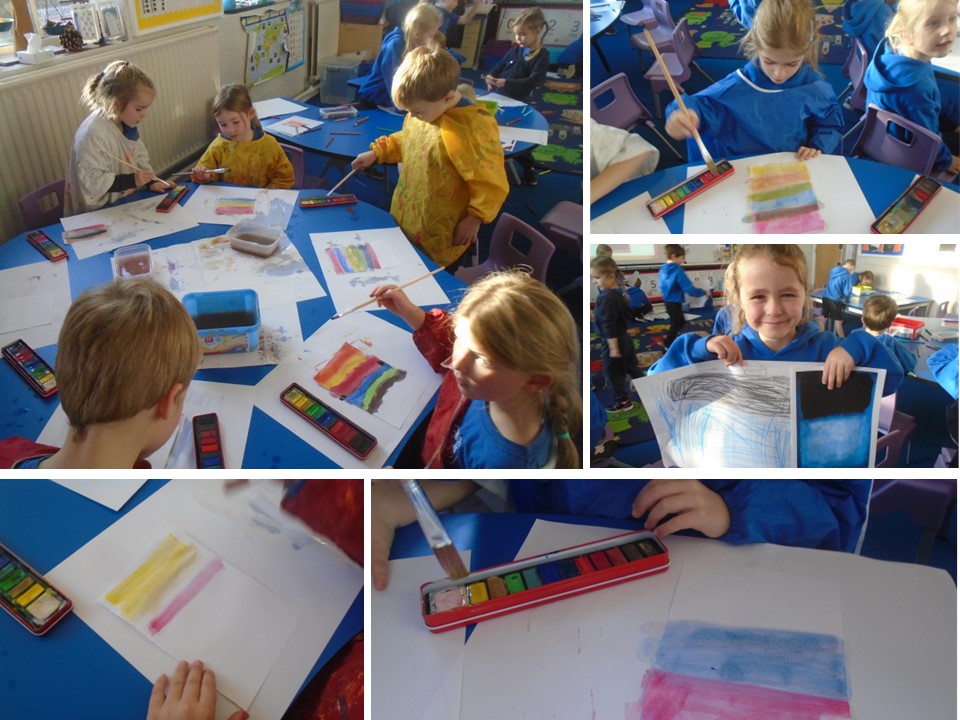 In Art, we continued exploring colours using different media - this week, it was watercolours.
In Art, we continued exploring colours using different media - this week, it was watercolours.
Inspired by the colour field paintings of Mark Rothko, the children used watercolour paints to create blocks of colour, mixing the paints together to create different colours, or adding more water to dilute the colours they'd created. We also talked about the nature of abstract art, and how the colours we choose can help to express our feelings and emotions.
Ask your child what colours they chose. Did they prefer using the watercolours to the pre-mixed paints we used last week?
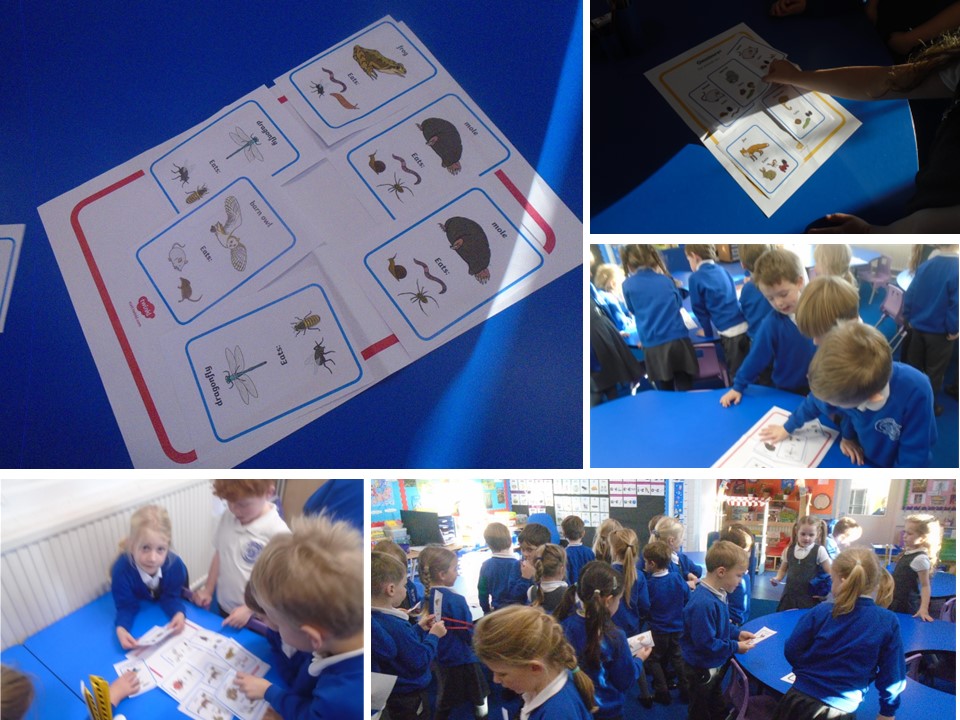 Our scientific learning about animals and their habitats continued this week as we explored the world of animal diets.
Our scientific learning about animals and their habitats continued this week as we explored the world of animal diets.
We learnt about animals that only eat other animals (carnivores), animals that only eat plants (herbivores), and animals that eat both plants and other animals (omnivores).
We then used our knowledge to sort a range of different animals into groups based on what they ate.
Can your child name any animals and tell you if they're carnivores, herbivores or omnivores?
Week 12 - Marvellous movement, roaming robots and candles in Christianity
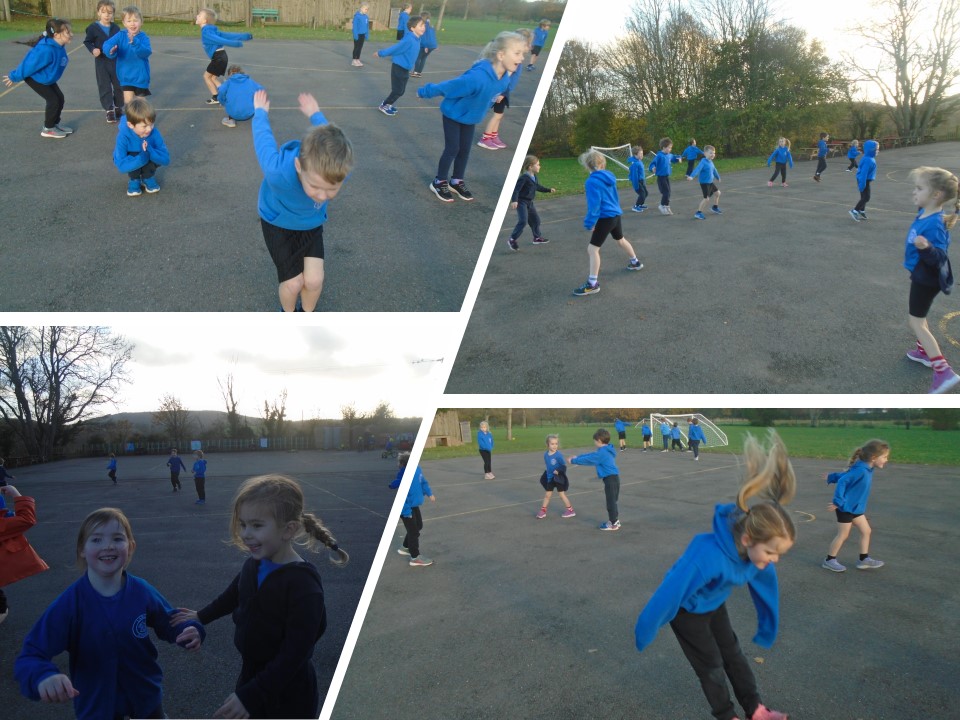
Indoor P.E. this week had a festive flavour, with a dance inspired by the classic Christmas ballet 'The Nutcracker'.
Outside, however, the children were able to dodge Storm Bert and practise more of their fundamental movement skills.
The children were challenged to move around the playground in different ways, including forwards, backwards, sideways, quickly and slowly. It all goes towards honing their core strength, balance and stamina.
Ask your child about their favourite method of movement.
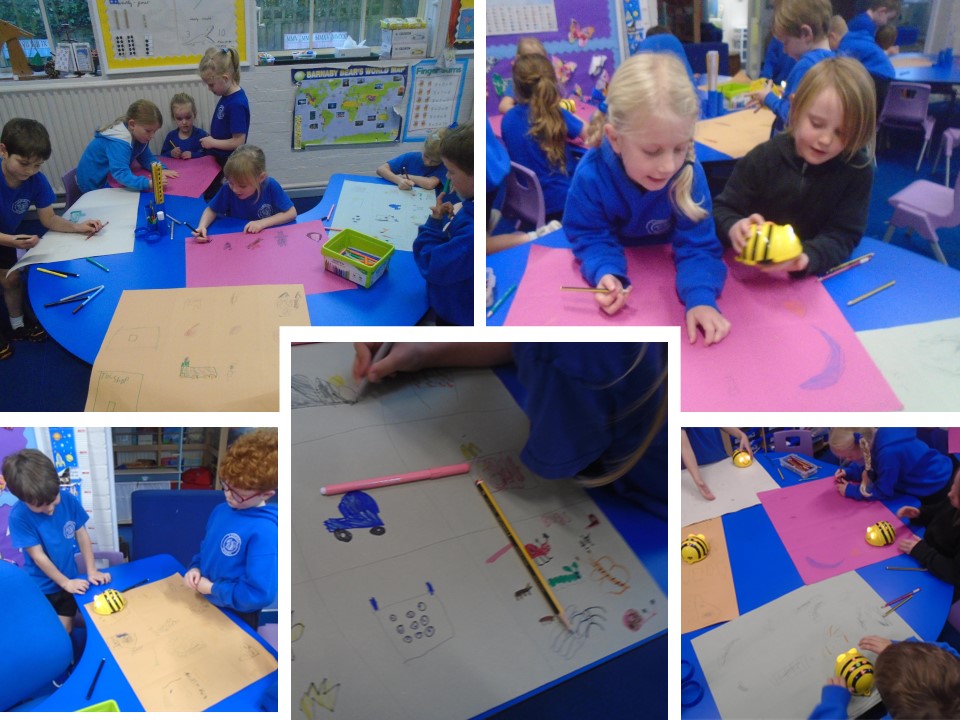
In Computing, the children were once again practising their programming skills with the Beebots.
First, they had to design Beebot worlds, with each 15cm x 15cm square containing something the Beebots might like to visit.
They were then challenged to programme their Beebots to navigate around their worlds, going from square to square and visiting different places of interest, from schools and libraries to sports centres and parks.
Ask your child what they included in their Beebot world.
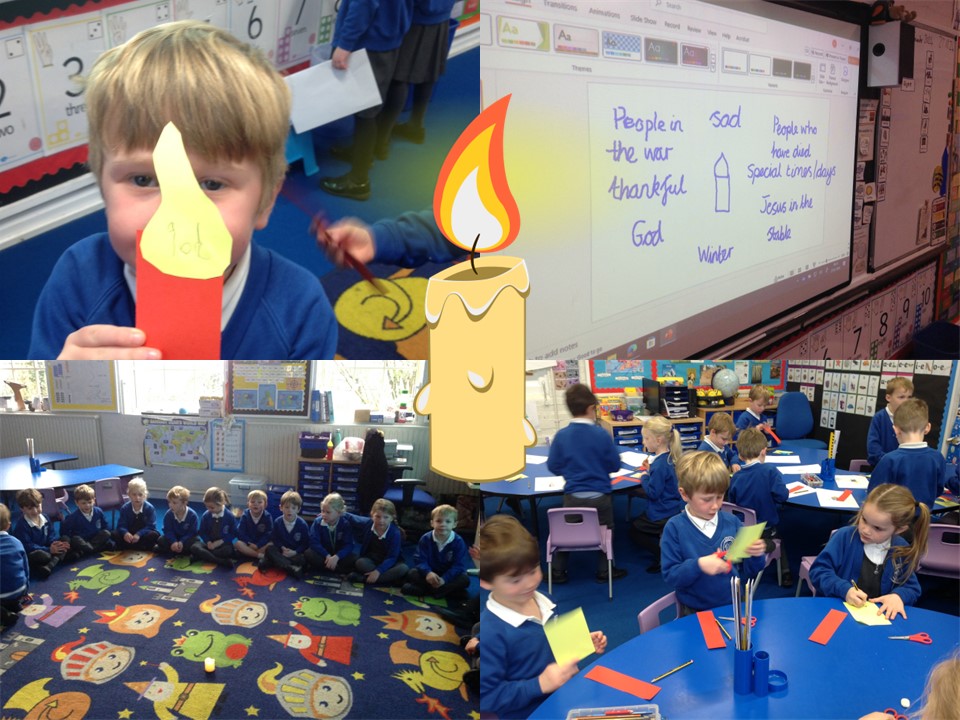 In the first part of this term's World Faith & Philosophy, we began our look at how different cultures use the symbol of light and candles.
In the first part of this term's World Faith & Philosophy, we began our look at how different cultures use the symbol of light and candles.
First, we looked at the use of candles in the Christian culture, including for celebration and remembrance, as well as in the advent wreath, where each candle has a different meaning. The children even made their own paper candles to remind them of somebody special to them, before hearing the Christmas story and writing about the importance of the candle as a symbol in Christian culture.
What can your child tell you about candles?
Week 11 - Super shapes, colour chaos and scientific sorting
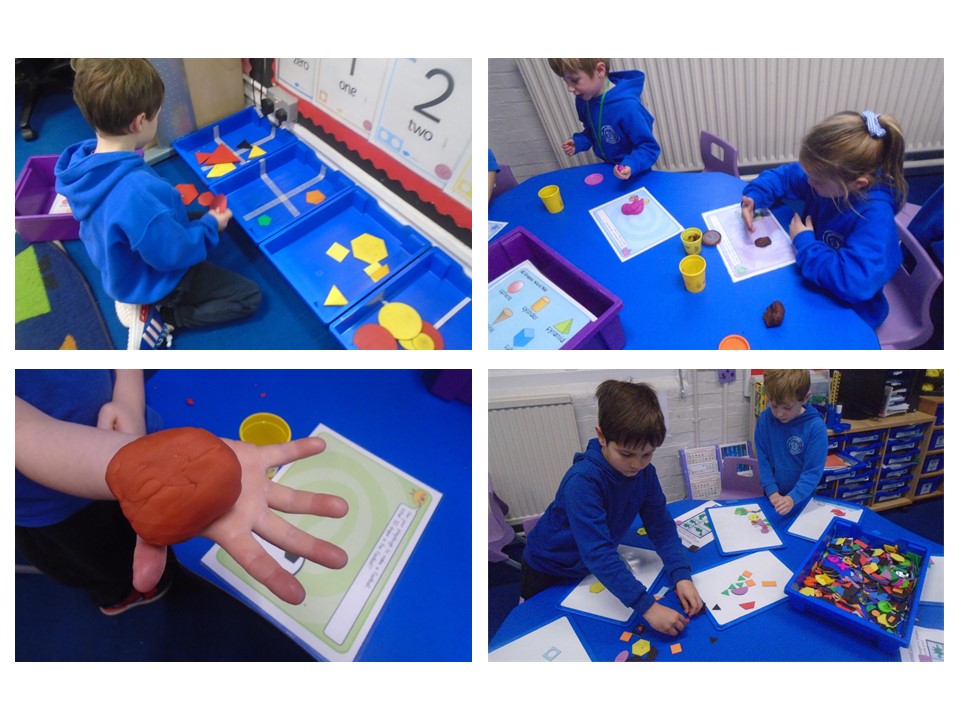
In Maths this week, we've moved away from our work on numbers and have begun looking at shapes.
We're exploring both 2D and 3D shapes, so the children have been taking on a range of practical challenges, including sorting shapes into categories, creating pictures using magnetic 2D shapes, and making 3D shapes out of Play-Doh, such as spheres, cylinders, pyramids and cones.
Can your child tell you the difference between a 2D and a 3D shape? How many different shapes can they name?
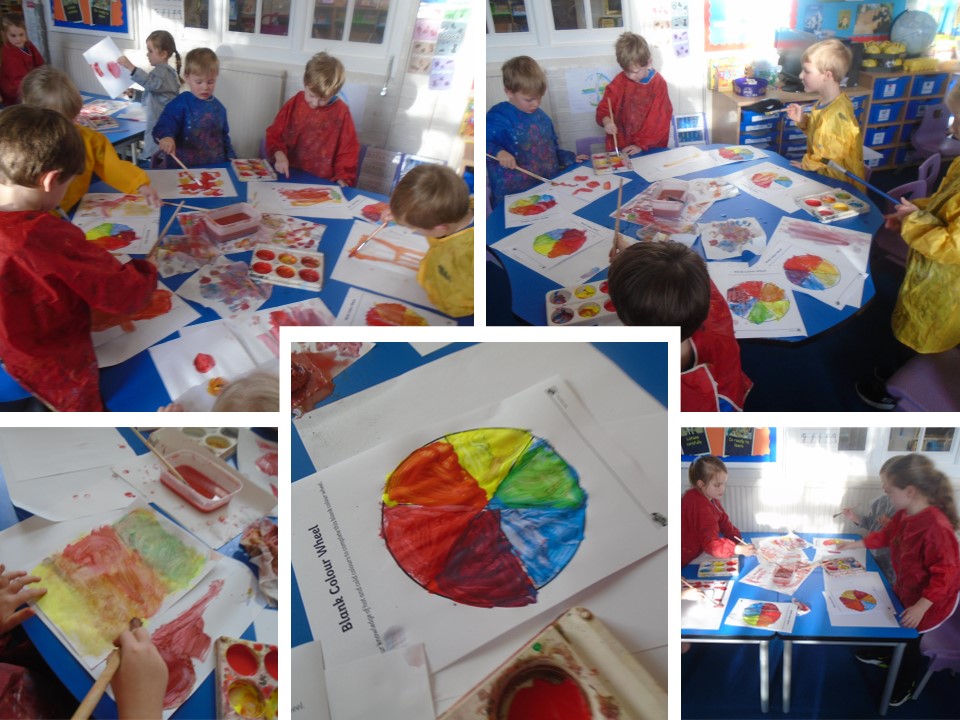
In Art, we continued our look at colour by experimenting with some colour mixing.
Having learnt about the three primary colours last week, this week we were using a colour wheel to see what happens when we mix those primary colours together.
Once they'd completed their wheels, the children were free to experiment with colour however they wished, creating some paintings (and a mess!) that would give Mark Rothko and Jackson Pollock a run for their money!
Ask your child which different colours they created and how they did it.
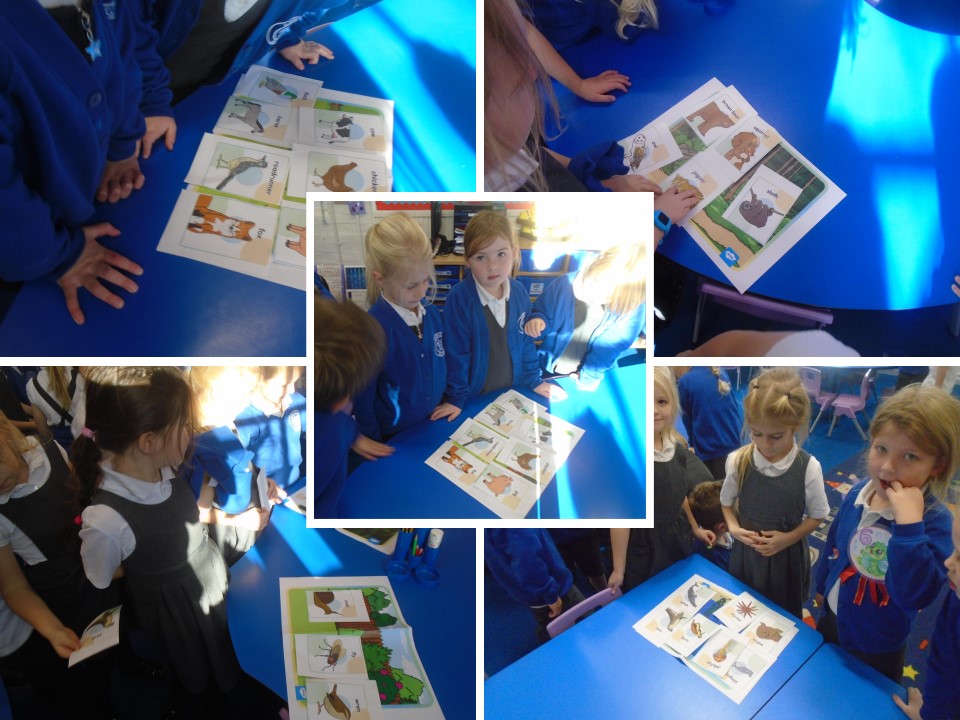 In Science, we're learning all about animals and their habitats.
In Science, we're learning all about animals and their habitats.
Having discussed what a habitat is (a place where plants and animals live), we went on to look at different types of habitats and the kinds of animals that live there, exploring the types of adaptations those animals have that make it easier for them to survive in those habitats.
The children then sorted pictures of different animals, placing them into their correct habitats.
What can your child tell you about different habitats and animal adaptations?
Week 10 - A trip into the past, meeting Mondrian and championing Children in Need
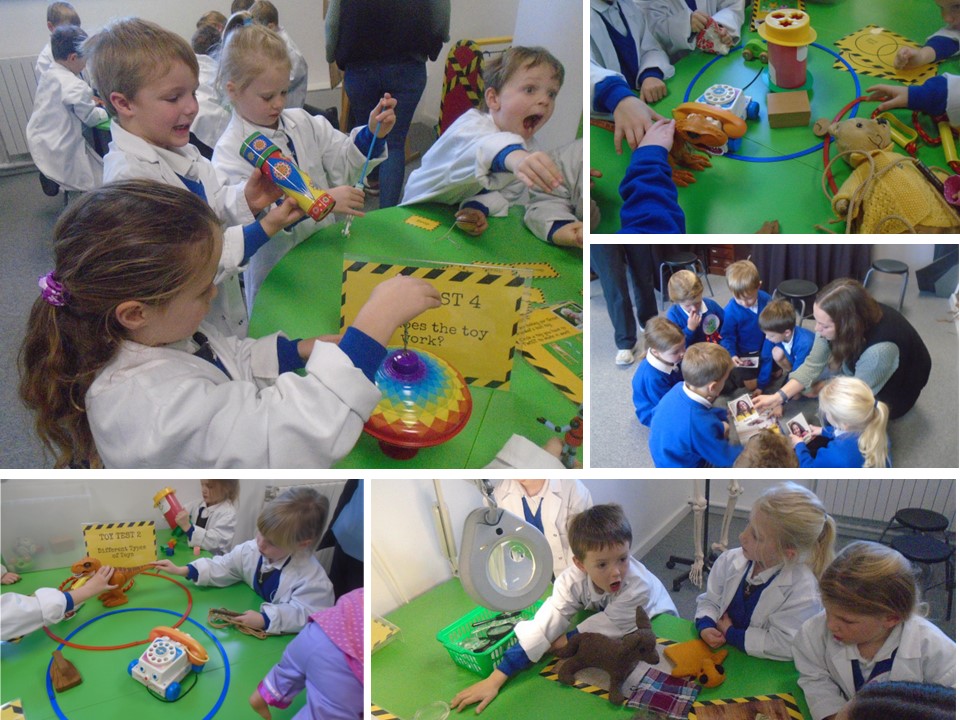 On Tuesday, we jumped onto a coach and headed down to the Gosport Museum and Art Gallery to travel back in time!
On Tuesday, we jumped onto a coach and headed down to the Gosport Museum and Art Gallery to travel back in time!
It was all to do with our history topic, which is all about how toys have changed within living memory. First, we completed a chronological challenge, working out which toys our parents, grandparents and great-grandparents might have played with. Then, the children took part in a series of hands-on tasks using toys from across the decades. Finally, the children had some free time to play a range of games, both old and new.
Ask your child about our trip into the past.
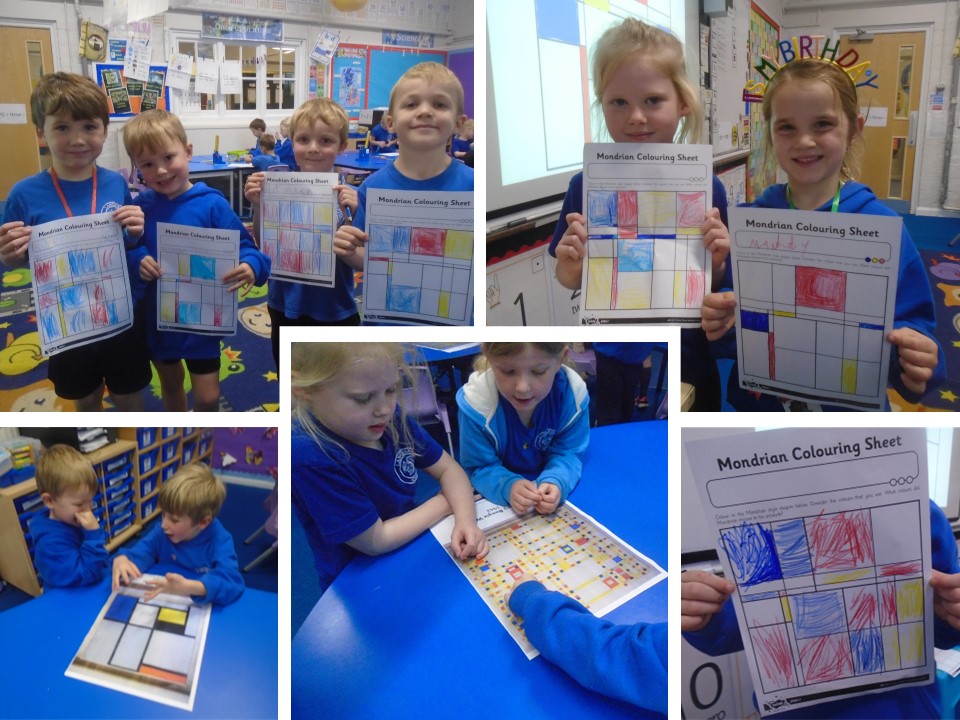 We began our art unit on colour by learning all about the three primary colours through the work of Dutch artist Piet Mondrian.
We began our art unit on colour by learning all about the three primary colours through the work of Dutch artist Piet Mondrian.
After talking about which three colours were the primary colours (and why), we looked at a number of paintings by Mondrian which use simple blocks of primary colour alongside black and white lines and squares. The children then had the opportunity to create their own Mondrian-inspired works, using only primary colours to fill their own grids.
Ask your child if they can name the three primary colours, and what they thought about the work of Piet Mondrian.
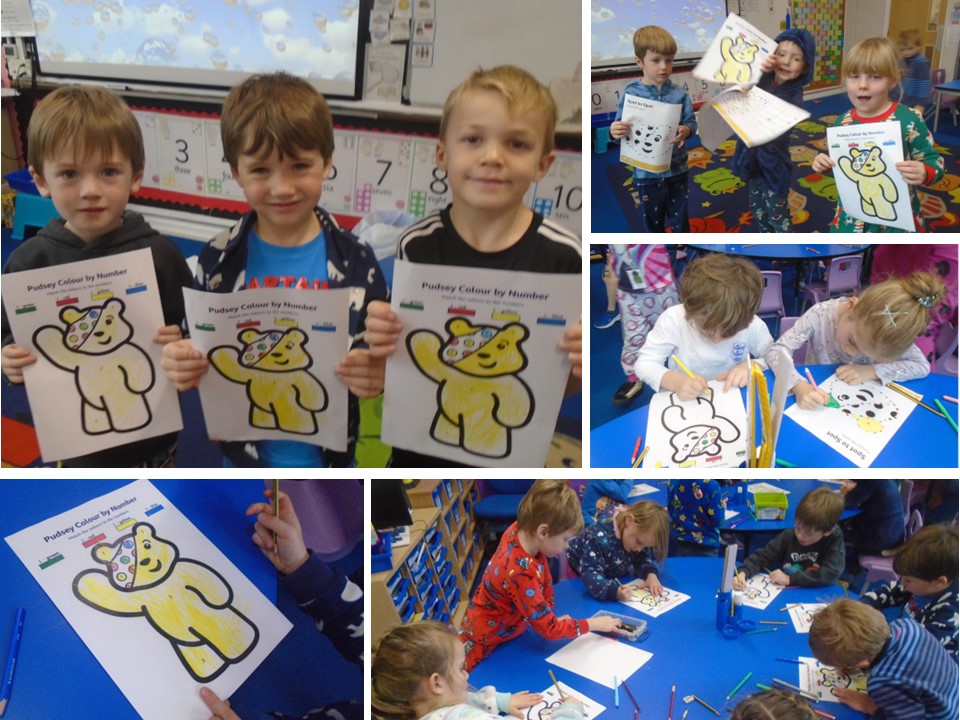 Alongside it being Anti-Bullying Week, on Friday the children voted to have a non-uniform day in aid of Children in Need!
Alongside it being Anti-Bullying Week, on Friday the children voted to have a non-uniform day in aid of Children in Need!
Through their input via the School Council, the children decided they wanted to raise money for Pudsey by paying £1 to come in wearing their own clothes. It was a fabulously fun way of raising money for an amazing cause, and throughout the day the children took part in a range of Pudsey-related activities and learnt about what Children in Need does to support a wide variety of child-focused charities.
What did your child most enjoy about supporting Children in Need this year?
Week 9 - A terrifying tale, awesome autumn and dastardly drama
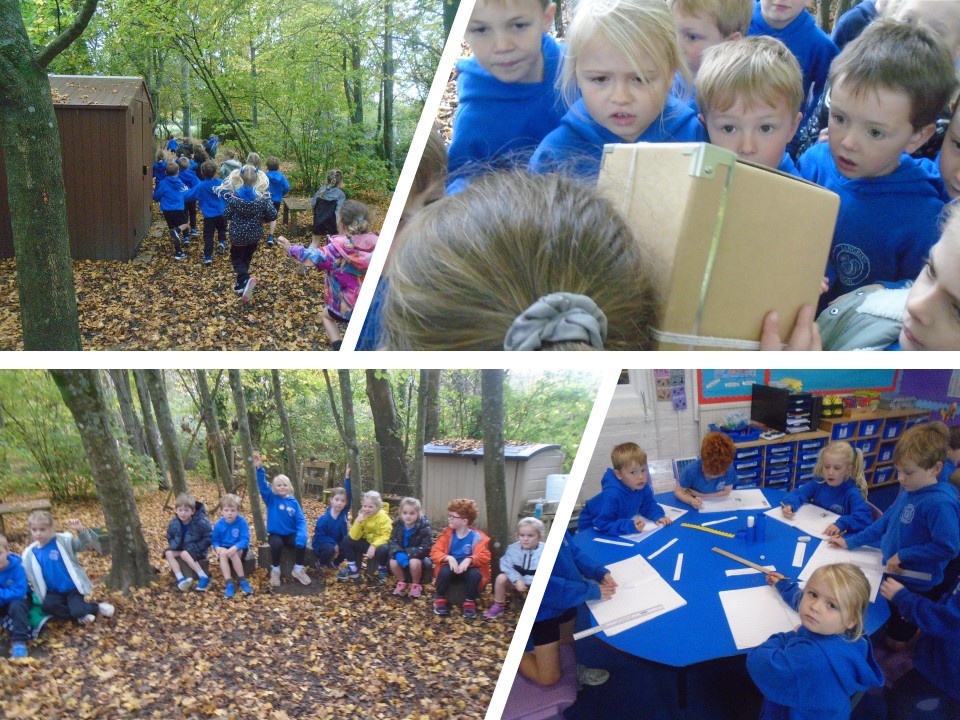 In the wake of Halloween, the children dared to venture into the woods for a spooky story this week.
In the wake of Halloween, the children dared to venture into the woods for a spooky story this week.
After reading 'A Dark, Dark Tale', the children then discovered a mysterious box in the copse, just like the one in the story - but what was inside?!
Inspired by the terrifying tale, the children then wrote their own versions, choosing their own repeating adjective and crafting intriguing narratives with a surprise ending.
Ask your child about their story. Can they tell you what they wrote about and what happened at the end?
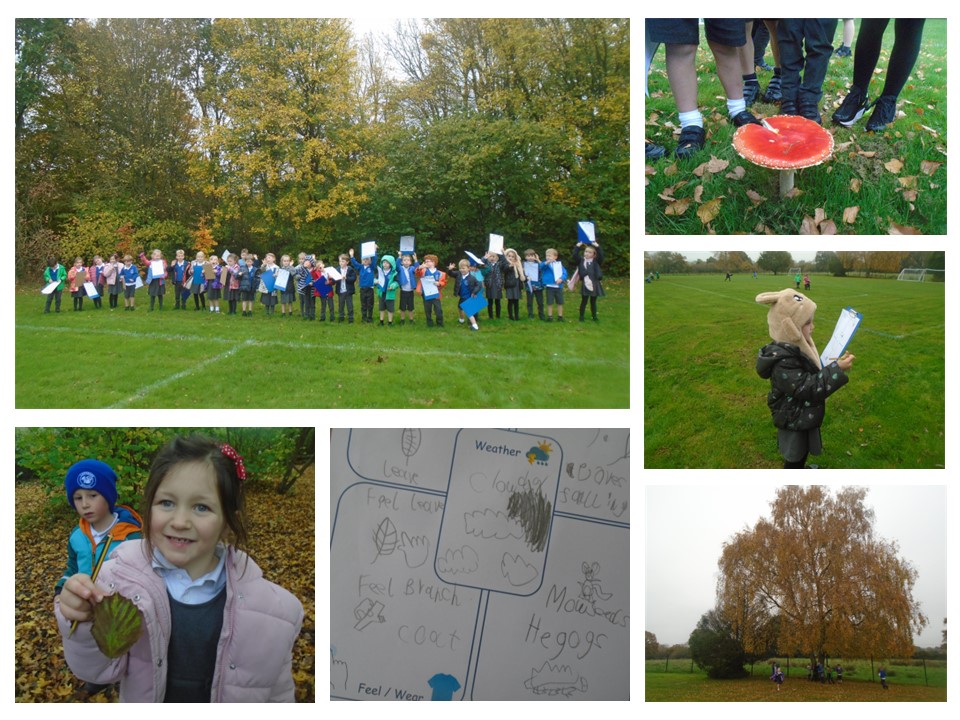 Staying outside, in Science, our attention turned to our year-long study of the changing seasons.
Staying outside, in Science, our attention turned to our year-long study of the changing seasons.
Armed with pencils, clipboards and some suitably warm clothing, the children had to note down what they noticed about the school environment now that autumn was here, thinking about what they could see, hear, feel and smell. Alongside the changing deciduous trees and dewy grass, we also found plenty of fungi and the distinctively autumnal smell of damp, rotting leaves.
Ask your child what they noted down, and how they think the environment will continue to change over the coming months.
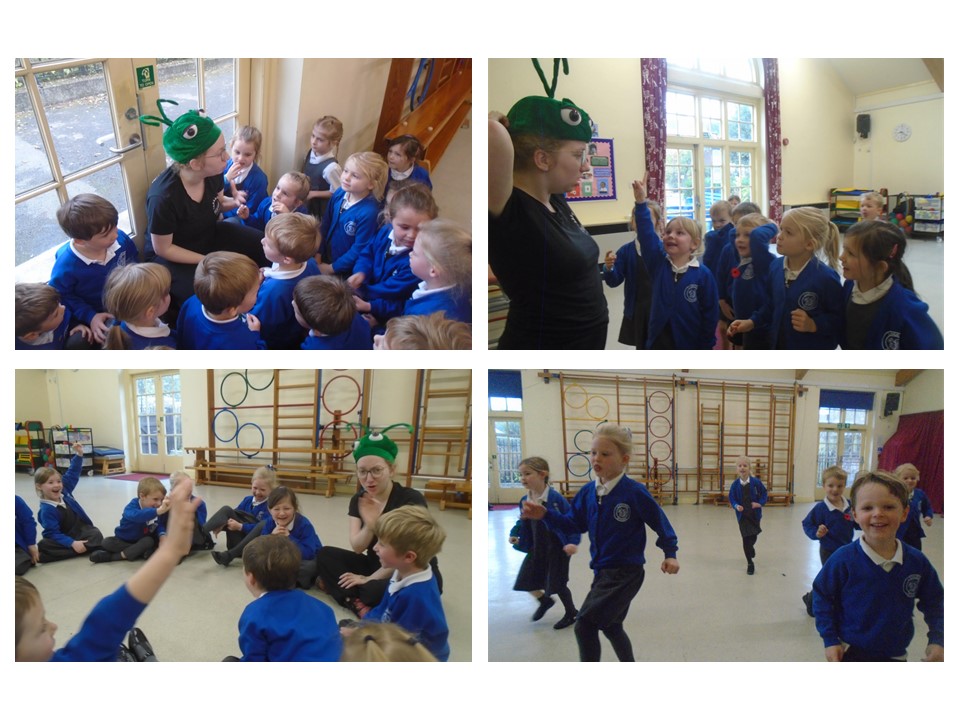 On Friday, Perform came in to deliver a drama workshop about some crazy space aliens!
On Friday, Perform came in to deliver a drama workshop about some crazy space aliens!
The children had to help a friendly green alien defeat the nefarious Cruel Commander, first by learning to be astronauts (after choosing some suitable astronaut names or course), then by pretending to be stars in order to steal his favourite snack - a tasty chocolate cake. The children had a fantastically fun time taking part in this imaginative space adventure.
Ask your child about the workshop. What was their favourite part of the intergalatic activity?
Week 8 - Wonderful wolves, careful construction and marvellous music
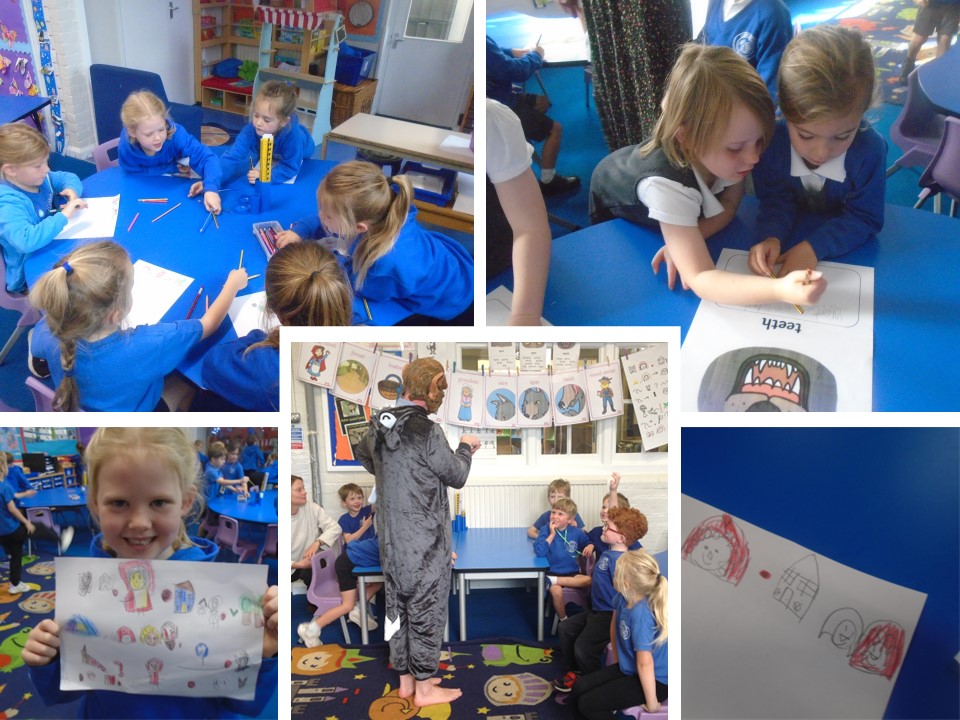 In English, we've been exploring the story of Little Red Riding Hood for the past few weeks. We began by learning the story and creating a 'story map', using images to remind us of exactly what happened in this famous traditional tale. We then spent some time using adjectives to describe the characters and setting of the story. Imagine our surprise when the Big Bad Wolf was caught on camera in the copse, and asked to come into the classroom to explain how he'd changed his ways and become a vegetarian! The children all wrote questions to ask the wolf, and made him feel very welcome indeed.
In English, we've been exploring the story of Little Red Riding Hood for the past few weeks. We began by learning the story and creating a 'story map', using images to remind us of exactly what happened in this famous traditional tale. We then spent some time using adjectives to describe the characters and setting of the story. Imagine our surprise when the Big Bad Wolf was caught on camera in the copse, and asked to come into the classroom to explain how he'd changed his ways and become a vegetarian! The children all wrote questions to ask the wolf, and made him feel very welcome indeed.
What was your child's question for the Big Good Wolf?
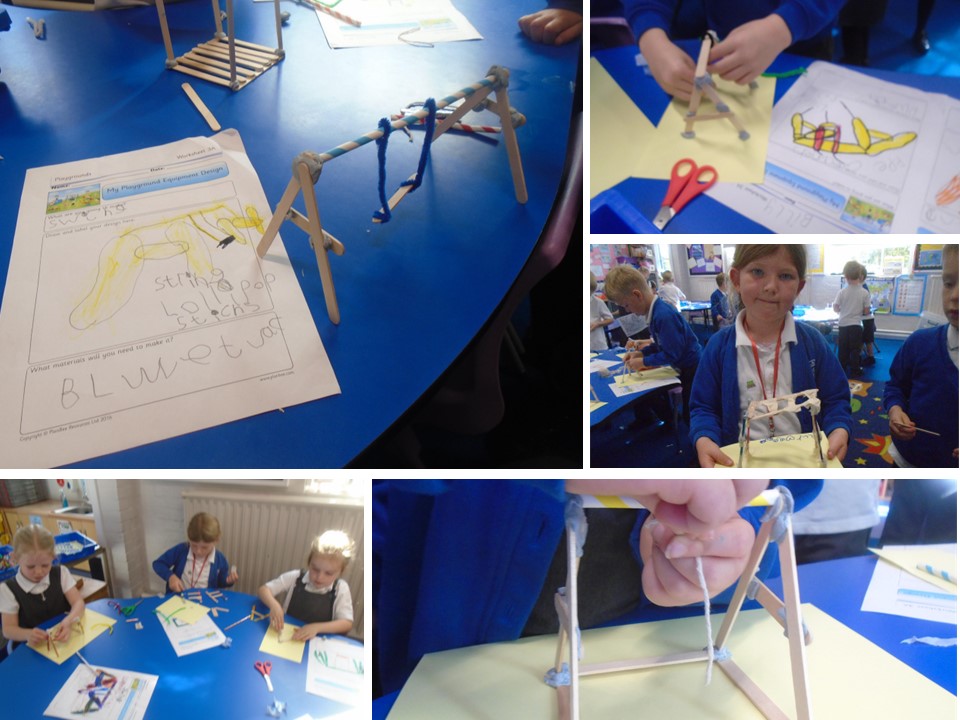
After weeks of research and planning, the children finally put their Design & Technology learning into action when they made their own models of playground equipment.
Using their plans to guide them, the children made their models using straws, lollipop sticks, blu-tac, tape, pipe cleaners and string, ensuring they were strong and sturdy enough to stand up by themselves.
The children loved making their models and, in the evaluation stage, even talked about what they'd change or improve next time around.
What can your child tell you about their model?
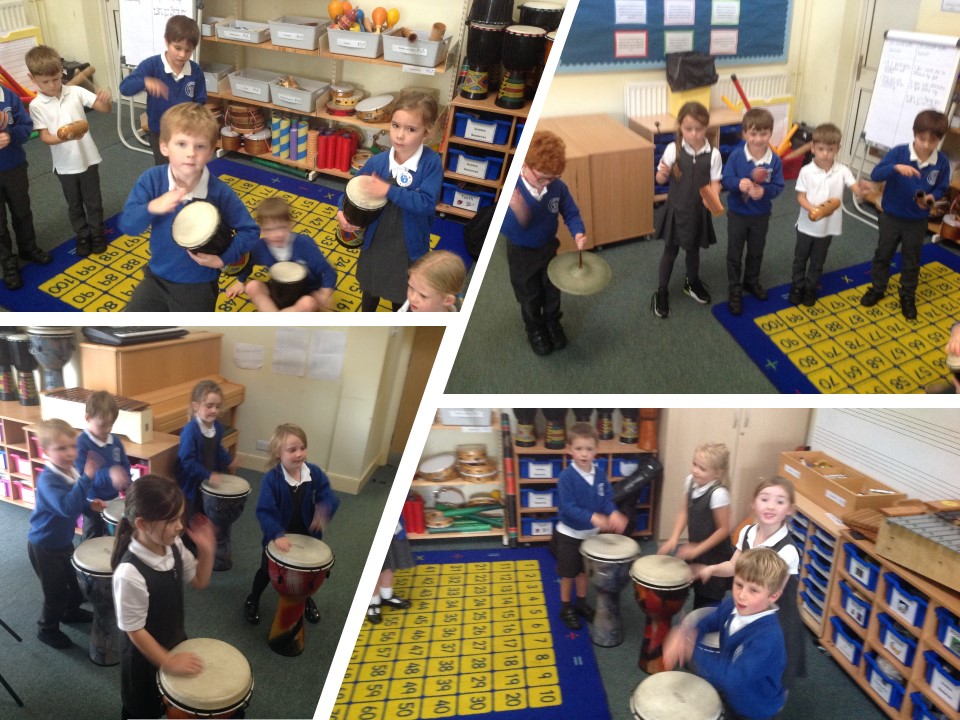 The children have been getting very hands-on in their music lessons, using a variety of instruments to explore the concepts of beat and rhythm.
The children have been getting very hands-on in their music lessons, using a variety of instruments to explore the concepts of beat and rhythm.
Beginning with body percussion, the children worked on staying in time with the music, before moving onto percussion instruments which they played both as an accompaniment and on their own.
We also did some mindful drawing this week, where the children were encouraged to draw shapes and images suggested by a piece of music they were listening to.
What can your child tell you about their music lessons this term?
Week 7 - Super scientists, gentle gymnastics and awesome addition
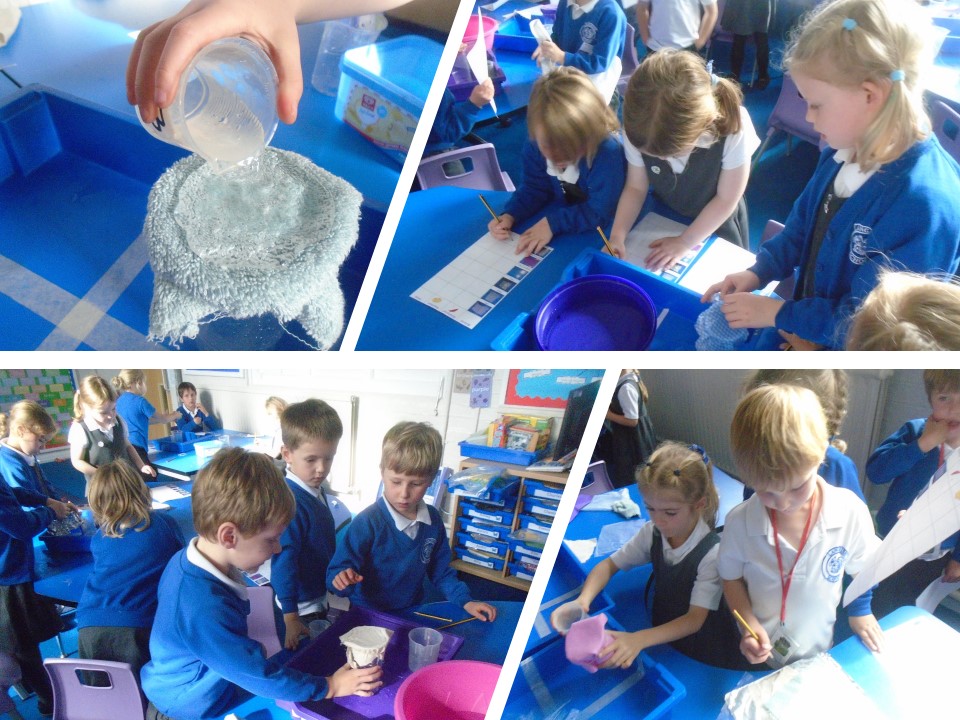 It's not every day you get a letter from a mermaid, but this week, Year 1 received a request for their help: Marissa the Mermaid had lost some of the scales from her tail, and needed some material to cover the area while her new scales regrew. The children decided which properties the material would have to possess (being waterproof, strong and flexible), and went about testing different materials to see which would be the most suitable for the job. Obviously it had to be a fair test, so they also had to be scientific about how much water they used and how long they left the water in position.
It's not every day you get a letter from a mermaid, but this week, Year 1 received a request for their help: Marissa the Mermaid had lost some of the scales from her tail, and needed some material to cover the area while her new scales regrew. The children decided which properties the material would have to possess (being waterproof, strong and flexible), and went about testing different materials to see which would be the most suitable for the job. Obviously it had to be a fair test, so they also had to be scientific about how much water they used and how long they left the water in position.
Ask your child what conclusions they came to.
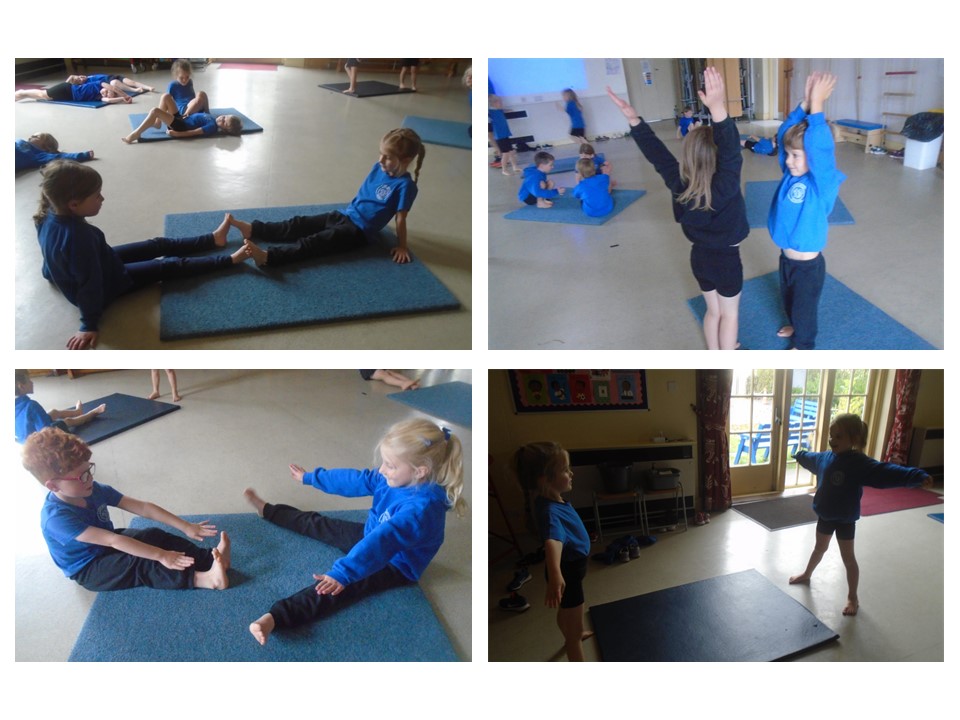 The children have been concentrating on strength, balance and fundamental movement skills in their gymnastics P.E. lessons.
The children have been concentrating on strength, balance and fundamental movement skills in their gymnastics P.E. lessons.
This week, one of their tasks was to work in pairs to hold different positions and mirror their partners. They were also challenged to think of as many different positions as possible, using different parts of the body to support and balance themselves, which really tested their core strength and stability.
Ask your child if they can demonstrate any of the gymnastic positions they remember from this week.
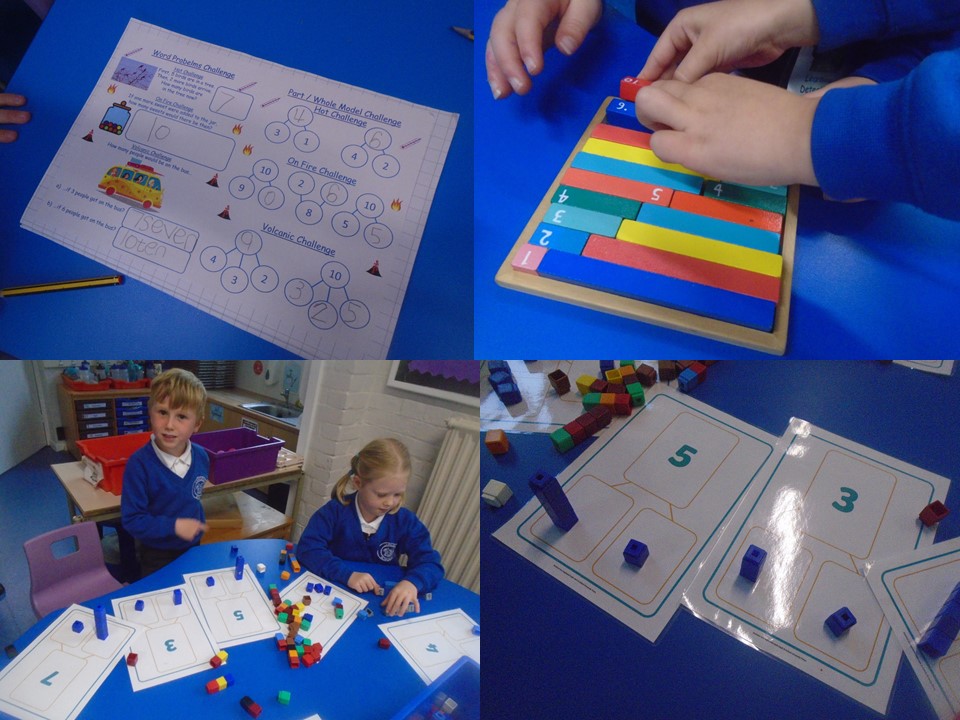
In Maths, we'll be looking at addition and subtraction within 10 over the next few weeks.
We began with addition, exploring the different ways in which numbers can be broken into two parts and added back together into a whole, demonstrating the concept practically using blocks and Numicon, as well as in written form using a part/whole model or bar model.
We've also looked at how you can systematically work out all the number bonds for any number, and how the commutative law can be utilised in addition too.
Can your child explain their knowledge of number bonds and the commutative law?
Week 6 - An amazing assembly, marvellous maps and exciting explorer time
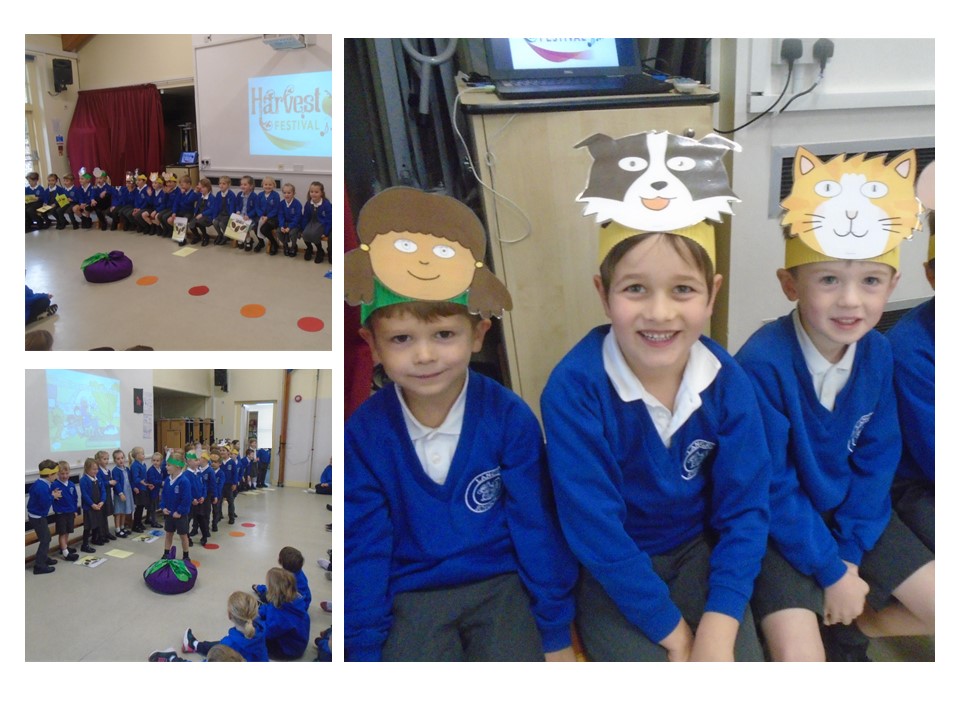 Thank you to everybody who could make it along to our Harvest Festival Assembly on Friday.
Thank you to everybody who could make it along to our Harvest Festival Assembly on Friday.
The children did a fantastic job of sharing our assembly with their families and the rest of the school. They recited poems, talked about what crops need in order to grow, explained sharing with others at harvest time is important, and even performed the story of The Enormous Turnip, before leading the whole school in a rendition of the harvest classic 'Cauliflowers Fluffy'.
I'm sure you'll agree, they all did an amazing job and should be very proud of themselves and their performance!
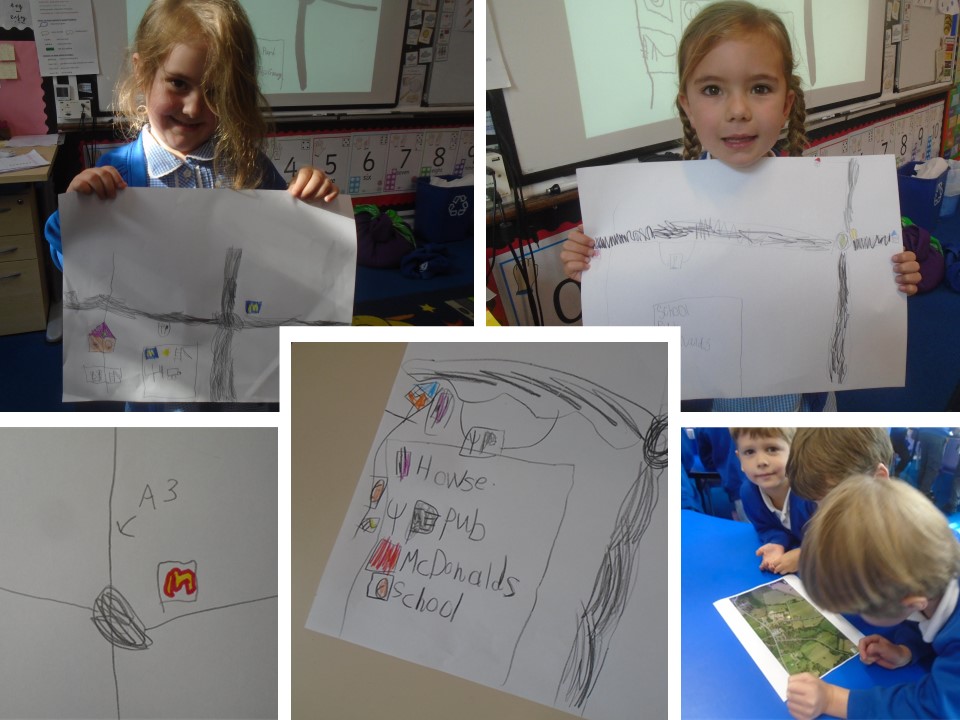 In Geography, we continued our look at the local area by exploring some maps.
In Geography, we continued our look at the local area by exploring some maps.
Using an electronic map, we explored the roads and features of our local area. The children then set about creating their own maps, including important landmarks they often pass on their way to school. They even labelled the main roads, and included symbols and a key to show what they all represented (no prizes for guessing what the big yellow 'M' represents!)
Ask your child about their map. What landmarks did they include? Maybe they could draw a map of the area around your house.
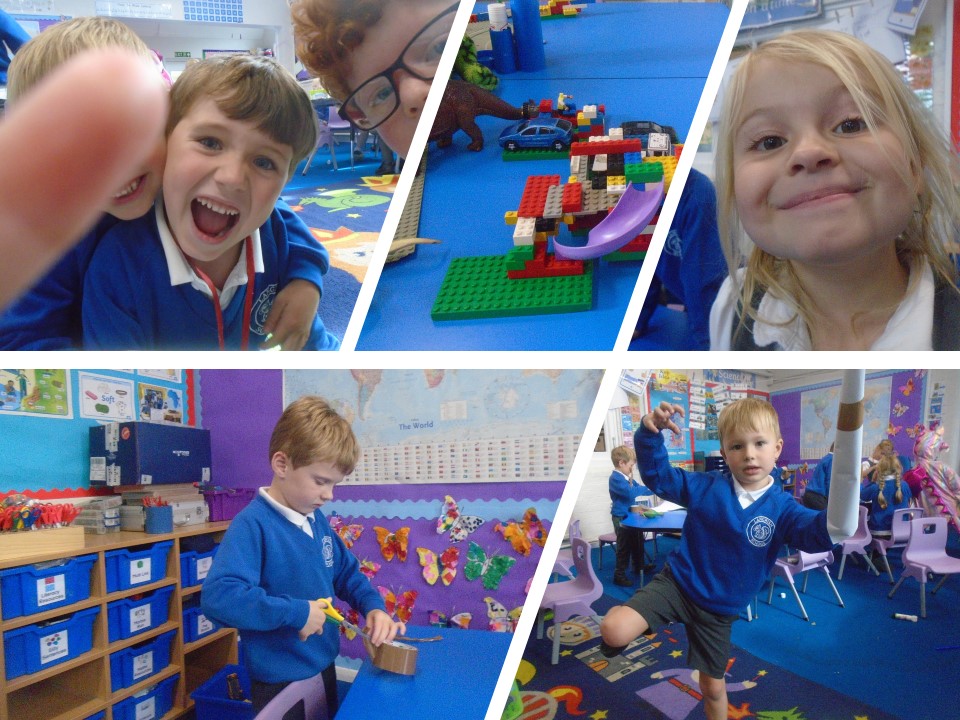 We keep the children pretty busy in Year 1, but it's not all work, work, work! We also make plenty of time for the children to play and explore on their own.
We keep the children pretty busy in Year 1, but it's not all work, work, work! We also make plenty of time for the children to play and explore on their own.
During Explorer Time, there's everything from jigsaws, drawing and colouring, to dressing up, LEGO, construction materials, cars and dinosaurs for the children to play with.
It's a wonderful opportunity for everybody to get creative, build their sharing and social skills, and - most importantly - to have some fun.
Ask your child about their favourite Explorer Time activities.
Week 5 - Staggering science, amazing acrostics and super structures
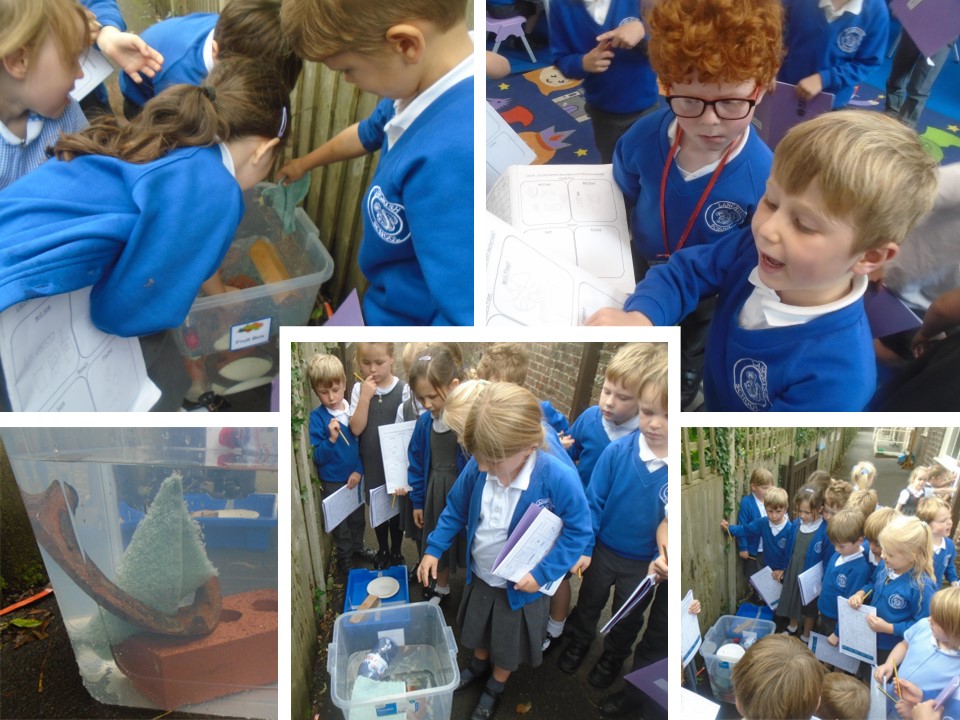
In Science, we were continuing our look at everyday materials and their properties by performing an experiment.
The children looked at some objects to see what materials they were made from, then made some predictions about which materials they thought would float or sink when they were dropped into water.
We then put the items into our water tank one by one and recorded the results, some of which surprised the children.
Ask your child about the experiment. Which results did they correctly predict, and which results did they find surprising?
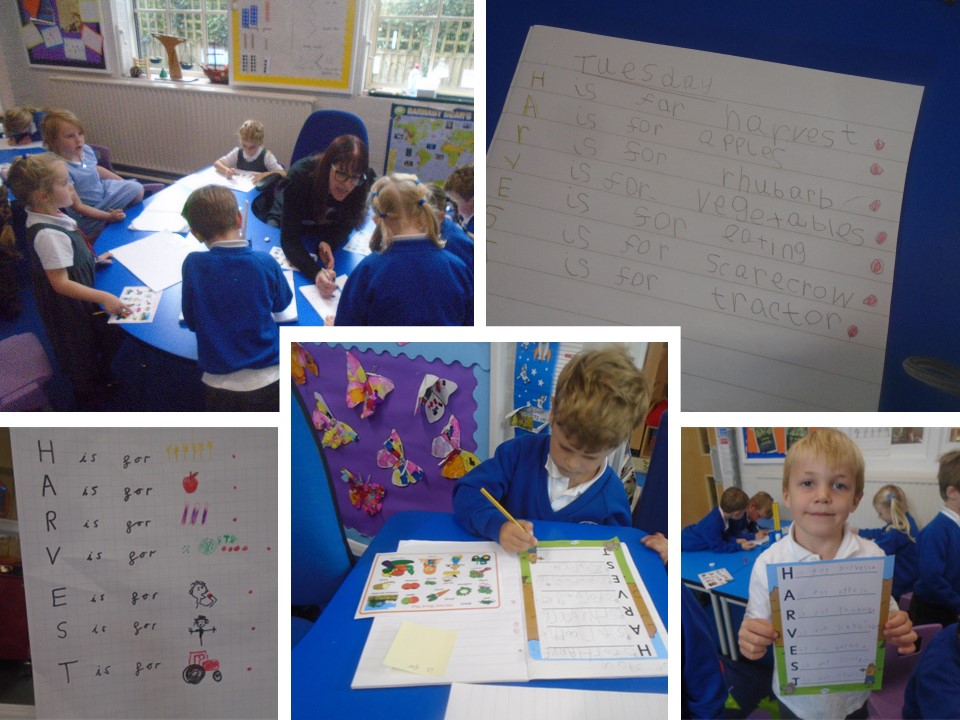
In English, we've been getting ready for next week's Harvest Assembly by writing some acrostic poems about harvest time.
First, we looked at how acrostic poems work, and learnt a little bit about the Harvest Festival to build up the vocabulary for our poem.
We then wrote and learnt a simple acrostic poem together as a class, which the children then rewrote and adapted to add in extra details and make their sentences more interesting.
Can your child tell you their acrostic poem? Maybe you could write one together at home.
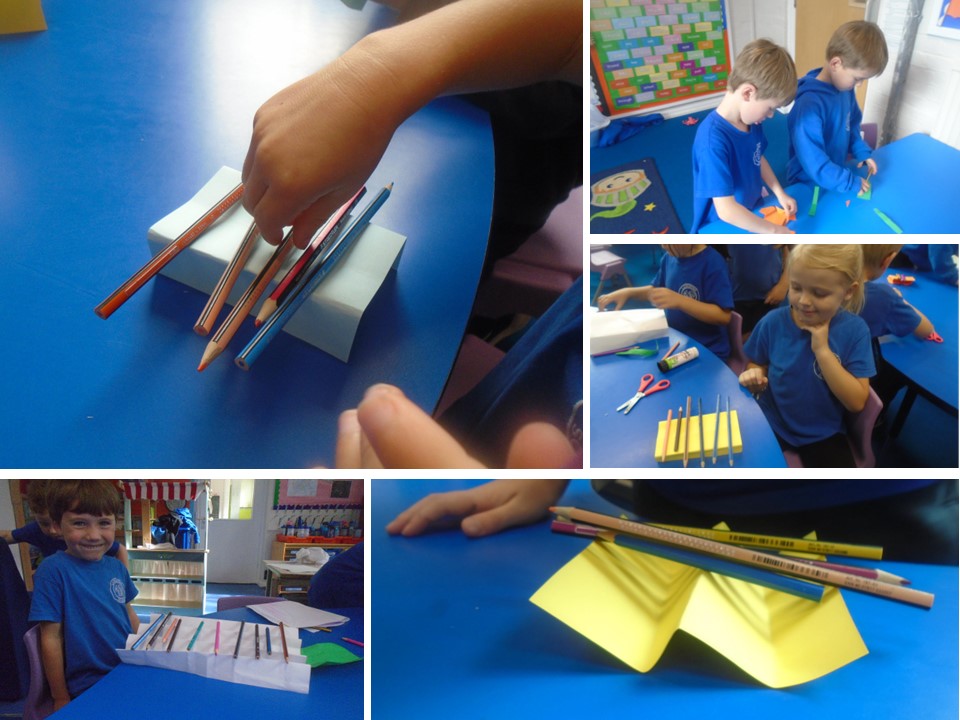
In Design & Technology, we were experimenting with different structures.
Having examined playground equipment the week before and noted which shapes made the strongest structures, the children were then challenged to fold a piece of paper into a shape that would stand up by itself and be strong enough to hold the weight of a pencil. They came up with lots of different ways of doing it, and were further challenged to see how many pencils their structures could support.
Ask your child which shapes they found were the best ones for the task. How many pencils did their structure support?
Week 4 - Fabulous Forest School, glorious gods and genius geography
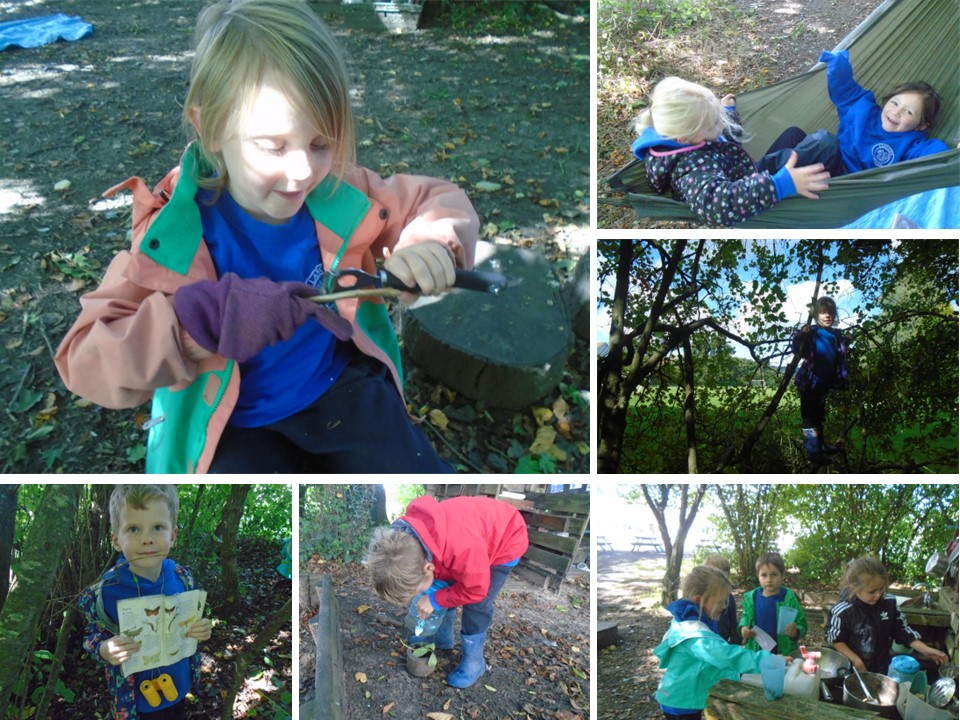 This week saw our final Forest School session of 2024. The children have had three fantastic weeks in the copse enjoying all the activities it has to offer, including bug-spotting, climbing trees, wood whittling, den building, making clay animal prints and whipping up some "delicious" concoctions in the mud kitchen.
This week saw our final Forest School session of 2024. The children have had three fantastic weeks in the copse enjoying all the activities it has to offer, including bug-spotting, climbing trees, wood whittling, den building, making clay animal prints and whipping up some "delicious" concoctions in the mud kitchen.
They've loved the opportunity to be outside exploring (or just chilling out in the hammock!) and even learnt some songs about caterpillars and gorillas which they might like to share.
Ask your child what they got up to during our Forest School sessions.
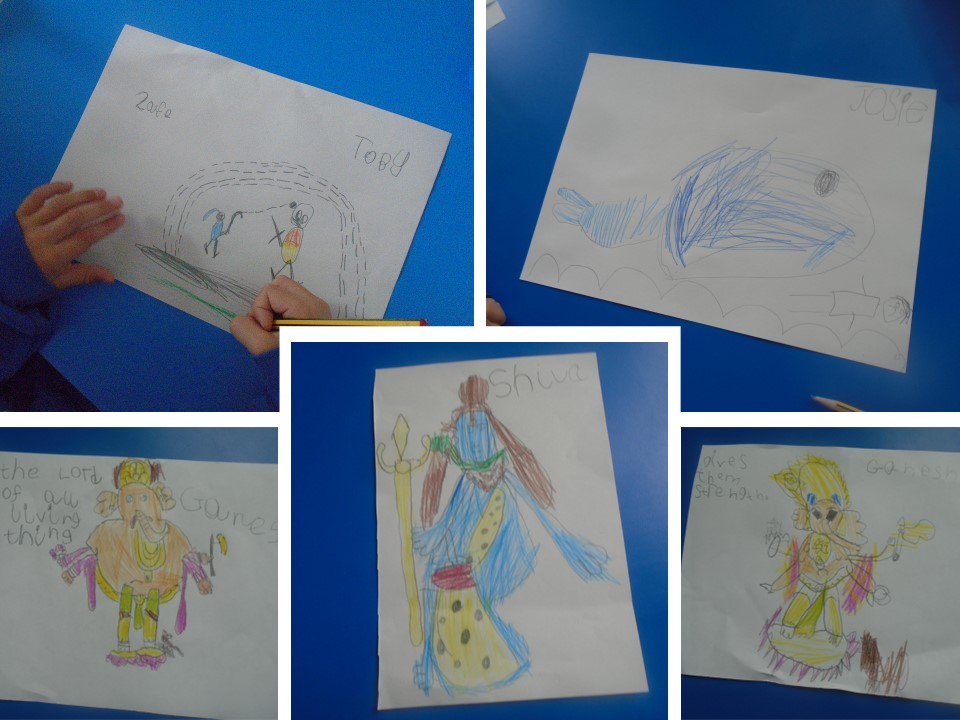
Our first World Faith and Philosophy unit of the year was all about the concept of gods.
We began by looking at the Christian concept of a single God, asking the children what they thought God might look like (which always elicits some interesting answers!) before hearing some stories from the Bible.
Later, we explored the Hindu culture, where many different gods represent the different roles and aspects of a supreme being.
Can your child name any Hindu gods, or tell you why they think the concept of god is important to both Hindus and Christians?
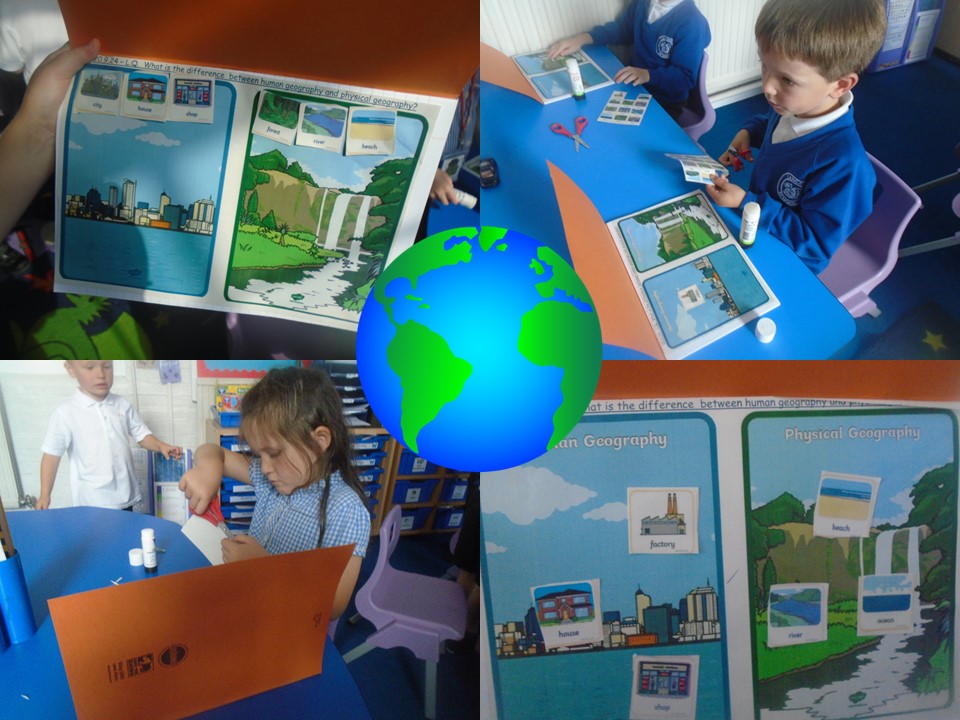
Our Geography unit this term is all about our local area.
We began by learning that, at its heart, Geography is the study of people and places. We then went on to explore the difference between 'human geography' (geographical features that are built by humans, such as towns, bridges and dams), and 'physical geography' (natural features such as hills, valleys and rivers).
Can your child give you some examples of human and physical geographical features? Can you spot any when you're out and about?
Week 3 - Marvellous materials, cracking Christmas cards and a recreation ground recce
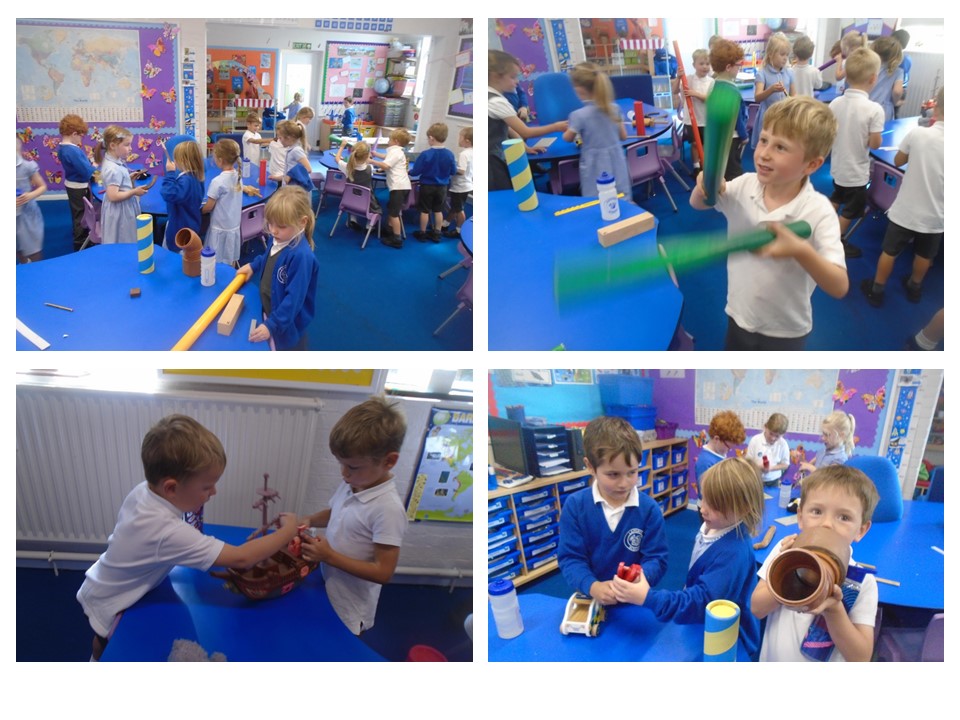
We began our new Science topic this week, looking at 'Everyday materials'.
The children explored a wide range of objects that had been placed around the room, all made from different materials with different properties. The children were easily able to identify the materials - including wood, plastic, metal, fabric, rock and paper - and soon got used to describing them using scientific terminology such as 'hard', 'soft', 'flexible', 'transparent', 'waterproof', 'absorbent' and 'stretchy'.
Which common everyday materials can you see around you? Can your child identify the material and describe some of its properties?
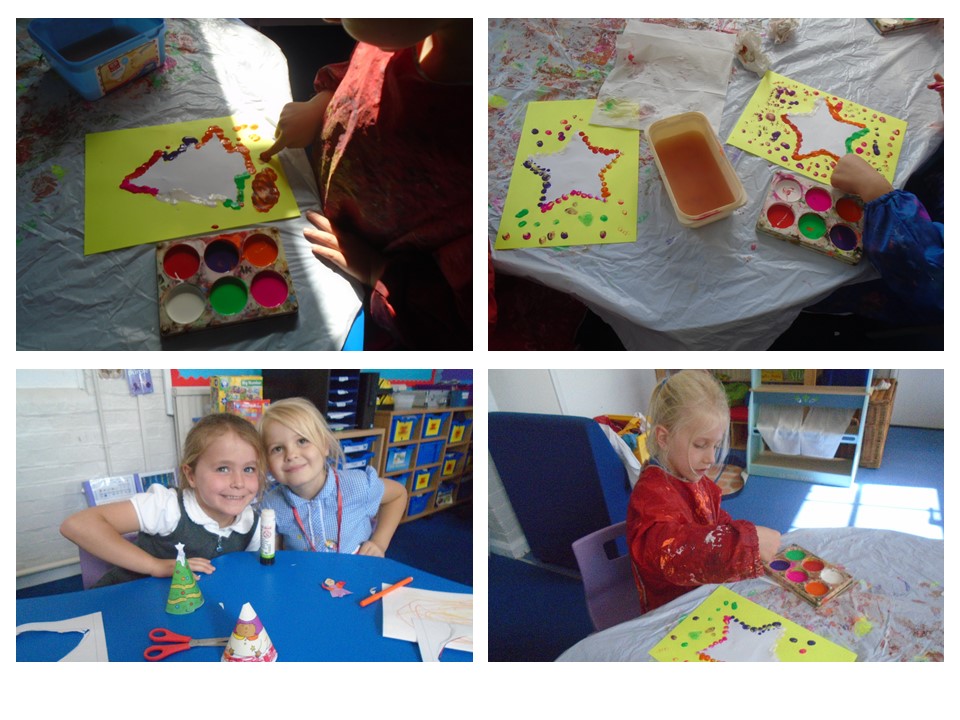
No, that wasn't a mistake in the heading! Despite it still being September, we've been fabulously festive in Year 1 this week by creating some eye-catching Christmas cards. With a backdrop of Christmas music to get us in the festive mood, the children finger-painted around stencils to create relief images of stars, reindeer and Christmas trees,
The children's Christmas cards will be coming home this week, giving you plenty of time to order cards, tags and other goodies featuring your child's design in time for Christmas. Click here for more details from the Cauliflower Cards website.
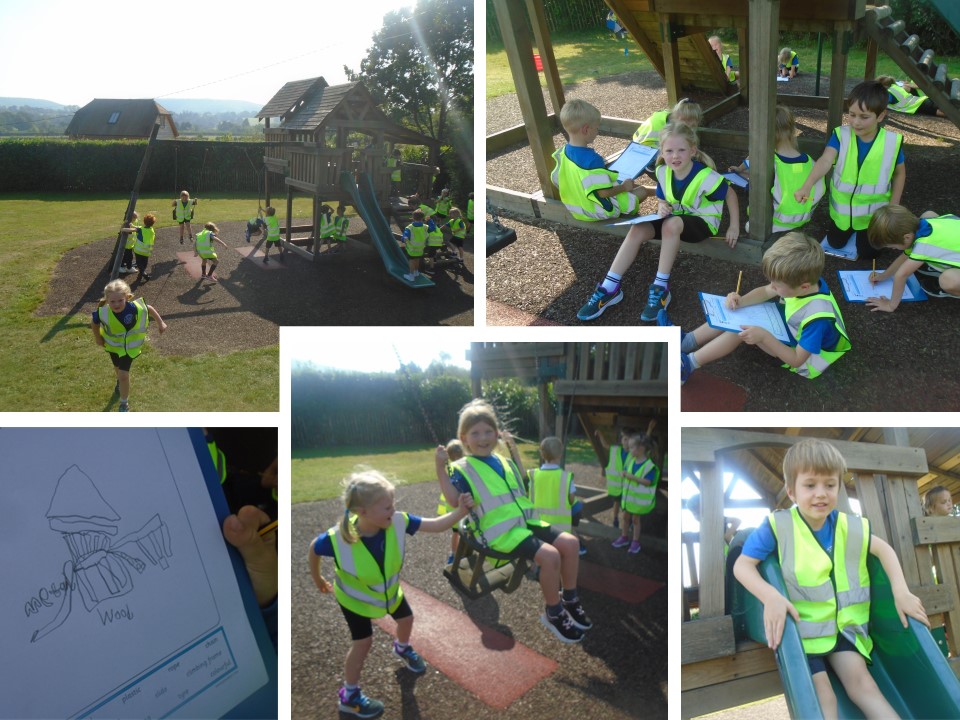
Our Design & Technology unit this term is all about playgrounds, so there was really only one thing we could do this week to kick it all off - go to the one next door!
The children were tasked with examining the play equipment to see how it was made, what types of shapes made sturdy structures and, to tie in with our Science, which materials had been chosen as the best ones for the job. Obviously, there was plenty of time for playing on the equipment as well!
Can your child tell you about their trip to the park? What was their favourite piece of equipment?
Week 2 - Super sorting, crazy crocodiles and amazing algorithms
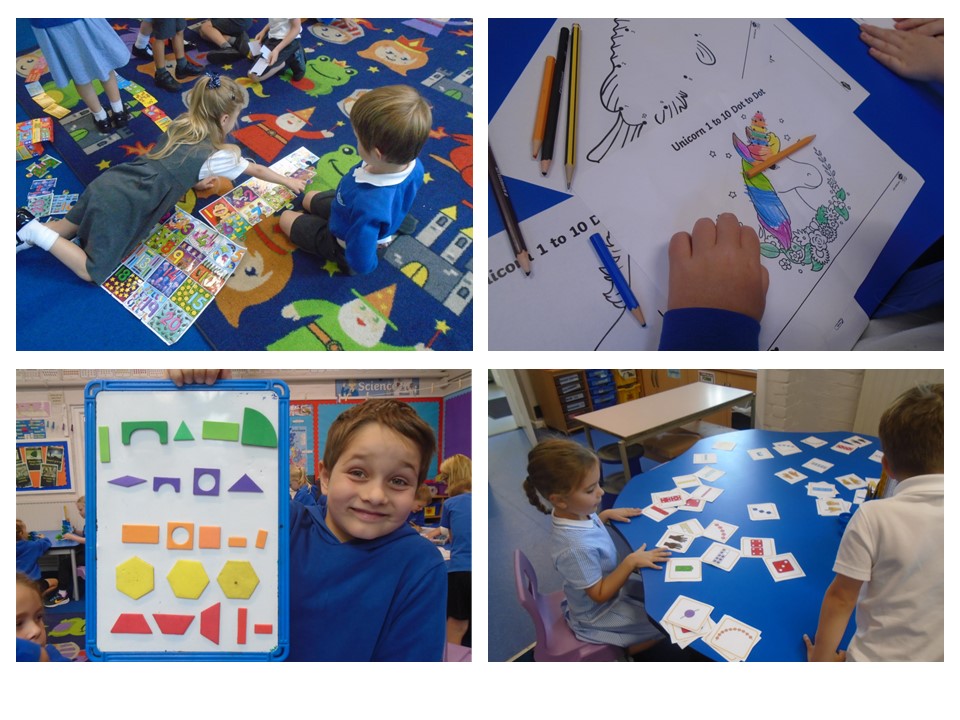 In Maths, we've begun our work on number and place value by sorting and counting groups of objects. We talked about the different ways we could sort objects (by shape or colour for instance) and the children then had a number of challenges to complete using different objects around the classroom.
In Maths, we've begun our work on number and place value by sorting and counting groups of objects. We talked about the different ways we could sort objects (by shape or colour for instance) and the children then had a number of challenges to complete using different objects around the classroom.
They've also been honing their number skills in other ways, from jigsaws and dot-to-dot puzzles to matching activities and cut-and-stick games.
Ask your child about their favourite maths activities this week?
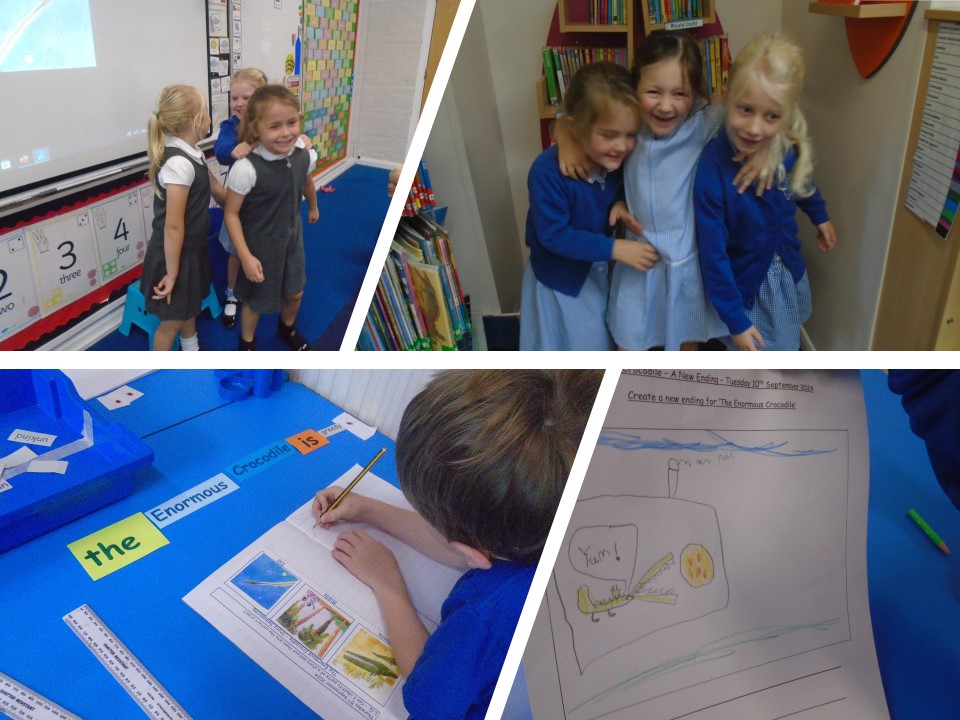 Our first English story this year has been 'The Enormous Crocodile'.
Our first English story this year has been 'The Enormous Crocodile'.
It's been a great jumping off point to get the children used to writing in their English books and they've done an amazing job of getting used to all Year 1 English routines. Not only have they used slips of paper to construct and write sentences, they also used drama and role-play to come up with a new ending for the story in which the eponymous crocodile - rather than being sizzled up like a sausage - is given a chance to change his ways and become a better crocodile.
Ask your child about their new ending for Roald Dahl's classic tale.
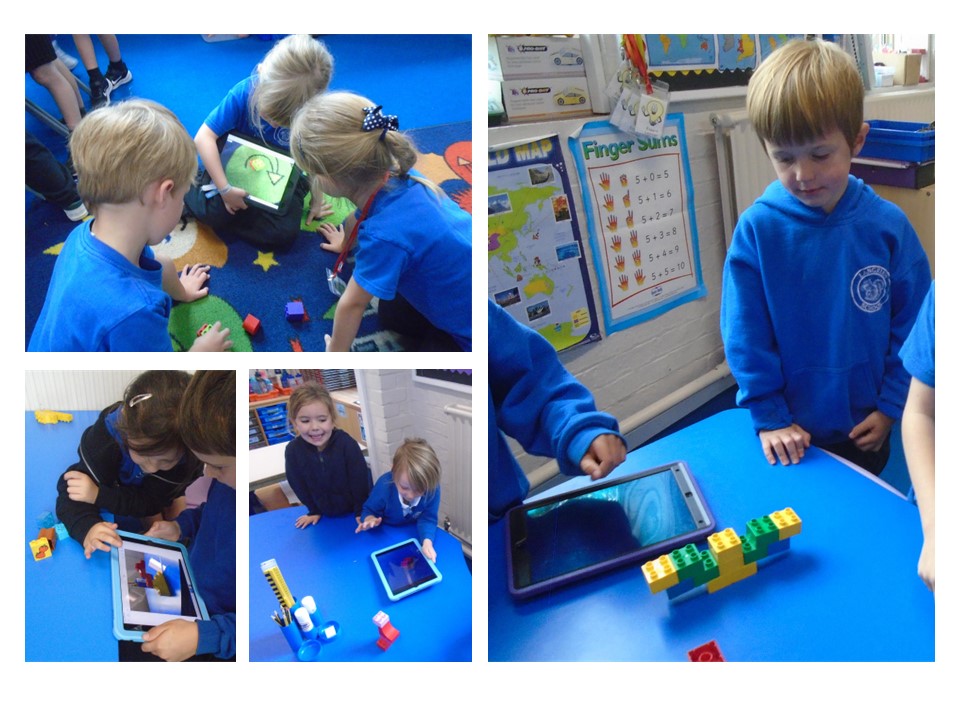
In Computing, the children programmed each other to create LEGO models this week.
Using only a few LEGO bricks, the children made a simple model, taking a clear photo at each step using the iPad. This created a picture algorithm, and they then challenged a friend to follow the algorithm - one step at a time in the correct sequence - in order to create the same LEGO model they had made. It was a great way of demonstrating what an algorithm is, and why it needs to include clear instructions in a specific sequence.
Maybe you could try this activity at home. Can your child create a picture algorithm for you to follow?
Week 1 - Welcome Back!
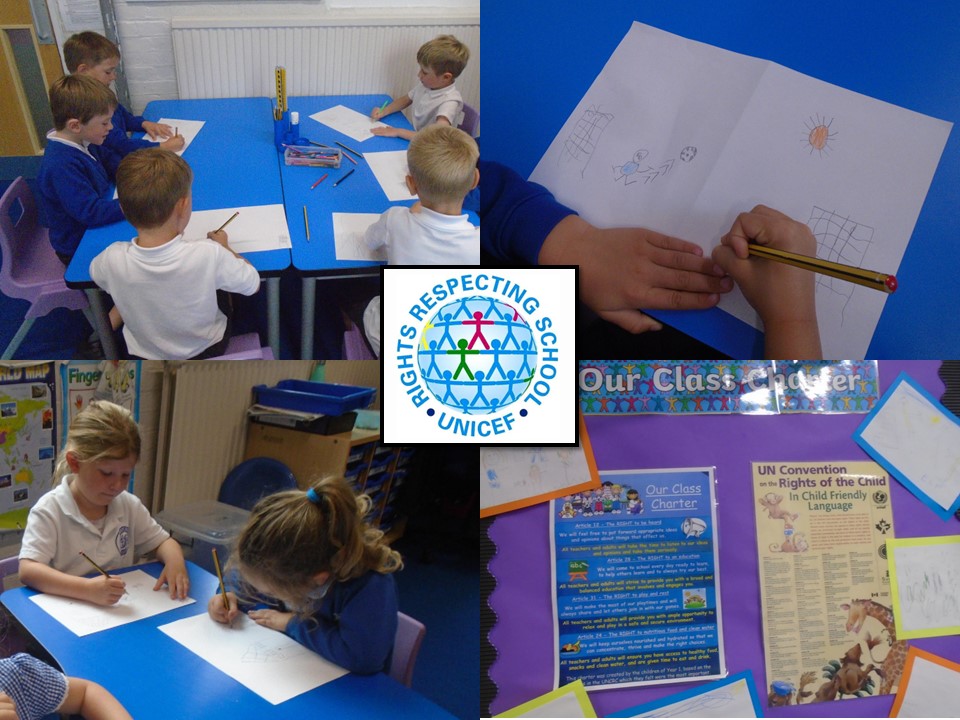
We've had a busy first week back! First, we created our Year 1 Class Charter based on the United Nations Convention on the Rights of the Child (UNCRC). After going through the Articles that were most appropriate for Year 1, the children chose the Rights they felt were most important to them and included them in our Class Charter.
These included the Right to be heard (Article 12), the Right to an education (Article 28), the Right to play and rest (Article 31), and the Right to nutritious food and clean water (Article 24).
Ask your child about the UNCRC. Which Rights did they think were most important, and which Right did they draw a picture to illustrate?
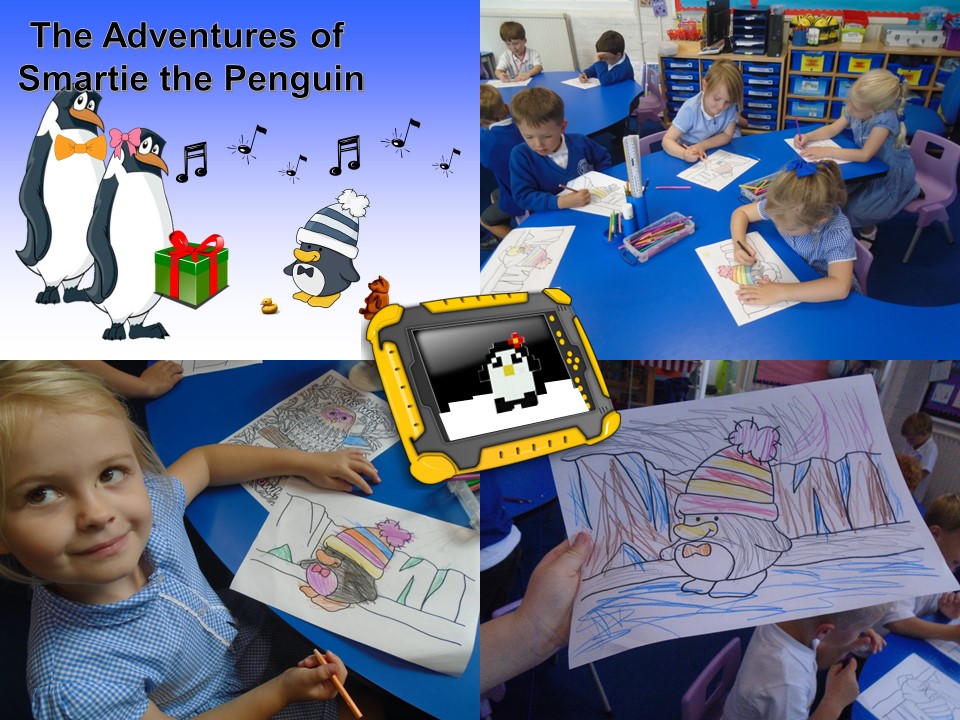
As this week was all about settling in and setting expectations for the coming year, that also included learning about how to keep ourselves safe online.
The children heard the story of Smartie the Penguin and we talked about what to do if we ever see something online that makes us feel sad, scared or worried. This message was backed up by a video featuring Jessie and Friends, and enabled us to create and sign our own Year 1 E-Safety Charter, which you can find alongside the Class Charter at the bottom of this page.
Can your child tell you how they can keep themselves safe online?
Phonics Word Wall
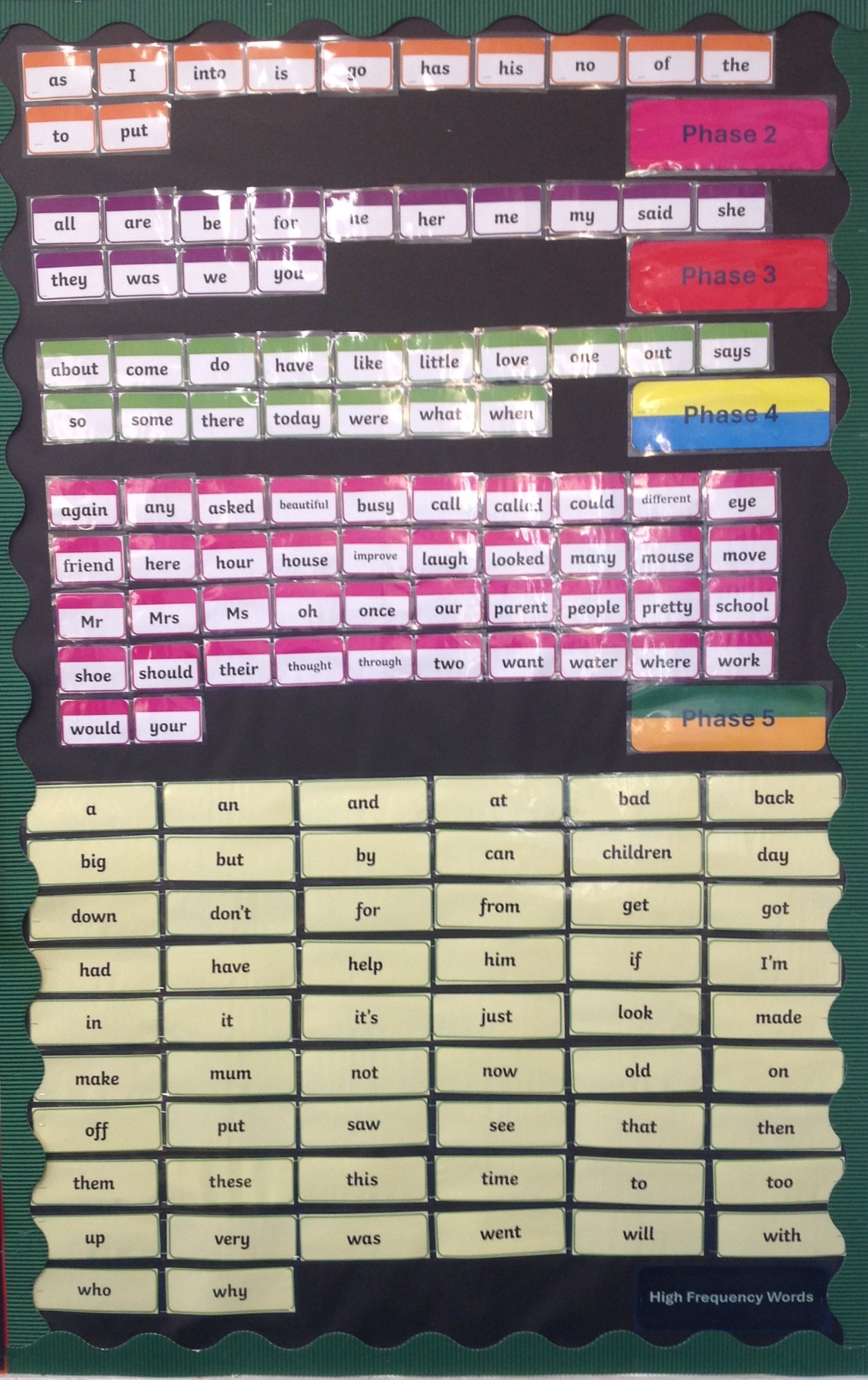
We go through all the words on our Word Wall every day as part of our Phonics lesson. The tricky words are organised and labelled to indicate which Phonics Phase and book bands the words will appear in (Pink, Red, Yellow/Blue, Green/Orange), mirroring the order in which the different Phonics sounds and phases are taught. The words in yellow at the bottom are the Year 1 and Year 2 High Frequency Words.
Age-related expectation is that children should be reading Orange books by the end of Year 1, and should therefore be able to read, recognise and understand all the words down to the bottom of the board when they appear in a text. They should also be able to start using them in their own writing, utilising the Word Wall in order to help them with their spellings.
You can watch a video of Mr Hancox guiding you through the Word Wall by clicking here.
Phonics Workshop
Thanks to everybody who was able to attend the Phonics Workshop this week. There was a lot of information to take in, so I've attached the slides to the bottom of this page with all the information about jargon-busting, Phonics phases, and next June's Phonics Screening Check.
Internet Safety and Parental Controls
There have been instances of children across a number of year groups discussing inappropriate Internet content they have viewed at home. Please ensure that your Internet-linked devices at home are suitably supervised and protected using the parental controls available. For advice on how to keep your child safe online, including the use of parental controls, click this link to the NSPCC website. If you'd like to know how to set up parental controls specific to gaming - limiting game time, in-game communication or setting spending limits for instance - click on this link to the EA Games website.
Extreme Reading Challenge
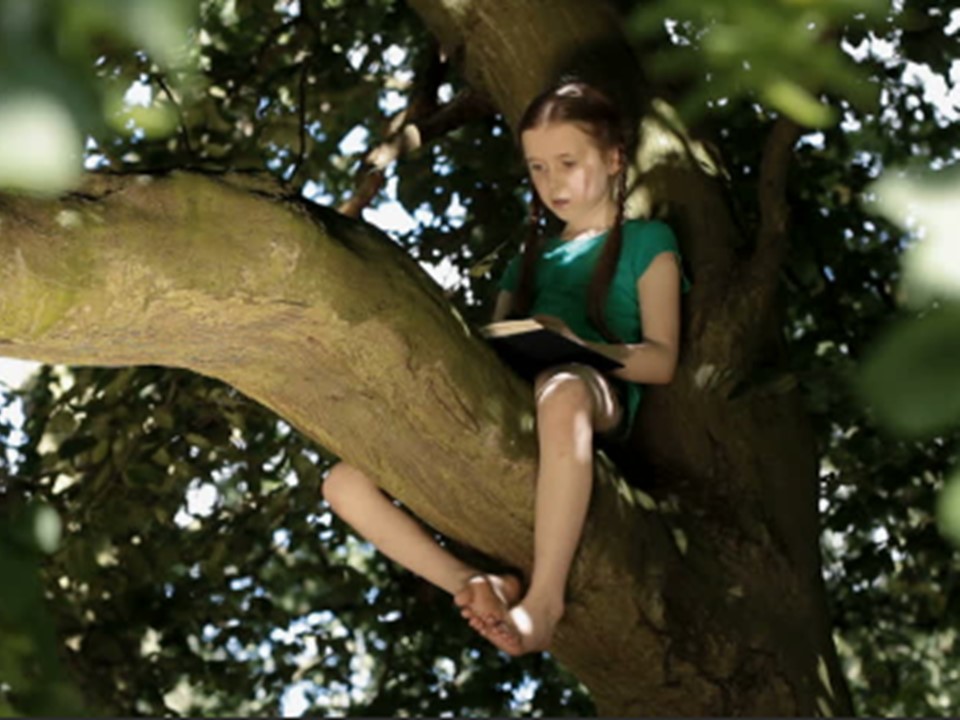 For our reading wall display, we want to prove that Langrish children love to read anywhere and everywhere!
For our reading wall display, we want to prove that Langrish children love to read anywhere and everywhere!
What's the most unusual place your child has read a book. Up a tree? In a hammock? On the beach? Bouncing on a trampoline? Email us a photograph of your child reading a book in an unusual place (nothing dangerous of course!) and we'll put it up in the 'Extreme Reading' display within our book corner.
I look forward to seeing the unusual places you've been reading your books!


